















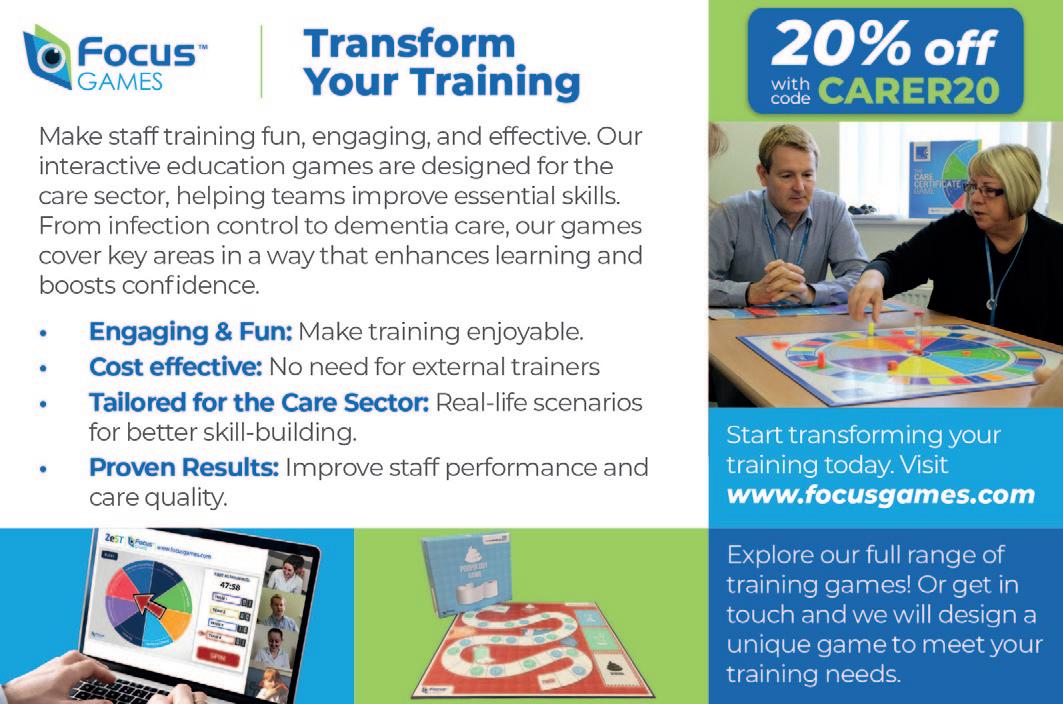
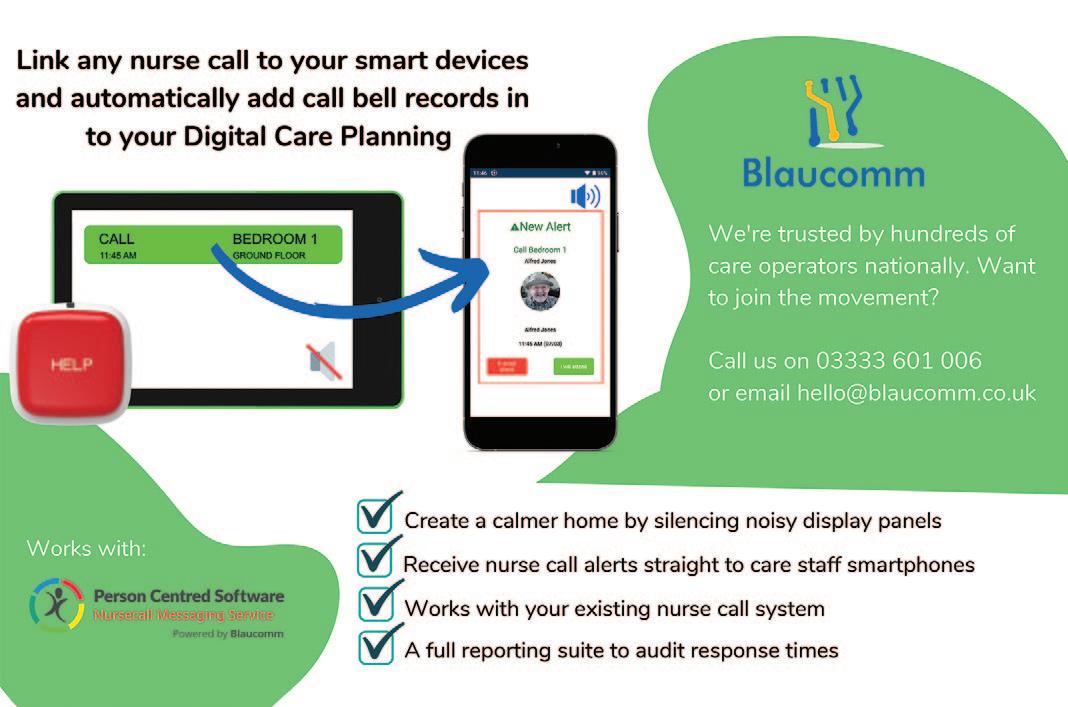
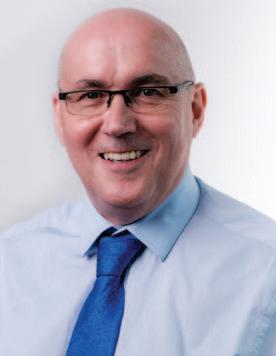
Editor Peter Adams
The calls for Chancellor Rachel Reeves to rethink her April National Insurance tax increases and exempt the care sector are growing louder by the day. And frankly, rightly so.
The sector has been raising alarm bells for months, if not years, about the unsustainable pressures it faces.
Yet, as these warnings mount, it seems the government remains resolutely tone-deaf. Nothing appears to dissuade the Chancellor from her agenda, but I firmly believe that this is set to change in the coming weeks.
We report on the care sector daily, and the warnings we see are not exaggerated complaints or mere “sour grapes.”
These are credible concerns, voiced by credible leaders and backed by solid research. The financial strain on residential and nursing care homes is immense, and piling on further tax burdens without exemption could have catastrophic consequences.
The phrase comes to mind: you can avoid reality, but you cannot avoid the consequences of reality.
A particularly interesting proposal has been put forward by not-for-profit energy consultancy Box Power CIC, an organisation that funds several hospices across the country. Their alternative funding mechanism would allow care providers to be exempt from these National Insurance increases—a solution that has received overwhelming support from sector leaders and operators.
Now, I won’t claim to be a financial expert; the complexities of their proposal are a tad above my pay grade. However, when respected organisations in the sector back a well-researched alternative, that’s good enough for me.
The care sector is crying out for sustainable financial solutions, and this is one that deserves serious consideration.
Unfortunately, so far, the Chancellor has given no indication that she will alter her course. But as the storm of resentment continues to build, I believe she will

soon have no choice. The sector cannot simply absorb yet another financial hit without severe repercussions—repercussions that will ultimately impact society’s most vulnerable.
On a separate note, I want to extend a big thank you to all the care homes that sent in their residents’ Valentine’s stories.
Once again, we are delighted to publish these heartwarming glimpses into the lives, histories, and achievements of those in your care. It’s a wonderful reminder of the vital work care homes do every day, fostering community and preserving the rich experiences of their residents. A special thank you as well to our production manager, Matt, who worked tirelessly to put together this beautiful tribute!
As always, we will continue to champion the voices of those in the sector. The battle for fairer treatment is far from over, and we will be here to report on it every step of the way.
I would also like to encourage our readers to sign up for our bi-weekly digital newsletter at www.thecareruk.com and follow us on social media for all the latest news.
Carer is published by RBC Publishing Ltd, 3 Carlton Mount, 2 Cranborne Road, Bournemouth, Dorset BH2 5BR.
I can always be contacted at editor@thecareruk.com

damage. Views expressed within this publication are not necessarily those of the publisher or the editorial team.
responsibility for any effects, errors or omissions therefrom. All rights reserved, reproduction is forbidden unless

(CONTINUED FROM FRONT COVER)
VITAL CARE
This will mean that many businesses, especially smaller ones, are at risk of failure, disrupting or ending vital care for thousands of older and disabled people.
Based on an approximation of the entire wage bill for the independent social care sector in 2025/26, to which the forthcoming changes to Employer National Insurance are applied, the analysis found that:
• The planned 1.2 percentage point increase to Employer National Insurance Contributions (ENICs) and the reduction of the earnings threshold for employer contributions from £9,100 to £5000 in 2025/26 will add in the region of £940 million more to the employer national insurance bill for independent (non-public sector) social care organisations, compared to the current regime.
• The 6.7% increase to the National Living Wage (the minimum wage for those aged 21 and over) will add an estimated £1.85bn to the total wage bill in 2024/25 compared to the current financial year, assuming as in previous years that all wages above the minimum also rise at a roughly similar rate to maintain differentials in earnings.
Taken together, these add an estimated £2.8bn of cost pressures to social care providers, the majority of which are small or medium-sized organisations with limited ability to absorb additional costs. With local authorities purchasing around 70% of care delivered by independent social care providers, councils would need to find an extra £2 billion if they are to increase the fees they pay to offset these higher costs – immediately consuming both the £600m extra funding allocated to social care (for both children and adults) at the Budget and the effects of an increased local government grant and changes to council tax rates (expected to yield around £2bn in total) for all council services.
ALTERNATIVE FUNDING
Not-for-profit energy consultancy Box Power CIC, which funds several hospices nationwide, are now urging the Chancellor to adopt their policy for an alternative funding mechanism which would allow care to be exempt from NI rises, as failure warnings from sector leaders and operators mount.
CEO Corin and COO Tricia Dalby’s policy would see banks keep 1% of their money deposited with the Bank of England in accounts that don’t earn interest. This change could save the UK government about £1.3 billion a year in interest payments (New Economics Foundation).
Box Power would see these savings ringfenced for the care sector, offsetting the costs of planned NI hikes set to come into effect this April.
SECTOR SUPPORT
Numerous care providers and leaders have already lent their support to the new funding plan. Figures include, Dr. Robert Kilgour, Mike Padgham, Tony Stein, Abbey Healthcare, Active Care Group, Aldingbourne Trust, Bloom Care, Borough Care, Cedar Care Homes, Coverage Care Services, Elizabeth Finn homes, Harbour Healthcare, Healthcare Management Solutionsm Independent Care Group, Lukka Homes, Maria Mallaband Care Group, Minster Care Group, Prime Life, Renaissance Care, Roseberry Healthcare, Royal Masonic Benevolent Institution, Salutem Care and Education, St Martins Care, St Philips Care, Vida Healthcare, St Helena’s Hospice, Birmingham Hospice.
The Care Provider Alliance has found that without additional support, 1 in 5 care providers may shut their doors this year, while 77% will have to dip into their cash reserves just to get by.
IMMEDIATE RELIEF
Corin Dalby, CEO of Box Power CIC, says: “In light of the current funding crisis, we’re requesting the Chancellor Rachel Reeves adopt this policy to provide some immediate relief to the care sector. While NHS trusts have been protected from NI rises – their providers in social care and other facilities have been left to fend for themselves.”
Stephen Trowbridge MBE, First City Care Group, adds: “This is a direct attack on social care—and we will not stay silent. If the government refuses to explore this, they are actively choosing to let the care sector fail.”
Mark Lloyd, Managing Director of RMBI Care Company – which provides elderly residential and nursing care, said: “Now with an added NI increase, providers are being pushed over the edge. The government must act now.”
Box Power CEO Corin Dalby is urging the Chancellor to adopt their policy. Drawing inspiration from similar moves made the European Central Bank, the policy once replicated in the UK would generate enough government savings to exempt the entire care sector from NI rises without raising taxes or introducing spending cuts.
MPs including Andrew Griffith, the shadow business secretary, Sir Iain Duncan Smith, the former Tory leader, and Jeremy Corbyn, the former Labour leader, have also backed calls for the Chancellor to rethink her plans, supporting Box Power’s proposal.
Corin adds: “This policy isn’t about politics; it’s about people and a sector that’s on its knees. It’s only fair we ask banks to step up when they’re raking in record profits.”
Rachel Reeve’s recent pledges to reduce banking regulation and roll back protections have only continued to fuel concerns. The Chancellor’s removal of “overcooked” regulations like banker fee deferrals, reductions in the City’s reporting burden, and delays to Basel 3.1 has signalled an approval from HMT for big banks to increase their risk taking.
Box Power’s backers such as Mark Jarman-Howe, Chief Executive of St Helena Hospice, has described the situation as dire: “Hospices are being crippled by rising employment costs. This is a travesty, we need a long-term funding solution, but in the short term, this policy could provide the immediate relief we so desperately need.”
The simplicity of Box Power’s policy to exempt care providers from planned NI increases means it could be implemented tomorrow – with the Chancellor not even requiring a vote in the Commons.
A Treasury spokesman said: “We have made the biggest investment in a generation for hospices, delivering £100m of funding to help them this year and next to provide the best end of life care to patients and their families.
“More than half of employers will either see a cut or no change in their national insurance bills, and there will be £22.6bn more for the NHS and workers’ payslips will be protected from higher tax.”


If it’s true that we learn from our mistakes, why is fire a lesson we must relearn, time and again? We know more than ever about causes of fire, how it spreads and how it destroys. Is fire preventable, or an inevitable fact of life?
Fire legislation certainly seems inevitable, especially in the wake of tragic events. Whether it’s the Great Fire of London, the Triangle Shirtwaist Factory or Grenfell Tower, it seems to take catastrophic failure of fire safety management to set legal change in motion.
When governments set a trend of acting after the fact, it’s predictable that businesses and employers follow. Predictable, however, is not the same as acceptable.
UK’S POOR RECORD
Last year, UK Fire and Rescue services carried out nearly 50,000 fire safety audits. Only 58% had a ‘satisfactory’ outcome, meaning no failures were found. This is the lowest in 13 years. Care homes had the third highest proportion of ‘unsatisfactory’ audits at 46%. This is hardly surprising, given the challenges care settings face that few other workplaces even consider.
ESCAPE PLAN
Occupants of most businesses can hear and respond to a fire alarm. Most can evacuate unaided, so an employer’s main responsibility is to inform on procedure and provide training on escape routes, assembly points, etc.
Care settings don’t have this luxury. Many service users live with chronic health conditions or disabilities, meaning they may struggle to respond to a fire alarm, or evacuate unaided.
Safety law puts a duty on employers to manage foreseeable risks. When primary care involves helping service users manage lack of mobility, partial hearing or deafness, and mental health conditions, that doesn’t leave a lot of room for doubt. These vulnerabilities are clearly a foreseeable risk in an emergency. THE CONSEQUENCES OF FIRE
One Lancashire care provider’s failure to manage foreseeable risks had terrible consequences in 2019.
By Gavin Scarr-Hall, Director of Health & Safety at Peninsula
Arson killed one resident and left another hospitalised for two weeks with smoke inhalation. Investigators uncovered faults with the facility’s escape routes, fire alarm system, safety management and fire risk assessment.
The care provider admitted failure to take general fire safety precautions to ensure staff and residents’ safety, and failure to make a suitable, sufficient fire risk assessment. The judge fined them £135,000 and ordered them to make urgent amendments, totalling £18,705.
Another fire in 2017 at Newgrange Care Home killed two residents, who were trapped in their room. There were no sprinklers and poor compartmentation, so the fire spread quickly. The coroner raised this concern to the Secretary of State, saying “action should be taken to prevent future deaths”. Were these fires inevitable or could these care homes have taken steps to prevent death, illness and loss of reputation?
PROPORTIONATE MEASURES
To answer this, we have to compare current fire safety legislation to what came before. Until 2005, fire safety was covered by no less than 80 Acts of Parliament. Employers were expected to understand which applied to each workplace, and comply with proscribed guides and codes, whether they fit working practices or not.
Today, the Regulatory Reform (Fire Safety) Order 2005 is founded on the concept of risk assessment. A named ‘Responsible Person’ carries out or arranges for a fire risk assessment of their premises. They decide which controls are proportionate to the risks present.
Whilst change can be slow, it does happen. From 2 March 2025, sprinklers will become mandatory for all new care homes, irrespective of height. If a sprinkler system had been in place could two residents at Newgrange still be alive? This new law makes it crystal clear: prevention is key.
WHAT DOES A FIRE RISK ASSESSMENT ENTAIL?
The law calls for a ‘competent person’ to carry out the assessment – someone with the knowledge, experience and qualifications to identify fire risks and suggest practical control measures.
A fire risk assessment takes conditions, dimensions, and the practicalities of how a building operates into account. Fire risk assessments fail when an assessor makes assumptions about how people will escape. Make no assumptions. Take nothing for granted. Ask questions and seek advice; there’s no shame in admitting you don’t know something. Fires are preventable. We don’t have to wait until one happens to learn what doesn’t work.
Signature Senior Lifestyle has announced an exciting new partnership with BRACE, a dementia research charity.
The collaboration will see Signature commit to raising £25,000 in 2025 to fund a dedicated Dementia Research Nurse, helping to advance crucial research into dementia diagnosis, and treatment.
With almost one million people in the UK living with dementia, research into early diagnosis, prevention, and treatment has never been more vital. BRACE, which has been funding pioneering dementia research for over 30 years, supports projects across leading institutions in England and Wales.
This new partnership marks the first time BRACE has collaborated with a care home provider, highlighting the shared commitment of both organisations to improving the quality of life for people living with dementia, both now and in the future, support for research, care and awareness.
Vishul Seewoolall, Chief Operating Officer of Signature Senior Lifestyle, commented: “Dementia is a condition close to the heart of so many of our residents, their families, and our team members. At Signature, we are dedicated to providing the highest quality of care and support for those living with dementia, and we recognise the urgent need for more research into this condition.
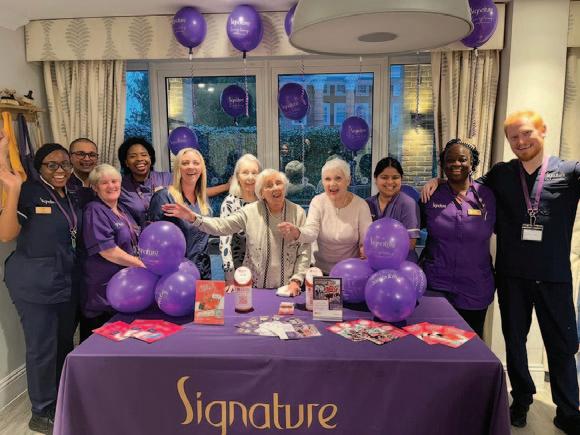
We are proud to be partnering with BRACE to champion their incredible mission, directly contribute to advancing dementia research, and further educate and support our communities.”
The £25,000 raised by Signature’s care homes will go towards funding a Dementia Research Nurse, who will play a critical role in supporting ongoing studies at the Bristol Brain Centre. BRACE’s work focuses on education, earlier diagnosis, new treatments, and ultimately, finding a cure for dementia.
Chris Williams, Chief Executive of BRACE, welcomed the partnership, saying: “Dementia will affect one in two people in their lifetime, and that will not change until we have more and more research taking place. Signature’s support for BRACE and the Dementia Research Nurse will play an invaluable role in supporting research that will take us one step closer to improved treatments and improved diagnosis for people living with this incurable condition.”
Each of Signature’s care homes will host exciting fundraising activities, ranging from bake sales and charity events to educational talks and dementia cafés, designed to engage residents, families, and local communities.

Danforth Care Homes has announced the grand opening of Woodland Court Care Home in Great Yarmouth on Friday, 21st February 2025, from 11 am to 4 pm, bringing together VIP guests, local dignitaries, and members of the community to celebrate the launch of this new care home.
The event will feature an exciting schedule of activities, speeches, and entertainment.
From 11:00 am to 12:30 pm, the day will begin with a special visit from Jessica-Jane Applegate MBE, Paralympic World and European Champion swimmer. She will tour the home, give a speech, take part in a Q&A session, and
the dedicated team.
At 1:30 pm, the official ribbon-cutting ceremony will take place. This will be led by Rupert Lowe, MP for Great Yarmouth, Lady Mayoress Paula Waters-Bunn, and Deputy Lord Lieutenant Michael Gurney.
Residents will play a key role in the cutting of the ribbon, followed by speeches and a commemorative plaque unveiling.
From 2:00 pm to 2:45 pm, live music will continue alongside further tours of the home, allowing guests to experience its warm and welcoming atmosphere. At 2:45 pm, celebrity chef Theo Michaels will make a special appearance.

The event will close with a final reception from 3:30 pm to 4:00 pm, providing guests with an
and
By 2028/29
Councils in England should be a major driver to boost local growth over the coming years but could face a funding gap of more than £8 billion by 2028/29 without adequate funding, new analysis by the Local Government Association has revealed.
In its submission to The Treasury ahead of the Spending Review, the LGA demonstrates how councils have a vital role to play in the Government’s reform and growth agenda but will only be able to deliver on this ambition if they are given the necessary financial headroom as Government makes decisions about the nation’s finances.
The LGA’s submission highlights the impact of not investing across the many critical council services that millions of people rely upon everyday such as looking after older and vulnerable adults, ensuring children gain access to vital SEND provision, providing home to school transport and much relied upon temporary accommodation.
Without urgent action in the upcoming Spending Review, not only will many councils be left with having to make impossible choices on what desperately needed services they can provide in the future, but the opportunity that this moment presents on boosting growth and reform may be missed.
This year sees the seventh one-year settlement in a row for councils. Over time this has severely hindered how councils can plan for services and deliver to their local communities. It is, therefore, encouraging that that government has now committed to provide councils with three-year settlements over this coming Spending Review period.
However, that promise still comes at a critical time for the future of local services with councils remaining under severe financial strain due to long-standing funding reductions and cost and demand pressures that will continue to rise at an alarming rate and threaten to push many towards the financial brink.
New costs associated with the employer National Insurance Contribution changes, which have not been fully compensated for by government, along-
side demographic change, inflation, and unfunded rises to the National Living Wage, are also exacerbating this challenge. IN ITS SUBMISSION THE LGA REVEALS THAT:
• If current cost and demand trends continue, by the end of 2028/29 cost and demand pressures would add £21.4 billion to the cost of delivering council services since 2024/25. This is 29.8 per cent in additional service costs.
• If these new pressures and funding streams are taken into account, councils would face a £1.9 billion gap in 2025/26 rising to £4.0 billion in 2026/27, £6.0 billion in 2027/28, and £8.4 billion in 2028/29.

• Last year 18 councils required Exceptional Financial Support (EFS) to set their 2024/25 budgets. Of those who responded to the LGA’s survey, 25 per cent of chief financial officers (CFOs) now say that their council had either applied for EFS to support their 2025/26 budget or that they expected to do so in 2025/26 or 2026/27. This is indicative of the growing financial emergency facing councils.
Cllr Louise Gittins, Chair of the Local Government Association, said: “Councils hold the key to public sector reform which is a clear ambition of government. As leaders of their communities and major local employers, they must play a critical role in promoting sustainable and inclusive growth.”
“We know that there are huge financial challenges ahead for government. However sufficiently funding councils in the Spending Review would enable them to fully play their part in leading local growth priorities and unlock the full potential of their local people, businesses and places.”
“Local government has made huge savings and efficiencies over the past decade and continues to innovate and transform services to get the best for residents and provide greater value for money. However, without adequate investment now we risk not being able to deliver crucial services that so many depend upon and our desire to help government fulfil its ambitions for the future are severely hindered.”





By Helen Burgess, employment partner at Gateley Legal
(https://gateleyplc.com/gateley-legal/)
The current version of the Employment Rights Bill (which is currently making its way through parliament and may still face further amendment) allows for the Secretary of State to create a new Adult Social Care Negotiating Body. Within the remit of this body would be matters relating to remuneration of workers and the terms and conditions of such workers. The body must contain both officials of one or more trade unions that represent the interests of social care workers and persons representing the interests of employers of social care workers.

The Trades Union Congress (TUC) cite common issues for these employees as including nonpayment of travel time, under-payment for work carried out, failure to pay sick pay and the widely documented exploitation of migrant care workers.
The welfare of such workers is imperative not only for the workers themselves but for the entirety of the UK when considering that the UK has an increasingly ageing population. In 2022, there were around 12.7 million people aged 65 or over in the UK, making up 19% of the population. According to the ONS's population projections, by 2072 this could rise to 22.1 million people, or 27% of the population. If the social care industry is unable to attract workers, the UK may be left without enough people to care for the elderly and vulnerable.
IMPLICATIONS
1. Better conditions
TUC analysis shows that more than three in five (61 per cent) social care workers and senior care workers earn less than the real living wage, and social care workers earn only around 65 per cent of the median salary for all employees. An Adult Social Care Negotiating Body could allow for employees and employers to come together to reach reasonable conclusions regarding pay and enable more employees to receive better wages.
2. Better retention
The social care industry suffers from a high turnover and

vacancy rate. In 2023/2024, the turnover rate was 24.8%, with the vacancy rate in England being 8.3%. Efforts to increase pay and conditions for social care workers could by extension decrease turnover rates.
3. Better care
If the social care industry can attract more highly trained quality staff by way of better pay and conditions, it tracks that those receiving care will have improved outcomes too. For example, staff will be able to provide more personalised attention and emotional support, as well as being able to ensure that fewer safety incidents occur.
One looming question is where the funding for such pay increases or better conditions, such as where payment for travel between client visits, will come from.
Social care services across local authorities nationwide continue to be negatively affected by government cuts, with the Local Government Association finding that almost four in five authorities (79%) stated in September and October 2024 that services for disabled or older adults were very or fairly likely to be negatively affected by savings in 2025-26.
Local authorities nationally also continue to request ‘exceptional financial support’ (EFS), which is a last resort, enabling them to sell assets and borrow to fund their expenditure, which is normally not possible for public bodies.
If EFS is unable to help, costs may be passed on to individuals by way of increased council tax bills. Those self-funding their care (those with less than £23,250 in savings) and their families may also face increased costs to fund the increased pay for employees. Currently, the average weekly cost of residential care if you are a self-funder is £1,160, while the average nursing home cost if you are funding your own care is £1,410 per week across the UK. Overall, how much impact the negotiating body will have and how any associated change will be funded is, at present, unknown. However, it is clear, that without decisive action the social care crisis in the UK will likely continue, and potentially worsen, for years to come.
Chiltern Water & Environment was established in 1991 by Robert Hunt after gaining 25 years' experience as an operational and analytical scientist in the water supply industry. The company gained engineering and further management knowledge when David Hunt joined in 2012. Since then, other water industry professionals have added to the breadth of knowledge and experience within the company.

We have always provided high-quality consultancy, testing and remedial services in a professional but personable manner. Our steady growth has reflected our clients' trust in our services. Our current clients include large housing associations, pharmaceutical companies and facilities management companies, as well as individual landlords and small businesses. We ensure all our customers receive the same level of care and attention to detail.
Duty Holders of all commercial and public building premises are legally required to assess the risk from legionella to anyone using the water systems and put in place legionella control measures if required. The HSE has produced ACoP L8 and HSG274 as guidance for Duty Holders obligations. We have clients throughout the South East, London and the Midlands, and carry out water tests nationally and internationally. We currently provide regular water sampling and testing for over 500 sites. Tel: 01844 347678
Email: info@chilternwater.co.uk www.chilternwater.co.uk
According to research published by national charity Dementia Carers Count, over three quarters of dementia carers do not have any contingency plans in place for when they are unable to care.
The charity surveyed over 1,200 dementia carers about their experiences of caring. The findings show that most unpaid dementia carers are family members looking after a spouse or partner (47%) or a parent (45%). Over half (52%) are caring without any support and many have their own health issues. Over a quarter (28%) of respondents consider themselves to be disabled.
Many feel anxious about the future. A third can see a time ahead when their physical health will impact their ability to care and a third are looking at a future when their mental health will prevent them from being able to continue caring. Some are even prevented from accessing the healthcare they need, because they have no one to look after their loved one.

Lisa* said: “I was urgently referred for surgery, but I found it impossible to synchronise alternative care arrangements for my husband who has mixed dementia and Alzheimer’s and cannot be left on his own. In
the end, I gave up and asked to come off the treatment list. You ask yourself – is it worth the hassle? If the answer is ‘no’ then there is something very wrong with the system.”
Frances Lawrence, CEO, Dementia Carers Count said: “We continue to rely on family carers to look after a growing number of people living with dementia. What happens when they can’t care?
“Carers like Lisa should not be caring at the expense of their own health or worrying about the future if they aren’t there to care.
“If there’s a crisis, decisions can be made that might not be right for the person with dementia who suddenly needs alternative care.
“This has to change. We have recommendations about how government, local authorities, health and care commissioners and health and social care professionals can help dementia carers consider and agree alternative care arrangements. Having contingency plans agreed in advance and shared should help health and social care systems plan for what is needed in different localities across the UK.”
Four dedicated colleagues at St Helens Hall Care Home in St Helens, part of Sandstone Care, are each celebrating 15 years of service, marking a milestone of commitment and care for residents. Beverley Hitchmough, 58, began her journey as a senior carer on nights and is now a unit lead. Reflecting on her role, she said, “The best part of my job is the satisfaction I get when the day goes well, and the residents in my care are happy, settled, and well looked after. They make my day—we have fun when on shift.”
Dawn Woods, a carer, treasures the moments spent with residents, listening to stories about their younger days and helping them with personal care. “Just spending a bit of one-to-one time, whether it’s washing and drying their hair or picking their favourite jumper, makes such a difference.
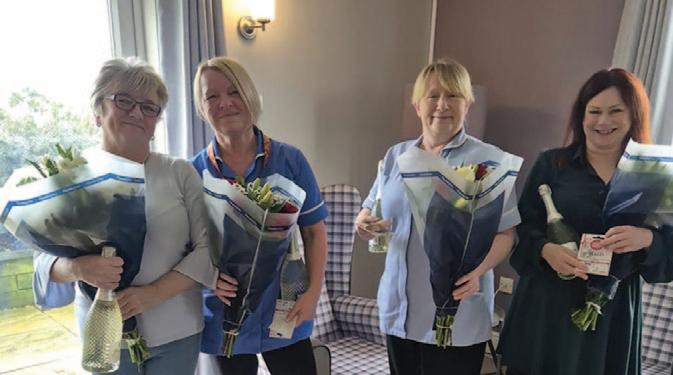
Seeing them smile makes my job so satisfying,” she said. Dawn also cherishes the camaraderie with her colleagues, often breaking into song in the dining room or sharing laughter with residents in the lounge. Outside of work, she enjoys meeting up with colleagues, whom she

now considers family, and most of all, being a proud Nanny to her granddaughter, Freya Daisy.
Rhonda Marie Bryers, 53, has been the home’s cook since January 2010. Passionate about providing homemade, nutritious meals for residents, she said, “Hearing how much they enjoy their food is the best part of my job. We have a great team here, and I look forward to coming to work every day.” Outside of work, she loves spending time with family and friends.
Annmarie Price has been a housekeeper at St Helens Hall since January 2009, ensuring that the home remains a comfortable and welcoming place for residents. Her dedication has been an essential part of the team’s ongoing commitment to high-quality care.
Amanda Clark, home manager at St Helens Hall, praised the team’s dedication: “Their passion and commitment shine through every day, making a real difference to the lives of our residents. We’re incredibly grateful for their years of service and the warmth they bring to our home.”


• We specialise in the sale and purchase of quality used wheelchair accessible vehicles and ambulances.
• They can be bought as seen or refurbished and sign-written to your own requirements.
• Fully serviced, new mot & warranty
• Engineers inspection supplied if required.
• Free delivery service
•
•


By Gary Newbold, Vice President, Ruckus Networks and Cloud EMEA Sales at CommScope

For years, ensuring that elderly people can connect with the outside world has been a significant concern. While much of this focus has been on individuals in their own homes, providing those in care homes with similar access is equally important. Despite having nurses and carers around them throughout the day, residents can still feel disconnected from their families, friends, and the world they once knew.
To residents, Wi-Fi is not just a convenience but a necessity. As the general population continues to integrate technology into every aspect of their lives, the elderly should not be left out.
THE DIGITAL DIVIDE IN SENIOR HOUSING
It might surprise you to learn that less than 50 percent of nursing homes and residential care centres offer Wi-Fi to their residents. Even when available, coverage is often incomplete, and speeds are limited. This astonishing figure highlights a significant gap in care. While medical care is rightly the primary focus, mental and social health are also crucial and can suffer if individuals feel disconnected from their loved ones.
The internet plays a crucial role beyond social connections. It keeps residents informed about the world and provides entertainment options that go beyond what is available at home. Strong Wi-Fi enables access to social platforms and online channels that aren't available through TV, radio, or print. Some of the most successful profiles on TikTok are run by people of pensionable age!
If it wasn’t clear before, the COVID-19 pandemic really underscored the importance of strong digital connectivity. With physical visits limited, video calls became the primary way to see and talk to loved ones. Additionally, the internet allowed seniors to shop online and manage personal affairs when they couldn't go out or rely on family members for help. Without internet access, it was—and is—easy for seniors to become isolated, missing out on the social interactions and information that enrich their lives. During COVID-19 and beyond, Wi-Fi significantly enhances the quality of life for residents in care homes, enabling them to stay connected and engaged.
BEYOND RESIDENTS: BENEFITS FOR STAFF AND MANAGEMENT
While the focus is often on residents, having a robust Wi-Fi network in care homes benefits staff and onsite teams as well. A strong Wi-Fi connection allows employees to use more sophisticated and efficient digital systems, enhancing the efficiency of administrative tasks and home management. Greater efficiency in these areas allows staff more time to offer direct care and attention to residents.
As digital technologies grow in sophistication, the options available to care homes are expanding. For example, sensors that alert staff if a resident falls or leaves their room can be installed, as can automation systems that control lighting and thermostats, and even electronic locks and bracelets that enhance security and ease of access. All these technologies rely on IoT—the Internet of Things—which requires a strong internet connection to function reliably.
However, IT and IoT setups can pose significant risks if not properly handled. For instance, data privacy issues can occur as IoT devices collect vast amounts of data, including sensitive personal information. Additionally, the integration of IoT devices can lead to the creation of shadow networks that are difficult to manage and secure. These shadow networks arise when devices are added without proper oversight, increasing the risk of security vulnerabilities and performance issues.
To avoid these challenges, care homes should prioritise the adoption of secure IoT devices across their entire network and conduct regular assessments to ensure optimal performance and security. Proactive management is essential to ensure that IoT technologies enhance the well-being of both residents and staff without compromising reliability or safety.
Despite the clear benefits, Wi-Fi remains an issue in many care homes. The gap between the need and the reality is out of balance. This may be due to the historical lack of emphasis on digital connectivity for older generations. Facilities often use outdated networking equipment that can't handle modern demands, or they are filled with walls and obstacles that cause signal drops. These issues can only be solved by upgrading outdated solutions; otherwise, as the number of technologies that rely on the internet increases, the problem will only worsen.
High-performing and reliable networks are crucial for residents to access essential digital solutions such as panic buttons, telemedicine services and remote health monitoring, which support their safety and wellbeing. The increased network traffic generated by IoT devices in care homes underscores the importance of robust infrastructure to ensure seamless and uninterrupted operation.
As our population ages, the demand for reliable and comprehensive Wi-Fi in care homes will undoubtedly grow. Today's older generation is more tech-savvy and rightly expects to remain connected to the outside world. Care homes must invest in scalable, sustainable solutions that incorporate the latest technologies, such as Wi-Fi 6, AI, and IoT.
By prioritising digital infrastructure, care homes can ensure that their residents enjoy a higher quality of life, remain socially connected, and maintain their independence. The future of senior care lies in embracing technology and bridging the digital divide.
To heal the digital divide, budget handlers need to recognise the importance of digital infrastructure in care homes. There are multiple ways to fund digital initiatives, for instance, government funding can be used to upgrade outdated systems. Alternatively public-private partnerships can be leant on to drive forward change, and in doing so, combine resources and expertise for realistic and reliable solutions.
In conclusion, the importance of reliable Wi-Fi in care homes cannot be overstated. It is a vital component of modern senior care, ensuring that residents remain connected, informed, and engaged. By addressing the digital divide, investing in robust digital infrastructure, and providing ongoing training and support, we can create a more inclusive and supportive environment for our elderly population.
As we move forward, it is crucial to recognize that connectivity is not a luxury but a necessity in today's world. By embracing this, care homes can significantly improve the quality of life for their residents, making them feel more connected to their loved ones and the world around them. The future of senior care lies in our ability to adapt and integrate technology into every aspect of care, ensuring that no one is left behind in the digital age.
A resident at an Altrincham home celebrated her 102nd birthday and credits her fitness as a secret to a long life.
Joyce Wilson lives at MHA Handsworth and celebrated her 102nd birthday with a birthday party.
The home decked out one of the lounges with balloons banners and prepared a birthday cake for her and everyone else to enjoy.
Joyce has been living at the home for just over two years and spent several years living in Timperley.
Joyce enjoyed walking and joined a walking group as well as playing various sports including hockey at a county level for Lancashire.
Social Care TV continue to fly the flag for highest quality online training for Health and Social Care, after unwavering commitment to excellence within the sector for over 25 years.
Their widely-used health and social care specific courses - produced and edited in-house - are expertly designed to make learning engaging, informative and, therefore, highly effective for learners.
Accredited by CPD and endorsed by Skills for Care, training with Social Care TV is quality assured, comprehensive and relevant.
As one of the leading online training providers in the health and social care sector in the UK, they supply training for local authorities, recruitment agencies, care home groups and other health and social care organisations.
Their feature-rich Manager platform has further been enhanced this year with the introduction of several new Manager tools designed to aid with compliance, reporting and trainee management. Features now available include:
• Compliance Dashboard with Traffic Light System
• Downloadable Trainee Matrix
Charlotte Fowke, activity coordinator said: “Joyce had a great time celebrating her birthday. All the staff and residents sang happy birthday to her and she received a number of cards and flowers.”
“I helped her to open her presents and cards and described to her what each one was, as her eyesight is not the best. She was very happy with what was arranged for her and had a huge smile on her face.
“I asked her what the secret to her long life was, and she told me staying fit has helped her.
We all had a great time celebrating Joyce’s birthday and feel very privileged to have been a part of it.”
• Custom Bundles
• Trainee Groups
• Bulk Uploads
• Bulk Enrolment Onto Custom Bundles
• Course Enrolment Notifications
• Course Reminders

SCTV regularly release new and updated high-quality courses. Previews for all courses can be viewed at: Courses - Social Care TV (www.social-care.tv/courses/course-details)
To enhance their learners' experience further they have created free, comprehensive subject-specific workbooks which were rolled out across all courses this year. This unique addition provides excellent value and a fully robust training package.
SCTV are delighted to have won several awards over the last 12 months including:
– Global
• Best Online Health and Social Care Learning Platform’
Health & Pharma Social Care Awards 2024
• ‘CPD Provider of the Year’ – The CPD Awards
• Social Care Training Provider of the Year’ - Corporate Livewire
Innovation & Excellence Awards
Gold standard customer service remains a core staple of the business, with expert support and guidance provided via telephone, email and live chat. They place great importance on the training and development of their customer services team to ensure that they continue

to provide a personal, friendly and knowledgeable service.
Their much-loved ‘Care Worker of the Month’ award recognises and rewards the selfless dedication shown by care workers across the UK and they proudly support the Care Workers Charity who aim to advance the financial, professional and mental wellbeing of social care workers.
SCTV believe that high quality training should be accessible to all and offer regular, free courses which include a digital certificate accessible via their website.
The company stands behind a clear mission and set of values which define their ethos and their dedication to both the Care Sector and those within it. These can be viewed at: Mission Statement and Core Values - Social Care TV
(www.social-care.tv/about/mission-statement-and-core-values)
Social Care TV are a responsible business, committed to ensuring that their actions have a positive impact on their employees, customers, the wider health and social care community and the environment.
Above all, SCTV consistently strive to make a meaningful contribution to the wellbeing of those being cared for.
For more information please see: Homepage - Social Care TV (www.social-care.tv) and see advert on the facing page.
Letters arriving after appointments, not being kept updated about waiting times for treatment and chasing test results, are all commonplace issues impacting large numbers of patients, finds new research from The King’s Fund, National Voices and Healthwatch England.
The organisations say poor admin also affects staff working in the NHS who can bear the brunt of people’s frustration when patients have been given incorrect information, they do not know who to contact while waiting for care, or their test results have gone astray.
Lost in the System: the need for better admin in the NHS shows that issues with admin are widespread and are worse for some people including those with long-term health conditions and people who are struggling financially. The report authors warn that issues with admin can not only be frustrating, but they can also risk some patients not receiving the care or diagnosis they need on time.
New public polling conducted by Ipsos[i] for the report reveals the scale of poor NHS admin. While half (52%) of the public felt the NHS is good at communicating with patients about things like appointments and test results, a quarter (25%) said it was poor, and those who had actually interacted with health services in the last year reported widespread issues.
Of those who had used the NHS in the last 12 months , either for themselves or someone they care for, nearly two in every three (64%) said they had experienced at least one issue with NHS admin or poor communication.
THE COMMON ISSUES EXPERIENCED INCLUDE:
32% of patients have had to chase results following test, scans or Xrays
• 32% of patients have not been kept updated on how long they have to wait for treatment or care
• 23% of patients don’t know who to contact while waiting for care
• 20% received an invitation to an appointment after the date of the appointment
Of those who have experienced at least one admin issue in the previous 12 months, 42% said they are less likely to seek care in the future due to their experience, and 47% reported it made them think the quality of care the NHS provides is poor.
Deeper analysis of the findings reveals that carers, patients with long-term health conditions, people from ethnic minority backgrounds and those struggling financially were all significantly more likely to experience issues with NHS admin and communication. The study found that 75% of patients with one or more long-term health condition had experienced an issue with NHS admin in the last year, compared to 57% of those with no long-term health conditions.
As well as making some patients less likely to seek care in the future the research shows that poor admin drives a perception of NHS waste. Of those who have experienced at least one problem over the last year with NHS Admin, 61% said that it made them think money was being
wasted, 56% said their time was being wasted and 55% felt that NHS staff time was being wasted.
Patients and carers told researchers from The King’s Fund, National Voices and Healthwatch how poor admin has led to stress, anxiety and deteriorating mental health. Many patients described being unable to cancel or reschedule appointments. One person described how they were automatically discharged from a service when they did not attend an appointment they had been unable to cancel. Another patient received a text confirming their appointment for the 99th January. Researchers also heard from a patient who is deaf and described how they are still called on the phone despite asking to be communicated with via text or email.
Julia Cream, a policy fellow at The King’s Fund and co-author of the report said: ‘The number of people affected by poor admin is stark. Today’s results lay bare the day-to-day dysfunction of an NHS that is too often not meeting people’s needs and highlights the deep inequalities people experience when they are trying to access and engage with health services. Behind these numbers are stories of people who are worried about their health and struggling to get through the NHS’s front door.
‘The government is trying to bring down waiting lists and improve access but these efforts will fail if the NHS cannot communicate effectively with people about when their appointment is or who they need to contact.
‘Poor admin drives up perceptions of an NHS that wastes money and staff time and puts people off seeking care. Admin matters and it’s time that admin, and the staff that deliver it, are recognised for the value they bring.’
Jacob Lant, Chief Executive of National Voices, said: “Admin plays a crucial role in how patients experience healthcare, yet our research shows many people find themselves in an admin doom loop, trapped by no-reply emails and unable to access the person or answers they need. This goes beyond inconvenience, often risking people’s quality of care.
‘The results of ineffective and inefficient admin are not felt equally across our society, and affect those already experiencing health inequalities more acutely. For people with multiple long-term conditions, the burden of managing admin is multiplied for each interaction with the system.’
‘NHS administration appears to be everyone’s job, but no one’s responsibility. The Government’s incoming 10 Year Health Plan provides a much-needed opportunity for NHS admin to be prioritised and for a commitment to be made to getting the basics right for everyone.’
Louise Ansari, National Director of Healthwatch England, said: ‘Admin issues within the NHS and their impacts on people have been in the shadows for too long. We’ve heard countless stories of people whose NHS letters arrived after the appointment day or were sent to
the wrong address while some had their referrals lost in the system.
‘Administrative errors are frustrating and can have serious implications for patient safety. If people miss their tests or scans, they will face a longer wait for their care, putting their health at risk.
‘Poor admin puts the onus on the patient or their families, who often have to sort out the problems that NHS systems have created, while at the same time struggling with the health condition they need treatment for. This places a particularly heavy burden on disabled people and those who have a sensory impairment.
‘Moving to a system that gets admin right and invests in admin staff development would have the potential to transform people’s experience of care, ensure equal access, and stop people getting lost in a system which is in desperate need of an overhaul.’
The King’s Fund, National Voices and Healthwatch England say they want the government and the NHS to focus on improving patient communication and admin, with the health service required to regularly report on patient experience of admin processes. They are also calling for admin to be prioritised in the upcoming government ten-year health plan expected later this year.
The three organisations recommend that NHS leaders and policymakers ensure there is adequate training and development for NHS admin staff and that patients are part of the design, delivery and testing of new admin approaches.
1,888 English adults aged 18-75 were asked (online) by Ipsos about how good or poor the NHS was at communicating on a range of things like appointments and test results. The research was carried out between 29 November – 1 December 2024. Quotas were set by age within gender, region and working status. Data are weighted by age within gender, region, working status, social grade and education to match the profile of the population.
Around half (52%) of the public think the NHS is good at communicating with patients about things like appointments and test results, whilst a quarter said it was poor. Moreover, 32% think the NHS is poor at keeping people informed about what is happening with their care and treatment, and 28% said it is poor at ensuring there is someone for patients to contact about their ongoing care.
Out of the 1,888 people polled, 1,622 adults had used a range of NHS services in the previous 12 months, either for themselves or someone they care for. 64% had experienced at least one of the issues asked about. Around one-third of NHS service users and their carers say they have had to chase for results, or have not been kept updated about how long they would have to wait for care or treatment
Of the 1,069 adults who had experienced at least one administrative issue in the last year for themselves personally, or someone they care for, 61% said it made them think NHS money was being wasted, more than half felt that their time was being wasted (56%) and more than half felt that staff time was being wasted (55%).


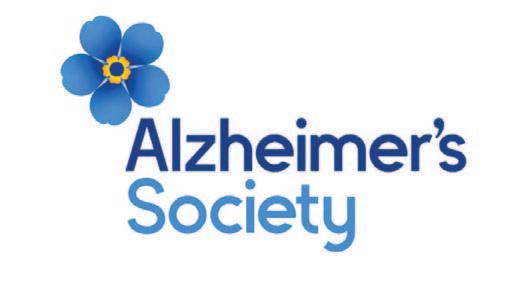
On Tuesday 18 March, Alzheimer’s Society will host an immersive showcase bringing together leaders in healthcare, innovation, and research to explore how new innovative solutions could address the challenges of hospital experiences faced by people living with dementia.
Taking place at the Royal Armouries in Leeds, the event will also unveil Alzheimer’s Society’s first ever Launchpad cohort – a group of entrepreneurs working with the charity as a springboard to test and validate their ideas.
Almost one in six hospital beds today are occupied by someone living with dementia[1]. They often face complex, fragmented care during hospitalisation, which can have severe consequences on their health and wellbeing.
To address this, Alzheimer’s Society hopes to inspire new and innovative solutions to address gaps in dementia care, focusing on how to better support people with dementia during their hospitalisation to improve overall health outcomes.
This thought-provoking event will include an immersive element bringing to life the challenge of hospitalisation for people with dementia.
It will also give attendees insight into the innovation providing help and hope across three Alzheimer’s Society workstreams: Launchpad, Accelerator Programme and the Dementia Innovators Programme, a collaboration between the NHS Clinical Entrepreneur Programme and Alzheimer’s Society.
Alzheimer’s Society is scanning the horizon to attract and develop the best entrepreneurs into dementia and work together with system leaders to solve the challenges of today.
The charity’s Launchpad programme is a bespoke four-month support package that helps people to assess the risk of their idea, validate it and pitch dementia innovation product ideas. Its Accelerator Programme offers up to £100,000 of investment along with business support from expert innovators to support people in developing and accelerating their new products and solutions to market, while the Dementia Innovators Programme is a one-year venture that gives successful participants access to mentors, skills and knowledge to develop innovations.
If you understand the challenges people with dementia face in hospital, and the urgent need for innovation to address these challenges, you’re invited to reserve a place at Alzheimer’s Society’s Dementia Innovation Showcase event taking place on the evening of 18 March 2025 at the Royal Armouries, Leeds.
To find out more, or to book your place, email Steven McFadyen, Alzheimer’s Society Senior Innovator: steven.mcfadyen@alzheimers.org.uk



With over 20 years of experience in health and social care, Kay Best has dedicated her career to making a positive difference in people’s lives. She joined Ablecare Homes in February 2021 and became the Registered Manager at Belvedere Lodge just a few months later, in May. For Kay, working in this sector has always been a passion, and she thrives on the challenges and rewards that come with it.
STARTING THE DAY
Kay’s mornings are a juggling act that any parent can relate to. “I start my day by getting my son ready and off to school by 8:50 a.m.,” she explains. As a mother of three, she’s mastered the art of organisation. “Being organised is key to successfully looking after children and working full-time,” she says, adding that Ablecare Homes’ accommodating nature has been a huge support in balancing her responsibilities at home and work. LIFE AT BELVEDERE LODGE
Once Kay arrives at Belvedere Lodge, her focus shifts to the care home’s 18 residents and her dedicated team. “My day consists of ensuring all residents and staff are happy,” she shares, highlighting that families and external professionals are also part of this dynamic. From managing daily operations and completing paperwork to attending meetings and undergoing training, Kay’s role is a blend of people-focused interac-
tion and behind-the-scenes work that keeps the home running smoothly.
THE REWARDS AND CHALLENGES
For Kay, the most rewarding aspect of her job is seeing residents receive the excellent care they deserve. “We maintain a good reputation as a successful residential care home, and that’s something I’m very proud of,” she says. However, the role is not without its challenges. “Meeting the demands of other professionals can be tough, but it’s all part of ensuring our residents receive the best possible care.”
One memory stands out as a testament to the dedication and compassion of Kay and her team. In 2024, Belvedere Lodge won an award for Most Improved Care Home—a moment that filled everyone with pride. But it’s a particular resident who left a lasting impression. “We took on a gentleman that several care homes had refused. He was difficult and challenging, but as a team, we didn’t give up,” Kay recalls. Thanks to their perseverance, the residents spent two years living at Belvedere Lodge, enjoying a high quality of life. “It reinforced our belief that everyone deserves good quality care,” she says.
If there’s one thing Kay wishes more people understood, it’s the all-encompassing nature of her role. “The work is 24/7—you can’t switch off,” she explains. Care workers must balance person-centred care with strict legal and regulatory requirements, often under immense pressure.
WINDING DOWN
After a full day at work, Kay’s focus shifts back to her family. “I go home to my three children, cook them dinner, and put my youngest to bed,” she says. Evenings are a time to restore order at home and prepare for the next day, before finally getting some well-earned rest.
This winter, Recreo VR is offering care homes an exciting opportunity to enhance resident wellbeing through the power of Virtual Reality (VR). By signing up for one of our 24-month Recreo Theatres packages, you’ll receive a free VR headset and staff training.
Our platform provides person-centred, budget-friendly activities that are fun, engaging, and accessible, especially for residents who are bedbound or socially isolated. Co-created with Alzheimer’s Society and individuals with dementia, our service empowers staff to deliver personalised reminiscence and one-to-one sessions that promote memory recall and connection.
Our VR headsets have been recognised as good practice by the Care Quality
Commission (CQC), further validating their impact on care. Regular use of Recreo VR has a proven positive effect on wellbeing, with residents reporting increased activity, engagement, and social connection, often leading to a reduction in the need for PRN medication.
Whether combating loneliness, promoting relaxation, or enhancing cognitive health, VR offers a non-pharmacological solution to enrich care and elevate quality of life. Don’t miss out! Take advantage of this exclusive offer and see how VR can transform your care home experience.
For more information, visit recreovr.co.uk. Or contact us at info@recreovr.co.uk or 01482 526940.
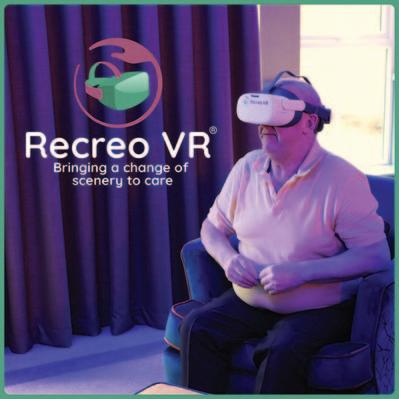
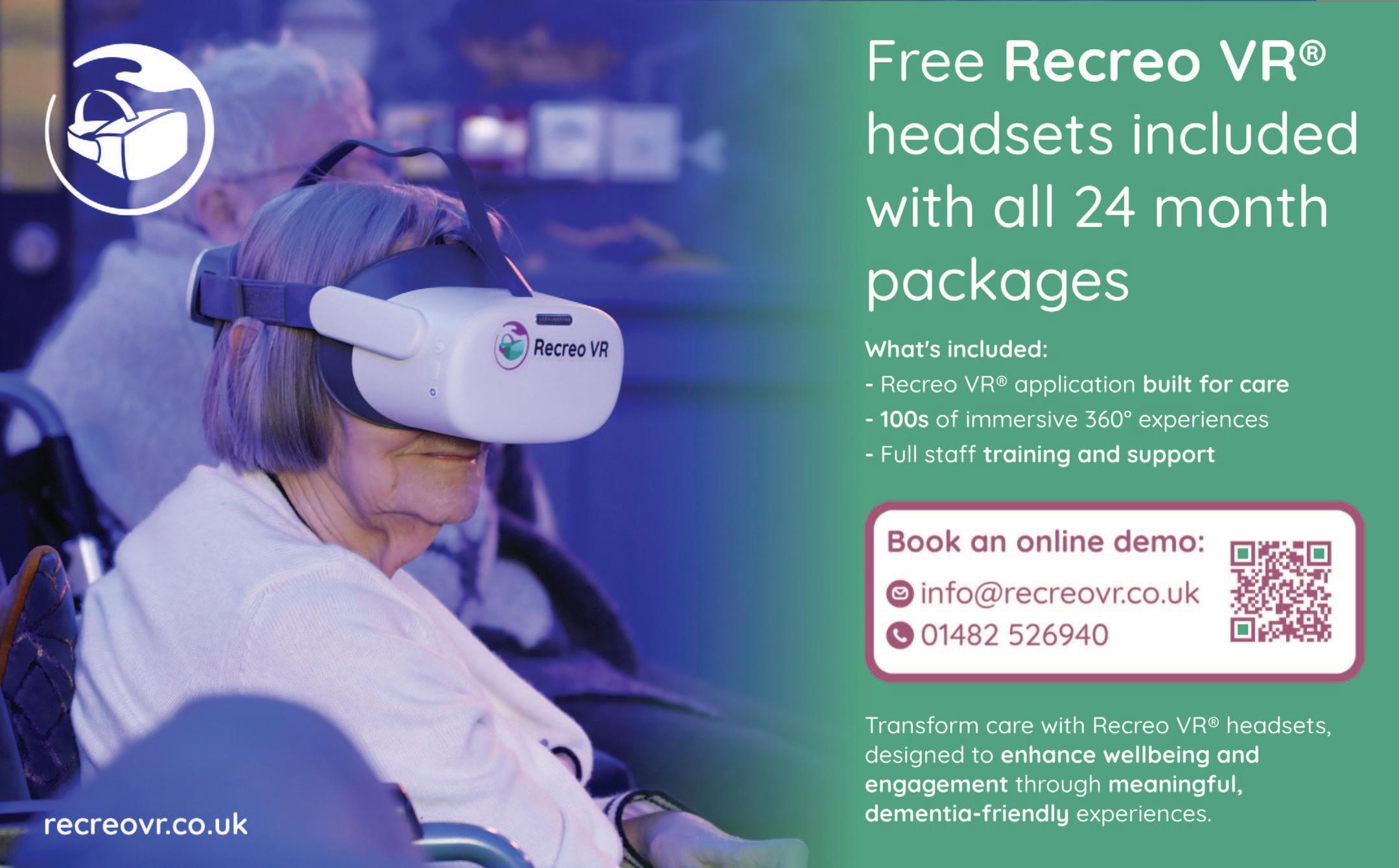
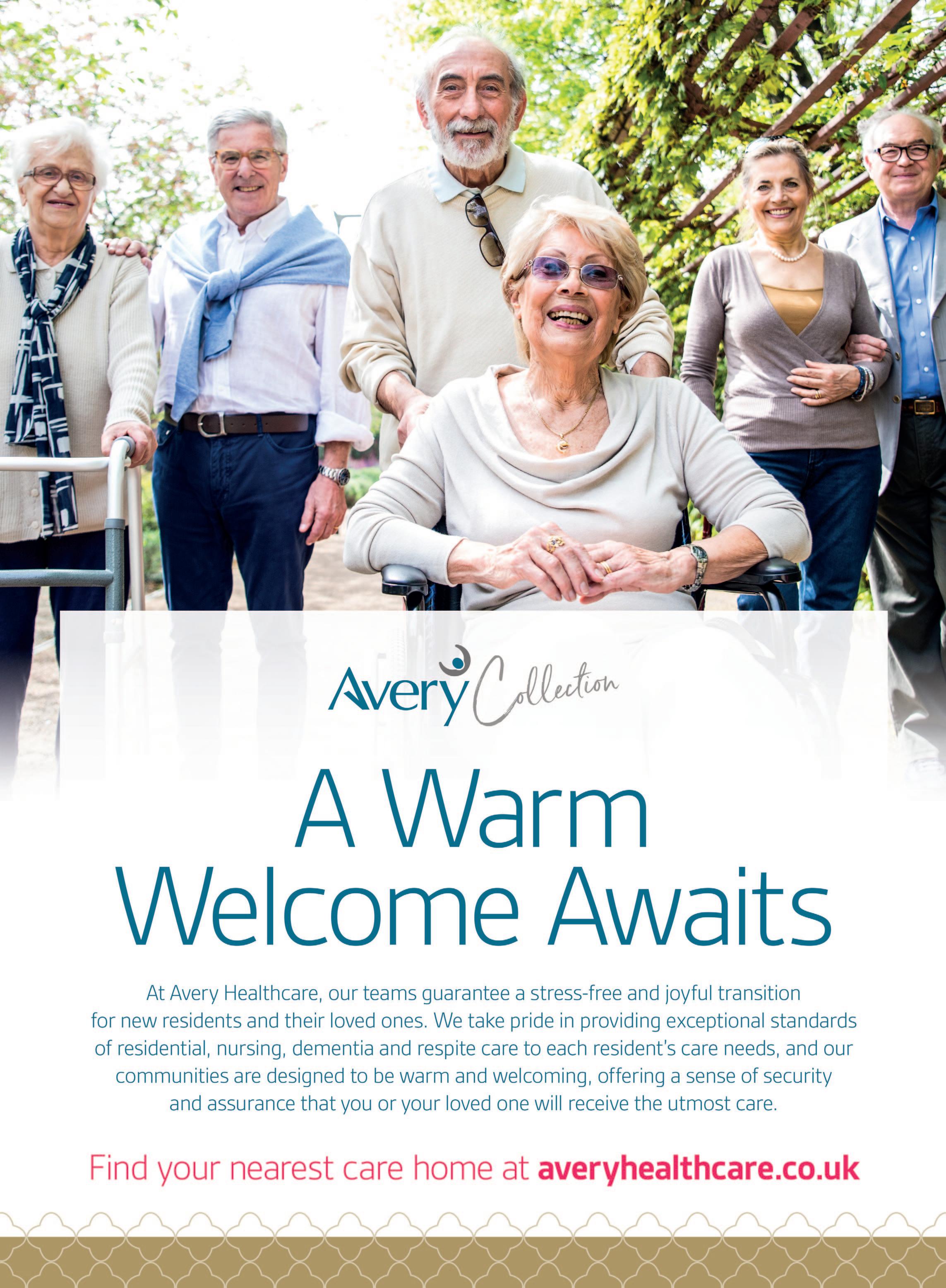
Kathryn Glass is the Veteran Friendly Framework (VFF) Lead. She heads a threeperson team, and her role is to guide care homes to successfully attain VFF status. The project is now 18 months old and has already had a huge impact on veterans across the UK. Here, Kathryn discusses why the VFF is so important, the benefits it brings to care homes and some of the challenges that the team has overcome.
I worked in the NHS for about 35 years, starting as an auxiliary nurse and ending as Head of Patient Experience & Engagement. During the latter part of my career I was seconded to leading the Veterans Covenant Healthcare Alliance (VCHA) in the North West. The VCHA is an accreditation programme designed to support NHS healthcare providers to understand and meet the needs of the Armed Forces community.
When I saw an advert for the role of VFF Lead, I was immediately interested. I knew that the experience, skills and knowledge I’d gained in my secondment would be invaluable in helping with the development of a similar model for care homes.
Every care home has to work through the eight standards to obtain VFF status. The standards have been developed to align with the work already being done in care homes, and is both enjoyable and achievable for the staff. It takes around three months for a home to successfully go through the VFF process, but it’s taken some as little as four weeks, where they already have things in place which are part of the eight required standards.
Gaining VFF status is very much a team effort for a home. Two of the standards are to sign up to the Armed Forces Covenant and the Ministry of Defence Employment Recognition scheme, and we encourage the Senior Team to take responsibility for those, which helps with a whole organisation approach and investment into the Framework.
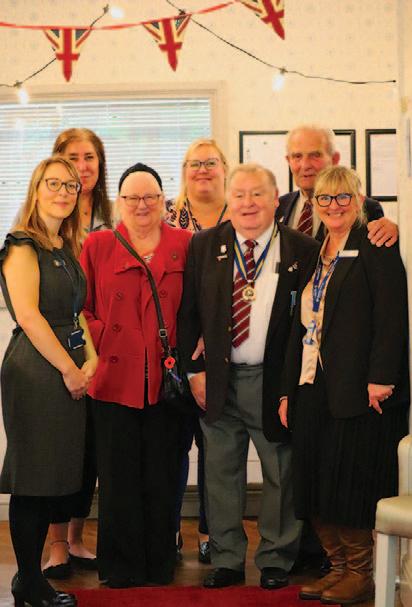
The VFF allows care home staff to develop understanding of some of the lived experiences that their residents have had, to help them deliver person-centred care, and signpost to healthcare services and charities, such as the RBL or Blind Veterans UK.
We're providing the support and resources to help staff better understand service life and lived experiences through care planning and the pre-admission documents. We’ve connected homes to groups within their communities, and they’ve learned about the help and support out there for veterans.
Declaration of Armed Forces status to the NHS is one of the required standards of the VFF. This early identification is beginning to support members of the Armed Forces community when they are part of a wider assessment of needs process. Veterans are being signposted from hospital into our VFF homes for anything from further rehab assessments, to short and long-term residency. By identifying status to Primary Care providers, we are affording the resident the opportunity to be referred into some of the military veterans’ services, such as Op Courage, and the many charities that support the Armed Forces community.
The staff have been wonderful and really bought into the project. Each Home has VFF Champions, and they enjoy what they’re doing. Many of our Champions have military backgrounds. We encourage all members of the care home team to become Champions, and by doing so we have a really inclusive mix of staff from the homes.
Homes going through the process meet up every two weeks. Then they work through the Framework in groups of six to eight. Once they have achieved VFF status, the homes meet with us every three months to share their progress, and are then reviewed at one year after their initial achievement.
We have heard so many lovely stories about the impact it has had on veterans and their families, as well as other care home residents. Nine people from a care home led a local Remembrance parade after being identified as veterans through the VFF, and this brought a sense of pride and joy to everyone.
Another care home put a resident in touch with Blind Veterans UK. When their case worker came to the home, it emerged that there were eight blind veterans living alone in the community. So they were invited to spend Christmas Day at the home with other residents and staff.
There are so many astonishing stories, I cry regularly when I read the applications! It’s not only humbling, but really quite powerful too. Sometimes I have to take a minute and then come back and read it again. Every application tells us the story of a home's journey, working through this Framework and it is really inspiring, and a real privilege.
I think it’s given homes the confidence to look at other groups of residents and see if there are similar things out there to support them. I was chatting to a home which has a lady who’s lived with the effects of having a stroke many years ago, and because of the VFF, this home has gone out to the Stroke Association and different local charities to see if there is any support for her.
And we are helping homes to evidence their VFF work in some of the domains that they need for their CQC assessment – so it could make the difference between a Good and an Outstanding rating.
Of course, there have been obstacles to overcome along the way. We’ve launched from scratch and we have to prove the benefits of this programme with some of the homes that don't necessarily get involved in external projects. But I think the fact that we are a free-of-charge programme helps. There is a real challenge around IT. A lack of computers in homes could pose difficulties, and some Champions have limited IT skills.
There's a challenge in some of the larger organisations in terms of getting consent to be involved in the programme, which can be a time-consuming process. Staff turnover could also be a problem as we would start in some homes with Champions, but they would move to a different position or organisation, and we’d have to start the process again.
So there's been a number of hurdles to clear, but I think we've been really resilient and overcome them. We are a very tight team in the VFF, we constantly communicate, we talk about things that are an issue before they become a problem. We brainstorm how we're going to manage things in the future. We do it as a unit.
It's such an honour to award homes their VFF status. We ask them to celebrate and share this, because a lot of care homes don’t showcase the phenomenal work they do.
We describe the VFF as the gift that keeps on giving. We are helping homes to identify residents and understand their lived experiences, improving their lives in care. We now have over 100 homes with VFF status, and we have helped and supported 1,200 veterans. We are connecting them with a community, with charities and healthcare providers.
Any care homes or organisation who want more information on the free VFF programme can contact Kathryn on Kathryn.Glass@starandgarter.org or 07425 326070.
A dedicated senior care practitioner at Telford Hall care home in Telford, part of Sandstone Care, has been recognised for her outstanding contribution by being named a Sandstone Star.
Danielle Merrick was selected as the Q4 2024 Sandstone Star, an honour awarded quarterly to an exceptional employee from across Sandstone Care’s nine care homes.
To be eligible, staff must first be recognised as Employee of the Month at their respective care home before being considered for the overall accolade. The final selection is made by Steve Hamblett, Operations Director.
The pobroll® is the invention of Pat O’Brien, a physiotherapist, Moving and Handling trainer, and Conflict Management tutor with over two decades of experience in care homes and nursing homes
Care home managers often face challenges in delivering intimate care while balancing efficiency and managing costs, particularly when these essential tasks provoke behaviours that can be challenging to safely manage. Traditional methods—especially for bed-bound residents—often lead to lengthy processes and frequent linen changes, driving up costs and consuming valuable staff time. The pobroll® provides a transformative solution that supports dignified care, achieves significant cost savings, and reduces the need for additional staffing.
Praising Danielle’s dedication, Steve Hamblett said: “Danni really embraces her senior role, is so supportive to other colleagues and leads by example. She regularly goes over and above in her role and, despite some adversities, manages to work with a smile on her face. I know Karl, the regional manager, has been very impressed with her since joining us, and that demonstrates just how far she has come in the last year.”
Danielle said: “This is really unexpected but I am so pleased. I love my job and making the residents feel safe and happy so this is the icing on the cake.”

The pobroll® is an innovative bed-bathing wrap specifically designed to enhance comfort and dignity during personal washing for individuals who require in-bed care. Centred on the resident’s experience, it minimizes distress by providing sensory comfort. Crafted with two layers of high-quality cotton-terry toweling and a waterproof layer in between, it delivers a soothing, calming experience while keeping the bed completely dry. Sized for a standard single bed, the pobroll®’s dual-layer design offers warmth and a sense of security and privacy, allowing residents to maintain comfort and dignity during bed-based bathing routines.
BOOSTING COST SAVINGS AND OPERATIONAL EFFICIENCY
The pobroll®'s waterproof design enables caregivers to provide a complete wet wash without the risk of soaking the bed, minimising the need for frequent linen changes. This leads to fewer laundry loads, reducing labour and utility costs, as well as wear on linens. By reducing logistical tasks, caregivers have more time to focus on direct resident care, enhancing productivity overall. Additionally, reduced reliance on disposable wipes results in further cost savings and supports environmentally sustainable practices. With its durable, reusable design, the pobroll® maintains hygiene standards and allows for extended use across multiple residents. As care homes face increased pressure to adopt sustainable practices, the

pobroll® provides an effective solution that supports both economic and environmental goals.
Managing resident agitation—particularly for those with dementia—often requires specialised training in restraint techniques. The pobroll® significantly reduces the need for physical intervention by providing a warm, secure covering that alleviates resident distress. This gentle approach minimizes aggressive or defensive reactions, reducing the number of staff needed for these interactions. As a result, facilities can potentially lower staffing levels without compromising care quality, yielding substantial cost savings. Additionally, reduced dependence on physical intervention decreases training costs associated with restraint techniques. By simplifying the process of intimate care, the pobroll® reduces the need for specialised training, making onboarding smoother and lowering turnover-related training expenses.
The pobroll® supports compliance with restraint reduction guidelines, helping facilities minimise documentation burdens and regulatory liabilities linked to physical interventions. This non-invasive solution improves safety for both residents and caregivers, fostering a culture of dignity and respect that boosts satisfaction among residents and their families.
CONCLUSION: A VALUABLE ASSET FOR QUALITY CARE AND COST MANAGEMENT
For care homes, the pobroll® represents a strategic investment, offering measurable savings by reducing reliance on disposable products, lowering laundry and training costs, and enabling efficient staffing. Most importantly, it prioritises resident dignity and comfort, setting a high standard for compassionate, personcentred care. For facilities seeking to enhance financial performance and care quality, the pobroll® is an invaluable addition to their resources.
Fof further information, see the advert on the facing page.
Alzheimer’s Research has launched a powerful new film to highlight the importance of dementia research in the ongoing search for a cure.
Voiced by acclaimed British actor Stephen Graham, the 30-second film also celebrates the people standing with Alzheimer’s Research UK to end the heartbreak the condition causes.
Stephen Graham said: “Alzheimer’s Research UK is a cause that’s very close to my family. It’s so hard to watch someone you love, slowly disappear before your very eyes. Dementia is one of the greatest health challenges of our time, and I’m proud to have lent my voice to this film.”
Alzheimer’s Research UK is funding research across 120 institutions to support thousands of researchers helping to revolutionise the way dementia is treated, diagnosed and prevented.
The charity has fuelled over 1,275 research projects with more than £237 million of funding, helping to deepen understanding of the diseases that cause dementia and lead us closer to a cure.

The film combines photos of the charity’s supporters and dementia researchers to demonstrate the vital part everyone plays in overcoming it.
Hilary Evans-Newton, Chief Executive of Alzheimer’s Research UK, explains the importance of us all coming together for a cure.
She said: “We’re proud that our new film puts a spotlight on the people who are standing with Alzheimer’s Research UK to speed up progress towards a cure.
“From those who have witnessed the devastating impact of dementia first-hand, including Stephen Graham who generously lent his voice to this film, to the researchers who are making vital discoveries every day.
“We all have a role play, and we’re honoured to have all these people standing with us.”
The film has been brought to life by award winning creative agency Above + Beyond and will air on streaming sites included Prime Video, Netflix, Disney Plus and YouTube until 2 March.
Hill House care home recently held successful ‘Don’t Eat Alone’ lunch for people in Honiton and Combe Raleigh who would otherwise be eating alone.
Hill House, a care home managed by the charity Abbeyfield Living Society, were joined by people from Honiton and Combe Raleigh, who would otherwise have been eating alone, for a delicious fish and chips lunch on Monday 17th February.
Residents and staff at the home hosted the free ‘Don’t Eat Alone’ lunch, which was followed by music provided by their favourite local band The Jim Jamz, who are fronted by Rachel and Albert Murphy, the daughter and son-in-law of a former resident. A harpist provided further entertainment.
Nic Trueman, Hill House’s activities and wellbeing lead, said, “We know that there are people in our community who live on their own, and we have witnessed the untold damage that loneliness can do to one’s mental and physical wellbeing.
“With the immeasurable value we place on social interaction, we created this opportunity to invite people in who would benefit from a hearty lunch, some fantastic company and entertainment, and
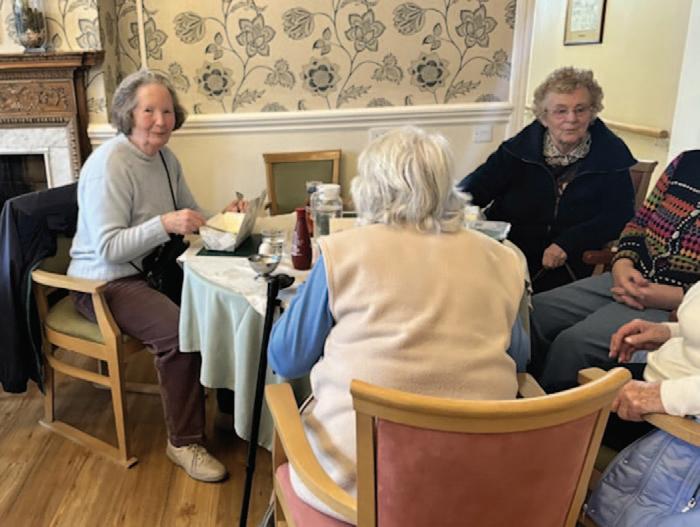
maybe even make some new friends.”
The event was hugely successful. Pauline, who lives alone in the local community, said, “What a wonderful afternoon we’ve had. Good food, good music and lovely company!”
Another guest commented, “I would normally have been sat at home on my own. This has been such a treat!”
Melody Taylor-Brown, Care Home Manager at Hill House, added, “We are our own little community here at Hill House. Although this event lasted only a few hours, we hope that our guests were able to see the clear advantages of life here for our residents. We would be delighted if any of them were to consider joining us for a respite stay or as a resident in the future.”
She added, “The afternoon was such a success that we hope to make this a regular event and help alleviate loneliness in our neighbourhood.”
The ‘Don’t Eat Alone’ initiative followed the home’s highly successful Christmas dinner, where 10 guests, who would otherwise have spent the day on their own, came along to enjoy turkey with all the trimmings – and even received a present from Father Christmas himself!

NHS staff delivered a record 18 million treatments in 2024, as the waiting list fell in December for the fourth month in a row.
The overall backlog has dropped again from 7.48 million to 7.46 million, while the estimated number of patients waiting is down from 6.28 million to 6.24 million.
Monthly figures show that hardworking NHS staff delivered a record 18 million treatments in 2024, hundreds of thousands (4%) more than in 2023 (17.35 million) and 5% more than in 2019 (17.1 million).
In December alone, the NHS carried out 1.33 million treatments, up 6.5% on 1.25 million the year before.
The proportion waiting less than 18 weeks was 58.9%, up from 56.6% in December 2023.

As part of the ambitious elective care reform plan, the NHS is aiming to return to the constitutional standard of treating 92% of patients within 18 weeks by March 2029, and to get to 65% by March 2026.
The number waiting more than a year for treatment fell to 200,375 making up just 2.7% of the overall waiting list – the lowest proportion since August 2020.
Thanks to the continued expansion of community diagnostic centres, the NHS also delivered more than 28.3 million tests and checks in 2024 – a record year – up a fifth on 23.6 million in 2019 and up 7% on 26.5 million in 2023. NHS staff delivered 2.24 million checks in December alone, up 21% on 1.85 million in 2019.
The NHS met the faster diagnosis standard for cancer again in December with 78.1% of people receiving the all clear or a definitive diagnosis. There were 20,000 more people diagnosed or given the all clear within the standard compared to the same month last year (190,571 in December 2024, compared to 170,155 in December 2023).
Despite huge pressures on the NHS in January with soaring levels of winter illnesses like flu and norovirus, high bed occupancy and difficulties discharging patients, 73% of patients were seen within 4 hours in A&E. This was both an improvement on the month before (71.1%) and the same month last year (70.4%).
An average of 14,087 beds were taken up by patients who were medically fit for discharge each day last week, the highest so far this winter.
Health and Social Care Secretary, Wes Streeting, said: “Through the Prime Minister’s Plan for Change, the government has already cut NHS waiting lists by almost 160,000 since July, through a combination of investment and reform.
“As we work to end the misery of people left stranded on NHS waiting lists, we will also continue to address the issues facing our A&E departments.
“Annual winter pressures should not automatically lead to an annual winter crises and we will soon publish our plan to improve urgent and emergency care services, so the NHS can be there for everyone when they need it, once again”.
Tim Gardner, Assistant Director of Policy at the Health Foundation, said: “Today’s (February 13) figures further highlight the continuing strain on urgent and emergency care services this winter. January saw a new high of 61,529 patients waiting over 12-hours in A&E before being admitted to a hospital bed, the most since current records began in 2010.”
“Conditions this winter have been difficult but not exceptionally severe, and the NHS needs to be able to manage expected surges in demand without major impacts on patient care. Long waits in A&E departments, delayed ambulance responses and pressures on hospital capacity are all symptoms of an NHS that is running on empty.”
“The reasons for this are well known, a decade of underinvestment in the NHS and a lack of reform and capacity in community and social care services, resulting in delayed discharges.”
“It’s vital that the Government’s forthcoming 10-Year Health Plan and Spending Review provides the right mix of reform and investment to create a more resilient NHS that’s fit for the future. Winter pressures are inevitable, an annual NHS crisis is not.”

Anchor, England’s largest not-forprofit provider of housing and care for people in later life, and the country’s biggest armed forces charity the Royal British Legion (RBL), today announced the launch of a landmark partnership between the two organisations.
The agreement will see Anchor and the Royal British Legion work collaboratively to identify veterans or serving personnel who may need access to care and support services. This could include the provision of short breaks, respite care or permanent residential care in Anchor locations not covered by RBL care homes. It will sit alongside services already run by the Royal British Legion including physical and mental health recovery, as well as assistance with housing, finances, care and independent living.
The partnership was launched at a joint event featuring speeches, singer Kathleen Linton-Ford and representatives of the Royal Star and Garter’s Veteran Friendly Framework, at Anchor’s West Hall care home in West Byfleet, Surrey, on February 17.
Rob Martin, Anchor’s Managing Director of Care Services – who himself served in the Royal Artillery in Germany, Canada and Bosnia-Herzegovina – said:
“We are very proud to enter into a partnership with globally recognised and respected charity the Royal British Legion to provide greater access to care and support for veterans.
“In addition to our partnership with the RBL, there are over 20 Anchor care homes accredited by the Veteran Friendly Framework across the country, which demonstrates our ongoing commitment to provid-
ing homes where people can continue to love living in later life.”
Mark Atkinson, the Royal British Legion’s Director General, said: “The Royal British Legion is delighted to be working with Anchor to help veterans and the Armed Forces community. Through this collaboration, we hope to raise awareness of the Royal British Legion’s and Anchor’s care facilities and support services, to ensure veterans have access to the care they need.
“We look forward to developing our partnership with Anchor and collaborating to show our lifelong support to our Armed Forces community.”
THE PARTNERSHIP WILL ALSO:
• Create joint initiatives to support veterans feeling lonely and isolated in the community
• Enable Anchor and the Royal British Legion to maximise opportunities to celebrate the achievements of Armed Forces veterans, including VE Day and Remembrance
• See Anchor care homes and housing schemes supporting the Royal British Legion with its annual fundraising Poppy Appeal
• Explore how Anchor can support the Royal British Legion’s Admiral Nurses, a specialist service which helps the Armed Forces community and their families living with dementia

• Share best practice and innovation around the development of colleague diversity networks within each organisation
The Veteran Friendly Framework is a collaborative project led by theRoyal British Legion,Royal Star & Garter and theVeterans Covenant Healthcare Alliance.
It helps care providers to offer appropriate support for the social, emotional and physical needs of the thousands of armed forces veterans across the country.
The Cleaning Show 2025 will return from 18-20 March at ExCeL, London, with industry leaders set to tackle the cleaning and hygiene industry’s biggest challenges in this year’s Conference programme. The 2025 theatre will see expert speakers from across the sector sharing insights on pressing topics from sustainability, education and workforce development to technological advancements and future preparedness.
Sustainability remains a top priority for businesses, consumers and regulators alike. The Cleaning Show 2025 will dedicate several sessions to exploring innovative solutions and practices to help the sector reduce its environmental footprint. Attendees will gain valuable insights into the practical steps required for compliance and the long-term benefits of adopting sustainable practices.
Education and development: building the workforce of tomorrow

Recruitment, education and training remain pivotal for the growth and resilience of the cleaning and hygiene industry. This year’s programme will address the challenges of attracting and retaining talent and the importance of upskilling to meet future demands.
Delia Cannings, Chair of the British Cleaning Council (BCC), will open the show and announce the launch of a new website called the UK Cleaning Career Development Zone, a significant new initiative which will bring training and career development information from across the cleaning and hygiene industry sector together into one easily-accessible place, for the first time. TECHNOLOGY AND AI: EMBRACING INNOVATION
The rise of artificial intelligence (AI) and technology presents transformative opportunities for the cleaning sector. Attendees will discover how these advancements can enhance productivity, efficiency and innovation in the sessions “AI in the Cleaning Sector – Change is a Fact… But How Do We Embrace It?” and “The Evolution of Cleaning in FM”.
As the world continues to navigate the aftermath of COVID-19, the conference will also examine how the cleaning industry can be ready for future challenges.
In “Preparing for the Next Pandemic – Lessons Learned”, industry leaders including Neil Nixon, Conference Director of The Cleaning Show and Duncan Holdsworth, Head of Technical at GV Health, will reflect on the successes and shortcomings of the industry’s pandemic response and identify steps to improve resilience and readiness for potential future crises.
Paul Sweeney, Event Director of The Cleaning Show, said: "We’re proud to welcome the industry’s leading voices to the conference stage at The Cleaning Show this March. From tackling recruitment challenges and embracing sustainability, to keeping up with technological advancements, it’s vital for businesses to learn from experts and apply these insights to their operations. This year’s Conference will deliver practical strategies to address the key trends and opportunities shaping the sector, and we’re excited to showcase the latest innovations driving the future of the cleaning and hygiene industry." For further information, please see the advert on page 11 or visit www.cleaningshow.co.uk/london

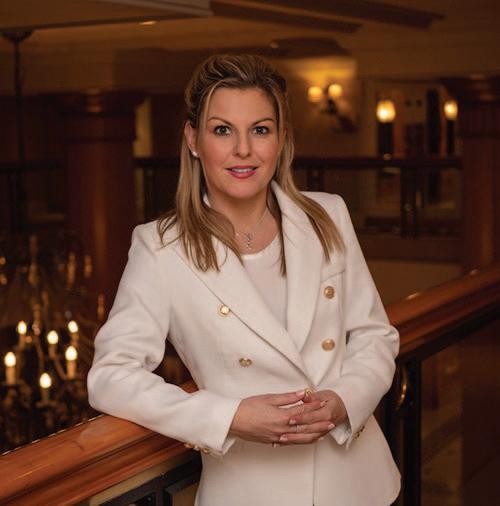
The latest UK Care Homes Trading Performance Review 2024 shows occupancy levels rising to 88.3%, a positive sign of market recovery. However, while this progress is encouraging, it reveals significant untapped potential in how care homes attract and convert prospective residents.
Presenting care homes effectively is not just about showcasing services—it's about creating emotional connection and trust. Families are making difficult decisions in emotionally charged situations, which requires a sophisticated approach to relationshipbuilding and conversion. Care homes are offering something no one truly wants to need, making the challenge even greater.
To truly drive sustainable occupancy growth, care homes must focus on transforming the customer journey—from raising awareness to handling enquiries and guiding families through to admissions. Many providers are still missing key opportunities. Too often, care homes fall short in delivering the basics well, leading to lost enquiries and missed revenue potential.
CRITICAL AREAS NEEDING IMPROVEMENT INCLUDE:
Generating Quality Leads: It's essential to attract the right audience from the outset through targeted campaigns, high-value content, and strategic outreach across multiple channels, including community outreach, digital marketing, partnerships, referral networks, local events, print ads, and door drops.
• Empathetic First Contact: Enquiries must be handled with care, expertise, and emotional sensitivity, recognising the difficult decisions families face.
Personalised Tours: Showrounds should go beyond listing services, highlighting quality of life benefits such as personalised care plans, engaging activities, and the warmth of community life.
By Ali Powell, CEO and Founder at
Clear Value Communication: Families need transparent, outcome-driven explanations of the value of care— focusing on dignity, well-being, and peace of mind, not just amenities.
• Consistent Post-Visit Engagement: Many care homes neglect follow-up strategies after visits, losing potential residents who may need further reassurance or time to decide.
TRACKING THE RIGHT METRICS:
To ensure the customer journey is effective, care homes should track key performance metrics, including: Monthly Lead Generation: Number of leads that meet predefined criteria indicating genuine interest or fit.
Monthly Visits: The number of on-site or virtual tours conducted within the month.
• Monthly Admissions: The total number of new residents admitted each month.
Lead Source Performance: Breakdown of leads by marketing channel (e.g., online ads, social media, referrals, events) to identify the most effective sources.
Average Admission Cycle Length: The average time from initial lead generation to a confirmed admission.
Monthly Marketing Spend: Total amount spent on marketing each month.
Website Traffic: Total visitors to the website and engagement rates for the month.
Social Media: Total followers and engagement on platforms like Facebook, LinkedIn, and Instagram.
THE OPPORTUNITY:
Investing in marketing and relationship-building efforts is not a luxury—it's essential. The cost per acquisition is often minimal compared to the hundreds of thousands in lifetime revenue generated from new residents. By focusing on consistency and excellence throughout the entire customer journey, care homes can significantly impact both occupancy rates and short- and long-term growth. The data is clear: doing the fundamentals well is not just good practice—it’s essential for both immediate results and lasting success. It’s time for care homes to move beyond filling rooms and start focusing on creating an inspiring customer journey that builds confidence, trust, and emotional connection with families.
If you need an expert in this area, contact Ali at Commercial Acceleration—specialists in strategy and implementation for transformational and turnaround results.
ali@comaccel.co.uk | comaccel.co.uk


FORMER Scotland rugby international Andy Irvine has officially opened a brandnew social space at one of Edinburgh’s most prestigious care homes.
The Scotland and British and Irish Lions star joined residents at Cramond Residence to open its very own pub, marking the latest addition to the home’s outstanding facilities.
Created as a vibrant social hub, the new space now offers residents a welcoming environment to enjoy sporting events, themed gatherings and special celebrations designed to enhance residents’ social lives and wellbeing.
Decorated with an impressive array of sporting memorabilia, the pub features a signed British and Irish Lions jersey donated by Irvine from his playing days, along with a collection of Scotland rugby keepsakes.
Andy said: “It was a pleasure to be invited to open the new pub at Cramond and spend time with the residents. It’s fantastic to see a space like this created for them, where they can come together, share stories, and enjoy the social side of sport.
“The pub has a great atmosphere, and with all the memorabilia on the walls, it feels like the perfect place to watch a match or catch up over a drink.”
Richard Annan, Head of Sales and Marketing at Cramond Residence said: “The new pub space has rapidly become the heart of our home. It’s wonderful to see residents connecting over shared interests, making new friends and maintaining the active social lives they’ve always enjoyed.
“Many of our residents were previously members of clubs such as rugby, golf and tennis. This new
space allows them to relive those experiences while enjoying live events together in a setting that encourages natural socialisation.”
“The response has been overwhelmingly positive, and we’re excited to see how the pub continues to bring people together.”
Head of Maintenance at Cramond Residence, Billy Early, played a key role in bringing the pub to life, using his skills to craft a bespoke wooden bar and transform the space into a warm and welcoming social hub.

Billy said: “It’s been a real privilege to work on this project and see how much the residents are enjoying it already. We wanted to create a space that felt special but also comfortable – somewhere people would naturally want to spend time.
“It’s all about tailoring our spaces to the interests and passions of our residents, ensuring they can continue to enjoy the things that matter most to them.
“The pub has already become a hub of activity, and we’re looking forward to making the most of it with events such as Wimbledon, The Grand National, and the rest of the Six Nations.”
Plans are already in motion to introduce further dedicated spaces at the home, including a fully equipped gym, a hobby and games room and a nostalgic 1970s-themed living area to support residents living with dementia.
The residence was purpose-built for £8m and opened in October 2018, adopting a small-group living philosophy with a major emphasis on socialisation.
A leading care management software provider has launched ‘Customer Checklists,’ a new feature that helps make care processes simpler, more consistent and easier to follow.
The latest feature from PASS by everyLIFE helps care managers stay on top of important tasks, such as compliance checks, onboarding new clients and health monitoring – all in one place.
The checklist ensures that nothing is missed – if a task isn’t completed, carers get an automatic reminder so they can follow up. This helps keep care on track, reduces mistakes and gives carers more time to focus on the people they support instead of paperwork. Key benefits of the Customer Checklists tool, include: Easier onboarding – Helps new customers settle in smoothly by guiding care teams through every step, from first assessment to first visit. Better compliance – Makes sure important care plan reviews and tasks are completed on time, reducing the chance of anything being missed.

Personalised care – Checklists can be customised for each person, ensuring their care meets their specific needs.
Clear team roles – Tasks can be assigned to the right team members, with progress tracking to keep every-
thing on track.
Duncan Campbell, Director of everyLIFE Technologies, said: "We’ve always been committed to putting people first in care. Customer Checklists is another way we’re helping care professionals with the tools they need to provide great, person-centred care. We believe this feature will make a real difference to the people they support.”
Founded in 2014, PASS by everyLIFE is a digital platform designed to make managing home care easier. PASS includes tools for care planning, tracking progress, mobile access and real-time communication, helping teams stay connected and organised. PASS is used by over 84,000 care professionals every day to help plan, manage and deliver care. Services using PASS are 37% more likely to receive an ‘Outstanding’ rating from the CQC compared to the national average, evidencing
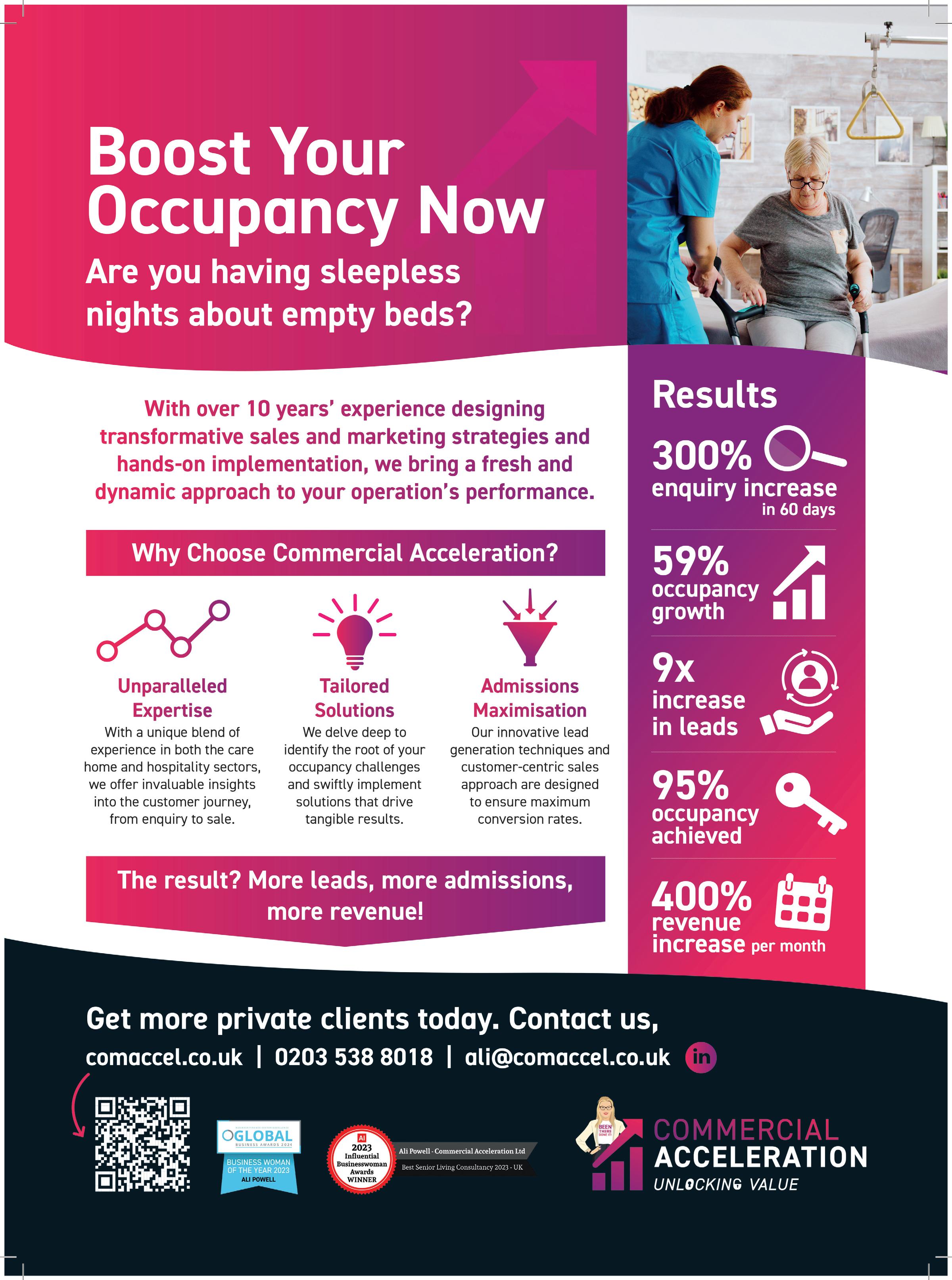
When considering living a healthy lifestyle, watching movies might not be the first thing that springs to mind, but surprisingly, sitting down to watch your favourite Hollywood stars can be a great way to exercise your mind and improve your mental health, especially for the older generation.
Experts at care home provider Ideal Carehomes, now part of the HC-One family of care homes, offer movie screenings and dedicated cinema rooms in their homes and have seen firsthand the benefits they bring to film lovers of all ages.
A CHANCE TO GET LOST IN THE MOMENT
Studies suggest that getting engrossed in the plot of a movie can provide a chance to get lost in the moment. Whilst watching the characters on screen, the mind is able to focus, and a sense of calm can be introduced. This can help to lift overall mood or simply give the audience a moment of peace on a busy day.
Sarah Clark, Home Manager at Bradley Hall in Leicester says, “Our cinema room is the perfect place for our residents to sit back, grab some popcorn and relax. Some will choose to watch along quietly, while others will discuss the plot with their friends! However they choose to enjoy screenings, we think it's so valuable as it can really help to brighten their mood.”
IMPROVED MEMORY RECALL

For the older generation, watching classic films gives them a chance to reminisce, promoting the recall of long-term memories and keeping the brain active. Studies suggest that those with dementia may find it easier to recall such memories, which can bring them great comfort.
Reminiscing can also be a great conversation starter, promoting social interaction and helping to encour-
age a sense of community.
Nicola Sutton, the Front of House Manager at Lydgate Lodge in Batley explains, “The cinema room always comes alive when we show the classics - many of our residents adore them and can remember watching them in their youth. It’s lovely to see them chatting about their first cinema trips or how they used to style their hair like Marilyn Monroe.”
INCREASED FEEL-GOOD HORMONES
When trips to the cinema are pre-planned, they offer something to look forward to which can have a positive impact on mental health. Positive future thinking releases feel-good hormones which have several benefits such as lifting mood, reducing stress, calming anxiety and increasing motivation.
“Our residents love our cinema and always look forward to our next showings. There’s always an air of excitement in the home in the run-up to the next movie screening,” says Bethany Phillips, Front of House Manager at Foley Grange in Kidderminster.
Lawra Baumane, Wellbeing Manager at HC-One, says, “Across all of our homes, we feel it’s really important for our residents to have something to look forward to, which is why we have a full programme of activities and entertainment every day of the week, with something for everyone to enjoy.
Movie screenings are extremely popular with our residents and have fantastic mental health benefits, which is why we have custom-built cinema rooms inside so many of our homes. Providing a dedicated cinema space makes screenings a real event, adding to everyone’s excitement and heightening the positive side-effects these can have.”
A Wellbeing Coordinator who works at HC-One’s Springwater Lodge Care Home in Calverton, Nottingham, is taking on an extraordinary 100k running challenge throughout the month of February to raise funds for Dementia UK.
Dace Peacock, Wellbeing Coordinator chose to take on the 100k a month challenge for Dementia UK as it’s a cause very close to her heart. Dace’s commitment to the cause is driven by her personal connection to dementia and her transformative experience from working within a care home. Dace’s commitment to the challenge comes from her profound connection to dementia.
Dace Peacock, Wellbeing Coordinator at HC-One’s Springwater Lodge Care Home, said: “Working at a care home has profoundly transformed my perspective on dementia. Whilst I’ve read numerous studies on the subject, they often focus on cellular aspects and overlook the human side of the

condition.
“Experiencing it firsthand and correlating that with scientific research, it’s become painfully clear that we still don’t have a cure. Dementia is a condition that demands extensive research, and every single penny we raise translates into valuable knowledge and support. Together we can make a difference.”
Having witnessed the effects of dementia both professionally and personally, Dace is dedicated to raising funds to support Dementia UK’s vital work.
Dace is aiming to raise £250 for the charity, which will contribute to ongoing research and essential support services for families and individuals affected by dementia. She will be completing her 100k challenge on the 28th February outside Springwater Lodge Care Home, and invites everyone to join her in supporting this worthy cause.
The foundation of exceptional care home service lies in collaboration, efficiency, and reliability. For over a decade, Care Quality Pharmacy (CQP) has stood as a trusted partner for care homes across England, Scotland, and Wales. With a specialised approach to care home pharmacy services, CQP ensures residents receive timely and accurate medication, allowing carers to focus on what truly matters: quality time with their residents.
One of the most significant challenges for care homes is navigating missing or out-of-stock medications. CQP’s proactive system addresses this with precision. Their team checks prescriptions, liaises with GP services on behalf of the care home, and resolves discrepancies swiftly. Additionally, CQP’s access to national wholesale suppliers and long-standing relationships ensures a robust strategy for managing short supply issues, keeping residents’ needs a top priority.
Medication errors, often a stress point for staff, are almost eliminated thanks to CQP’s cutting-edge systems. Medications are picked using robotic technology, followed by a meticulous two-stage accuracy check by a pharmacist. This stringent robotic process has achieved an impressive error rate of less than two parts per million. Furthermore, integrations with market leading eMAR providers and coloured paper MAR entries are handled by CQP, reducing the administrative burden for care home teams. Timely delivery is another hallmark of CQP’s service. Monthly deliveries are scheduled up to six days in advance, and their teams ensure precision and dependability making the booking-in process hassle free. For urgent needs, a 4pm interim cut-off guarantees next-day delivery, including Saturdays. CQP’s commitment to care extends beyond medication. Their open communication lines, available seven

days a week, foster seamless interactions. Moreover, their Quality Assurance Team conducts annual face-to-face compliance audits, enhancing regulatory compliance and resident satisfaction. Added services, such as guidance on covert medicine administration and homely remedies advice, showcase their dedication to meeting every need.
Leading national care home partners trust CQP completely to manage pharmacy services across their entire estates. This unwavering confidence is a testament to the expertise, efficiency, and reliability that CQP brings to the table. Care homes also benefit from no-cost residential returns collection and free online medication training sessions. CQP supports staff development, ensuring a high standard of care using the CQP systems and processes.
By embracing the ethos of collaborative working, Care Quality Pharmacy sets the benchmark for care home pharmacy services. Their efficiency, responsiveness, and focus on compliance empower care homes to achieve the best outcomes for their residents. In an ever-demanding sector, CQP remains a steadfast partner, proving that the right support makes all the difference.
NHS prescription item dispensing data from October 2024 shows CQP to be the 6th largest distance selling pharmacy in England and therefore possibly making it the largest independent specialist care home pharmacy in the country.
Care Quality Pharmacy can be contacted by telephone on 0800 970 8844, online at cqpharmacy.co.uk/care or by contacting the National Partnerships Director, Patrick Bell directly at patrick@cqpharmacy.co.uk
National care home only pharmacy operating since 2011, based in the Midlands – serving England, Scotland and Wales.
Missing medication? Our team checks all your prescriptions for you and informs you of missing medication - huge time and cost saving to the home, freeing up your quality time with your residents.
Out of stock medication? We manage the entire short supply and out-of-stock medication process. Medication errors? Our resident order is picked by robots, then a 2 – stage independent accuracy check by pharmacists ensures you have the right medicine, on time, every time.
eMAR Integrations - Our systems work alongside all major eMAR providers
Are your deliveries on time? Our monthly deliveries are up to 6 days in advance, giving you plenty of time to book in medication. Saturday deliveries included.
Open Communication - One direct communications team, answering calls & responding to emails giving you one SLA for all of your homes.
Compliance - Quality Assurance Team – guaranteed face-to-face annual compliance audits. Consistency of service and delivery with audit trail.
We are Specialists in care home only dispensingDouble labels, Covert administration and Homely remedies advice.
Free Residential Returns Residential home’s returns are collected – no cost implications to you.
Free Medication Training – Both online and face-toface options available.
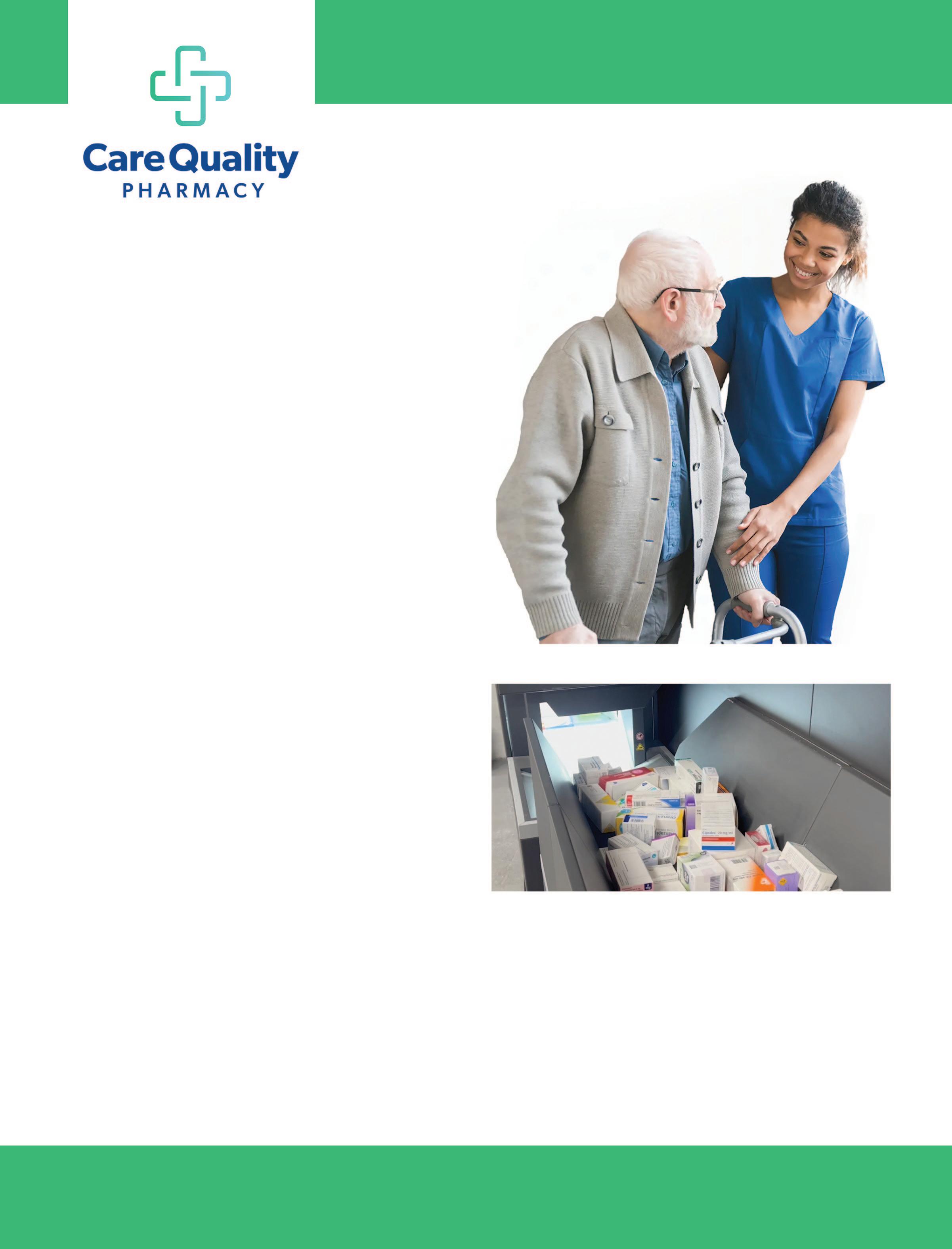
Become part of the care home pharmacy delivering excellence in medication management across the country.
References available on request.
To organise an introductory meeting please contact National Partnerships Director, Patrick Bell: Email: patrick@cqpharmacy.co.uk
As 2025 gets into full swing, the social care sector finds itself grappling with the lingering challenges of a difficult 2024. In response, Log my Care, the intuitive care management platform, has launched Shaping Social Care 2025, a new e-book full of expert perspectives and strategies to support the sector. This article by Mark Topps is an extract from the report, which features six additional chapters of predictions and advice from leading experts covering topics across legal, CQC, HR, complex care, and technology. When discussing efficiency, we often focus on time savings, which shifts our attention from evaluating existing processes. Additionally, we must consider our teams and those we support, balancing efficiency with quality. Here are practical strategies to achieve both.
A large part of social care involves administration, making it an ideal area for streamlining. However, social care often lags in adopting digital tools and AI. While technology isn’t a cure-all, it’s an accessible way to improve workflows without hefty costs.
Many providers already use Digital Care Planning systems, but are these systems being fully utilised? Often, key features are disabled during setup, integrations face challenges, and tools go unused due to limited training. Revisiting these systems and addressing gaps can unlock untapped efficiencies. Proper training can save time, reduce manual work, and allow teams to focus on high-quality care. Here are some strategies and tools to enhance efficiency:
● Digital Care Planning and EHR Integration: Integrating Digital Care Planning systems with electronic health records (EHRs) ensures quick access to essential information, improves accuracy, and reduces time spent on communication with healthcare professionals.
● Digital Rostering: Tools like Log my Care’s Rostering add-on simplify rota creation, optimise staff deployment, and align carers with service users’ needs, improving both efficiency and care quality.
● Process Mapping: Visualise workflows to identify inefficiencies and bot-
tlenecks. Regular updates ensure relevance and provide clarity for teams.
● Simplify Workflows: Eliminate redundant tasks and combine actions where possible. Streamlined workflows save time and reduce errors. These strategies help create efficient systems, allowing more focus on delivering quality care.
Time management is crucial for productivity and quality care. Investing in training and development can significantly enhance efficiency. Consider the following:
● Time Management Training: Tools like the Eisenhower Matrix help staff prioritise tasks based on urgency and importance, ensuring critical items are addressed promptly.
● Goal-Setting and Task Management: Training staff to set realistic goals, break projects into manageable steps, and establish achievable deadlines fosters accomplishment and reduces burnout.
● Continuous Learning: Encourage staff to stay updated on best practices and emerging technologies. This keeps teams engaged, skilled, and ready for challenges.
● System Reviews and Innovations: Regularly evaluate current systems and explore new technologies to identify tools that enhance both efficiency and care quality.
Investing in these areas builds a proactive, capable team ready to meet the demands of modern social care.
While most claim to deliver person-centred care, it’s worth reflecting on whether unique needs are genuinely met. Consider the following:
● Reflect on Care Delivery: Imagine care without constraints like cost or staffing—what would you change? Use these insights to identify actionable steps, such as adopting new technology, reviewing care plans more frequently, or increasing staffing levels.
● Feedback Utilisation: Evaluate how feedback is gathered, analysed,
and acted upon. Effective systems not only highlight improvements but also show service users and staff their input is valued.
● Rethink Staffing Ratios and Rostering: Analyse staffing data to identify needs and explore different shift patterns or task-sharing opportunities. Involving staff in this process can lead to innovative solutions that enhance care and efficiency.
By reflecting, gathering feedback, and actively involving your team, you build a foundation for continuous improvement.
TEAM COLLABORATION AND COMMUNICATION
Streamlining communication is critical for operational efficiency:
● Consolidate Communication Tools: Using multiple systems can cause confusion and duplication. Centralising tools enhances coordination and reduces administrative burdens.
● Optimise Meetings: Regular, focused meetings with clear objectives are more effective than broad, infrequent gatherings. Purpose-specific meetings foster engagement and clarity.
● Collaborative Culture: Streamlined communication and purposeful meetings build trust and morale, empowering teams to work together effectively. This enhances processes and ensures exceptional personcentred care.
Efficiency in social care goes beyond saving time—it’s about maximising resources, eliminating unnecessary tasks, and streamlining processes.
The ultimate goal is improving outcomes for the people we support. By fostering collaboration, leveraging technology, and focusing on quality, we can create a system that balances efficiency and care excellence.
Scan the QR code to read the full ebook for free


Residents at Astune Rise care home in Eston, Middlesbrough enjoyed an unforgettable day when Dreamboy dancer Max Hunter paid a special visit.
Max, who was a manager at a retirement village in St. Helens before becoming a male stripper, jumped at the chance to make the residents’ day.
Amid much hilarity and raucous laughter Max strutted his stuff, to the delight of both residents and staff.
Caroline Bowstead, home manager at Astune Rise said: “We were offered a Dreamboy to come and visit. I spoke to the gang here and the ladies said a resounding ‘yes please’.
“I’ve never seen a reaction like it at any event we’ve done, and there’s been a lot of them at Astune Rise.
The laughter, the giggles, the tears – they’ve loved every minute of it.
“I’m just not sure how we’re going to top that, they’ve already asked him to come back next week for knit and natter!”
Max said: “This morning has been fantastic. It’s been a pleasure to join the residents here today. I used to run entertainment at retirement villages so it’s an absolute privilege to be back in a care home again putting a smile on residents’ faces.”
Resident 87-year-old Anne Hodgson said: “He has a nice body, nice and athletic and everything he did was lovely. Everybody was smiling and that’s beautiful.”
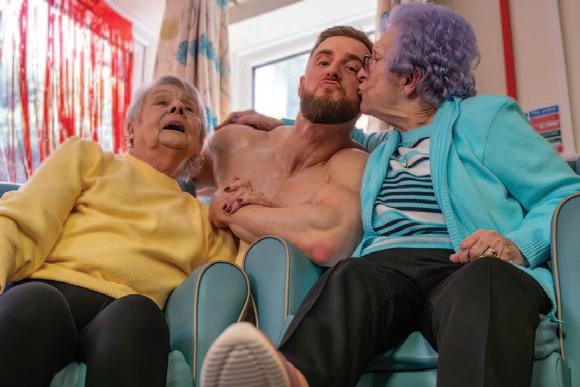
Betty Hughes spoke for many residents: “I loved his backside!”
Barchester’s Charitable Foundation is pleased to announce the appointment of a new trustee to its board; Irene Lewis, a retired Hospitality Operations Manager from Irvine in Scotland, who brings a wealth of experience from her extensive work in the care sector.
Established in 2000, the aim of Barchester’s Charitable Foundation is to help older people and adults living with a disability or mental health problems in local communities across the country. The charity provides grants to improve mobility and quality of life, and each year the Foundation distributes thousands of pounds to individuals, small community groups and charities across England, Scotland and Wales.
Irene worked for Barchester Healthcare for 24 years from 1998 – 2022. She started off as a kitchen assistant and worked her way up through the ranks in various different hospitality job roles to become Hospitality Operations Manager in 2015. Irene particularly liked her team leadership roles, the commissioning of new care homes, plus getting to know and building good relationships with so many of the Barchester employees all over the country. She also loved to take time to talk and
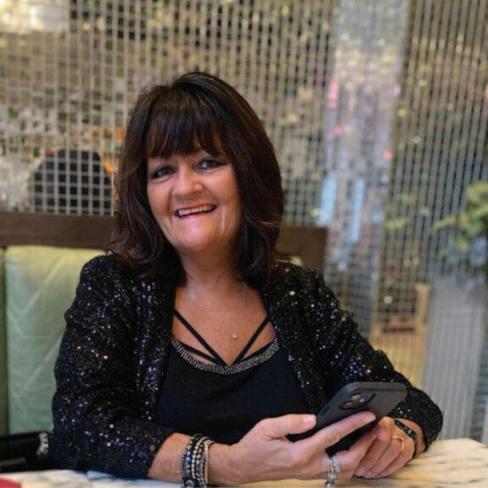
have some laughs with the residents whenever possible. This helped her to find out if they were happy with hospitality standards and food quality, and also gave her a great insight into how they were affected by dementia and disabilities.
Although now retired, Irene has kept up her keen interest in how Barchester continues to grow and in the Foundation’s charity events. By becoming a Barchester Charitable Foundation Trustee, Irene is looking forward to working with and learning from the other trustees to help the Foundation go from strength to strength and to continue to enrich the life of others. Through her role as a Trustee, Irene wants to offer her expertise to enable more people to engage with their local communities in activities of their choice.
Simon McCall, Chairperson of Barchester’s Charitable Foundation and Barchester’s Commercial Director comments: “We are delighted to welcome Irene onto the Barchester Foundation board. We are excited to have her join us and we are certain that her experience and expertise working in the care sector will be hugely beneficial in helping us shape the Foundation’s future.”

A “remarkable couple” are celebrating the 40th anniversary of their pioneering care organisation.
Mario Kreft MBE and his wife, Gill, started in a small way by opening their first care home in 1985 because they couldn’t find anywhere suitable for their own grandparents.
It was housed in a fine, red brick Victorian villa called Gwern Alyn, in Wrexham, where they employed 10 staff to look after 14 residents. Fast forward four decades and they now run nine care homes in Wrexham and Caernarfon where they have a total of 440 beds and employ more than 860 people.
Later this year they will mark another major milestone when they expect to welcome their 6,000th resident.
But the couple revealed it all came about as the result of a sliding doors moment that changed the course of their lives completely. Opening a care home was not necessarily the obvious career move for Mario who was the son of a bear and lion trainer, Franz Kreft, whose mother, Pamela, ran away to the circus to be with him.
But Mario and his then fiancée, Gill, both had elderly grandparents and they were unable to find anywhere for them that met their own high standards.
He said: “I was brought up by my grandparents because my parents were circus artistes and I was looking to go into business after leaving college.
“After looking around, we thought it might be a good idea for us to open our own care home so they could have the standard of care we thought they deserved.
“We very nearly bought a place in Llandudno and we were all geared up with everything in place but the sale fell through.”
Then the finger of fate intervened when Mario went to pay his car insurance in Abergele.
He saw Gwern Alyn being advertised for sale in an estate agent’s window – the date, Thursday, January 3, forever etched in his memory.
The following day he called the estate agent to arrange a viewing on the Sunday and just over a fortnight later they signed and exchanged contracts.
Gill recalled: “We bought it subject to planning and the owner went forward with a planning application to turn it into a residential care home and we took it over in the July.
“We had a lot to do to turn it into a care home to meet the regulations and we opened on December 9 when we welcomed our two first residents, Mrs Evans and Mrs Barlow.”

The following September Gill and Mario were married in a big marquee in the grounds of Gwern Alyn with all 14 of their residents and staff being invited to be among the 200 guests.
Mario’s beloved grandmother, Rene Warburton, had sadly passed away but two of their grandfathers, Fred Warburton, and Bert Smith, were there to celebrate the nuptials.
By then the social care bug had bitten both of them deeply and in 1989 they bought a leafy 12-acre site on Summerhill Road on the outskirts of Wrexham.
It was originally the grounds of a beautiful mansion called Pendine Hall which had burnt down in a devastating fire in 30 years earlier.
They have opened five care homes there, including the first purpose-built nursing home in Wrexham as well as specialist facilities to cater for people with dementia and neurological problems and brain injury.
Along the way they bought Hillbury House, next door to Gwern Alyn, which was already a care home being run by the Sisters of Nazareth. Another major milestone came in 2015 when they opened a state-ofthe-art care home, Bryn Seiont Newydd, on the site of a former hospital in Caernarfon.
It was crowned as the best new care home in the UK at the prestigious Pinders Healthcare Design Awards.
The opera-loving Krefts are both passionate about the arts which have become a “golden thread” running through daily life at all their care homes.
They became the first care organisation in Wales to employ an artist in residence and 30 years later the person they appointed, Sarah
Edwards, is still their working with them as a consultant, along with a musician in residence, a creative practitioner and an army of enrichment co-ordinators.
The couple have also launched the Pendine Arts and Communities Trust which supports a host of community and arts-related activities, including the Llangollen International Musical Eisteddfod where they sponsor the Pendine International Voice of the Future competition and the North Wales International Music Festival where they sponsor the Pendine Young Musician of Wales competition.
Gill, a chartered accountant, also set up the influential Wrexham Business Professionals group to promote regional prosperity and shine a light on the enterprise and expertise that exists in the region.
Meanwhile, Mario has also found time to become a fearless campaigner for the social care sector, founding both Care Forum Wales, which represents around 500 independent providers, and the Wales Care Awards, to recognise frontline care workers.
He says his proudest achievement was receiving the MBE from the late Queen Elizabath II at Buckingham Palace in 2010 in recognition of his contribution to social care in Wales.
Five years later he was honoured in the enterprise category of the St David’s Awards.
Among those congratulating the couple on reaching the momentous milestone was Wrexham’s Member of the Senedd, Lesley Griffiths.
She said: “Congratulations to Mario, Gill and the entire Pendine team on reaching your 40th anniversary.
“It has been an incredible journey for the award-winning organisation and everyone involved deserves great credit.
“For 40 years, Pendine Park has offered a wide choice of specialist services that enrich people’s lives, ensuring they receive the care and respect they deserve, and long may that continue.”
She was joined by Clwyd South MS Ken Skates, who is also the Welsh Government’s Cabinet Secretary for Transport and North Wales.
He said: “Pendine has been a pioneer in the social care sector over the past four decades and it’s testament to Mario and Gill’s innovation, determination and dedication that the company is held in such high regard today. It has also been a crucial employer over its 40 years, providing jobs for hundreds of people in North Wales.
“Mario and Gill are supremely effective champions for the social care sector and the countless awards Pendine has won since 1985 underlines its status as a leading light in the industry. They are a remarkable couple.”

In an industry as vital and challenging as the care sector, having the right communications partner can be the difference between being just another provider and becoming a recognized leader. At DAPS Agency Ltd, we understand the intricacies of the care sector and are uniquely positioned to help organizations like yours achieve exceptional visibility, build trust, and celebrate success. With our deep expertise and proven strategies, we help care providers not only meet their immediate goals but establish long-term reputations as thought leaders in the industry.
A Partner That Understands Your World
At DAPS, we know the care sector isn’t just about providing services—it’s about creating communities, supporting families, and delivering dignity. We recognize the challenges you face every day: driving occupancy, retaining talented staff, building strong stakeholder relationships, and responding effectively to ever-changing regulations. Added to this are industry-specific hurdles such as financial constraints, technology adoption, and navigating complex regulatory landscapes.
DAPS Agency specializes in translating the incredible work you do into compelling stories that resonate with your target audiences. From securing positive media coverage to celebrating milestones within your organization, we ensure your message is heard by the people who matter most. Whether it’s families searching for the perfect care home for a loved one, investors considering innovative care sector technologies, or policymakers shaping the future of social care, we’ll position your organization as a trusted, forward-thinking leader.
THOUGHT LEADERSHIP: YOUR VOICE, AMPLIFIED
We believe that the care sector deserves more champions and fewer misconceptions. Our team at DAPS knows how to position key players in the care industry as authoritative voices in the press and broadcast media. We work with you to identify the stories that set you apart, whether it’s groundbreaking innovations in care delivery, inspiring resident stories, or your commitment to employee well-being. For example, care home groups face mounting pressure to balance
resident care with financial sustainability. By showcasing cost-effective solutions or new approaches to care delivery, we can elevate your reputation and highlight your innovation. Similarly, if you’re a care technology provider, we’ll craft narratives around the life-changing impact of your tools, making it clear how your solutions address real-world challenges in the sector.
Through carefully crafted opinion pieces, insightful white papers, and impactful interviews, we’ll ensure your expertise reaches a wide audience. Our goal is to not only highlight what you do but to frame it within the broader context of the care sector’s most pressing issues, cementing your reputation as a thought leader.
A COMPREHENSIVE COMMUNICATIONS PARTNER
DAPS is not just a public relations agency; we are your end-to-end communications partner. With decades of experience across various disciplines, we bring unparalleled expertise to every project. Our services include:
Media Relations: Running global press offices and securing high-profile coverage that aligns with your goals.
Crisis Communications: Managing sensitive issues with precision and professionalism to protect your reputation.
• Content Creation: Developing engaging content for social media, websites, newsletters, and more to keep your audiences informed and inspired.
• White Papers and Lobbying: Crafting authoritative documents and campaigns that influence policy and stakeholder opinion.
• Stakeholder Relations: Building and maintaining strong relationships with key stakeholders to support your long-term objectives.
For care home groups, this might mean helping you navigate negative media coverage or shaping narratives around resident-focused innovations. For technology providers, we can highlight the real-world impact of your solutions. And for care sector financiers, we can position your role as a critical enabler of growth and innovation.
No matter the challenge, DAPS delivers tailored solutions that drive results. Our ability to pivot across these areas ensures that you’re always prepared and positioned for success.
WHY CHOOSE DAPS AGENCY LTD?
DAPS was founded by Anneli Lort and Firgas Esack, two communications veterans who bring a wealth of experience and passion to the table. Having worked with some of the world’s leading brands and organizations, Anneli and Firgas understand what it takes to cut through the noise and make an impact.
Our unashamedly remote working model means that every penny
you spend goes directly toward securing top-tier results. We don’t carry the overheads of a traditional agency, and because we’re made up of senior professionals only, you can trust that your account will always be handled by experts. This streamlined approach saves you time, money, and ensures consistent excellence.
CELEBRATING THE POSITIVE
In a sector that often grapples with scrutiny, DAPS focuses on creating feel-good coverage that highlights the incredible stories within your organization. For care home groups, this might mean showcasing innovative resident programs or celebrating staff achievements. For care technology providers, it could involve spotlighting the human stories behind your solutions. And for financiers, it’s about demonstrating the positive impact of your investments on care delivery.
We believe that celebrating success is as important as addressing challenges. Whether it’s a heartwarming initiative that brought joy to residents, a new service that’s improving lives, or an award that recognizes your hard work, we’ll make sure these moments receive the recognition they deserve.
Our clients choose DAPS because we deliver:
• Tailored Strategies: Every organization is unique, and we take the time to understand your specific goals and challenges.
• Proven Expertise: With a track record of delivering exceptional results, we’re trusted by clients across industries, including the care sector.
• Proactive Partnership: We don’t just react; we anticipate. Our team stays ahead of trends and opportunities to keep your communications fresh and relevant.
• Human-Centric Approach: At the heart of everything we do is a commitment to authenticity and empathy, ensuring your stories connect with audiences on a deeper level.
YOUR NEXT STEP TOWARD SUCCESS
The care sector is a complex and ever-evolving landscape, but with the right communications partner, you can navigate it with confidence and clarity. DAPS Agency Ltd is here to help you amplify your voice, celebrate your successes, and tackle your challenges head-on. If you’re ready to elevate your brand and make a lasting impact, contact us today. Let’s work together to showcase the incredible work you do and position your organization as a leader in the care sector.
To book a free, no-obligation one hour consultation with DAPS to discuss your communications challenges and needs, go to daps.life/DAPS60 www.dapsagency.com

A North Yorkshire social care company is staging a local demonstration to call for urgent Government reform and is urging other providers to do something similar to support a national day of action. Some staff from Saint Cecilia’s Care Group will gather at its nursing home in Scarborough on 25th February to call on the Government to save social care.
At the same time, Saint Cecilia’s Executive Chairman, Mike Padgham and Director Aaron Padgham will be representing the company and the provider organisation, The Independent Care Group (ICG), at the national day of action in London.
Mike Padgham said: “Across Saint Cecilia’s and the Independent Care Group we are keen to have our voices heard, to support the national day of action and to tell the Government that we have had enough and social care deserves better.
“We hope others across the country will join us in sending a clear message to the Government that we need reform.
“Staff from Saint Cecilia’s Care Group will be gathering at our nursing home on Filey Road, Scarborough whilst Aaron and I join the day of action
in London.
“We will be calling on the Government to properly reform and fund social care so that providers across the country can provide the best services they can for those who need care.
“We are campaigning for social care reform to happen and to happen now, not wait until the results of the commission on social care, which won’t finally report until 2028, which is too long to wait.
“We have already been waiting more than 30 years for reform and cannot wait any longer. The Government cannot fix the NHS without fixing social care first.
“Social care providers have an abundance of experience and expertise and are ready, willing and able to work with the Government to find solutions, all we seek is the opportunity.”
The day of action, organised by Providers Unite, a coalition of social care representatives, will call on the Government to review the impact the proposed increase in Employer’s National Insurance Contributions and rise in the National Living Wage will have on social care.
Campaigners want the Government to make social care exempt from the National Insurance increase or make more funding available to help social care providers meet rising costs.
The nursing home and Saint Cecilia’s Alba Rose Care Home in Pickering are included in a video being used to promote the day of action. The two homes feature in the video for the song, ‘Who Cares? ’released by the ICG. The song has been co-written by iCG Marketing Executive Brian Johnson and performed by co-writer, Ivor Novello-nominated singersongwriter Boo Hewerdine. It is raising money for the Care Workers Charity. The song will be performed live during the day of action.

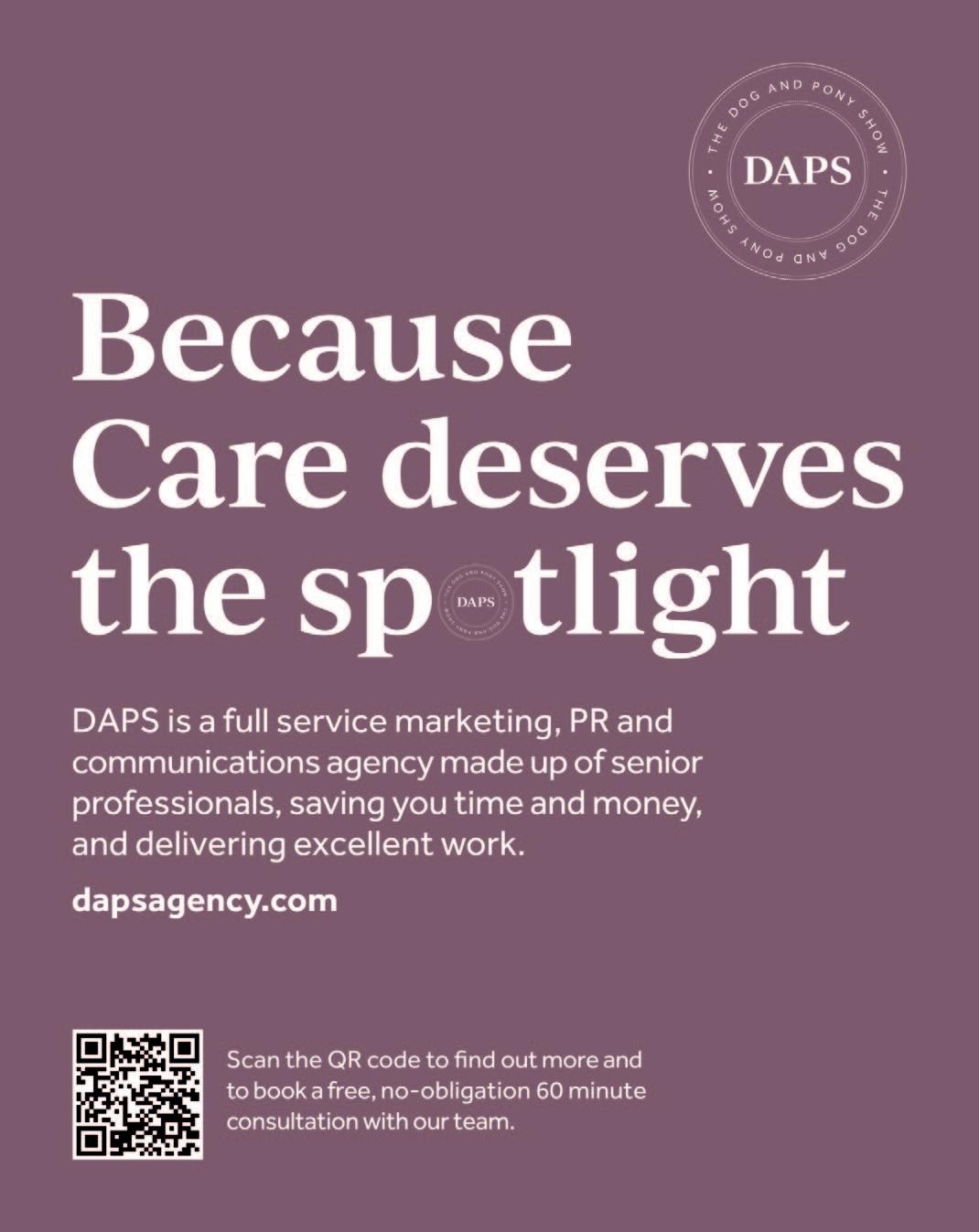





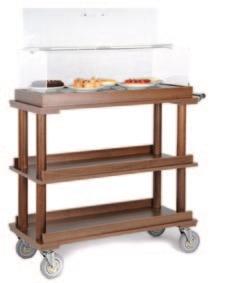

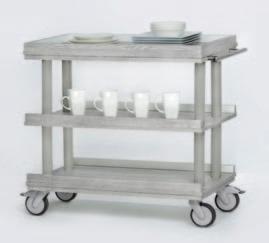

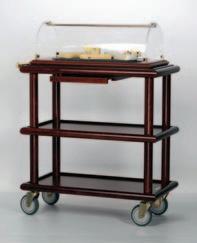


Love knows no age, and for many long-term couples in residential care and nursing homes across the UK, wedding anniversaries remain cherished milestones—especially if they coincide with Valentine’s Day. This year care homes nationwide found thoughtful ways to celebrate enduring love, honouring couples who have spent decades together. These events serve as a touching reminder that romance can flourish at any stage of life.
In the social care sector, where staff work tirelessly to create a warm and inclusive environment, recognising long-term partnerships is more than just a sentimental gesture. Whether it’s a couple marking their golden anniversary or a pair who found new companionship later in life, these occasions offer residents a
JERZY AND MARGARET SNIGORSKI, ORFORD HOUSE, COULSDON

and

It
happy couple tied the knot on 1st October 1966 at St. Dunstan’s Church in Cheam.
PAT AND DAVID GROVE, GOLDEN LODGE CARE HOME, CREWE

Pat and David Grove, both aged 93, celebrated the day in style.
Lewis Chester, Home Manager at HCOne’s Godden Lodge Care Home, said: “It was so lovely and heartwarming to see residents including Mr and Mrs Grove at Godden Lodge Care Home spending quality time together by enjoying a romantic meal together and spreading the love. Seeing the big smiles on their faces made it all worthwhile.”


sense of continuity, connection, and joy. Families, staff, and local communities have come together to make these moments special, demonstrating the profound impact of love and companionship on overall wellbeing. These events not only uplift the couples themselves but also inspire those around them, fostering a sense of warmth and belonging.
This feature offers a glimpse into these touching celebrations, showcasing the joy, devotion, and companionship that continue to thrive in later life and The Carer is pleased to share such inspiring stories.
Many congratulations and thanks to all those who have contributed.
MR AND MRS W, HARGRAVE HOUSE, NR STANSTED

Mr and Mrs W celebrated an incredible 74 years together this Valentine’s Day. The couple met in Guernsey in 1951, following Mr W’s service in the RAF as a flight air traffic controller during World War Two.


Naomi and Richard Sutton celebrated 69 years since their engagement on this very day in 1956. The couple, who will mark their 68th wedding anniversary this April, were treated to an intimate dining experience by the wonderful team to honour their love story.



JOHN AND LIZ FORSYTH, PERSLEY CASTLE CARE HOME, ABERDEEN
Reflecting on their 55 years together, John said: “Liz and I have always been happiest in each other’s company. Whether we’re out for lunch, going for a walk, or just spending time together, we’re as close now as we’ve ever been.”


Olive and Gavin McCrone celebrated their first Valentine’s Day at Glencairn. After 27 years together, the couple made the decision to move into Glencairn to ensure that they could continue sharing life’s special moments side by side.

DORIS AND NORMAN EDWARDS, PRIMROSE HOUSE, CREWE
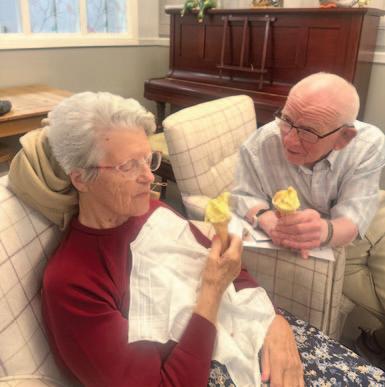
When asked what their secret was to their 69 year long marriage, Norman Edwards, commented: “As soon as I saw Doris I knew I was going to marry her. Our secret to a long and happy marriage is cuddling every day and having respect for one another.”
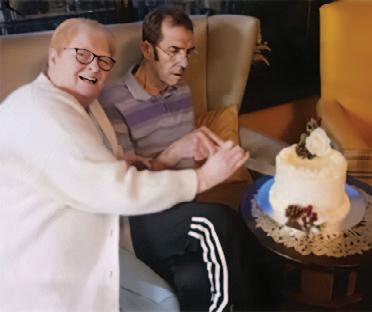

ORDON AND JOAN CILGRAM, DOVE COURT CARE HOME, BURNLEY


Gordon Cilgram, aged 91, and Joan Cilgram, aged 93, shared their pearls of wisdom and advice with fellow residents and colleagues.
When asked what their secret is to a happy marriage, Gordon Cilgram stated: “We’ve had a very happy marriage. We never fall out and love each other very much. The key is communication!”
FRED AND JOYCE HEYWOOD,


When asked what their secret was to a long and happy marriage, Fred and Joyce Heywood, commented: “We did and still do everything together. Our bond of partnership and mutual respect has carried us through the highs and lows of life.”




Chertsey Parklands Manor Care Home marked Valentine’s Day with a heartwarming celebration for four couples living together in the care home.
Each couple shared their personal love story, reflecting the bonds they’ve built over the years.
Natalie Birch, Home Manager of Chertsey Parklands Manor Care Home, commented, “It’s a privilege to create moments like these, where our residents can celebrate the love they share, surrounded by a caring community.”


Marjorie Grantham, aged 93 and Michael Grantham,
and adventure as well
When asked what their secret was to a long and happy marriage, Michael and Marjorie Grantham, commented: “Our secret to a long and happy marriage is being interested in each other and doing nice things together.”
FIVE COUPLES AT PYTCHLEY COURT CARE HOME, IN BRIXWORTH, NORTHAMPTON REVEAL SECRETS OF LONG-LASTING LOVE ON VALENTINE’S DAY

Oscar and Joan Gammons' love story started in Portsmouth in September 1946.
Oscar Gammons said: “The stronghold for a lasting relationship is to keep your head down and come to terms with each other. You should always keep your head down. Women make the decisions while men go along with their choices."

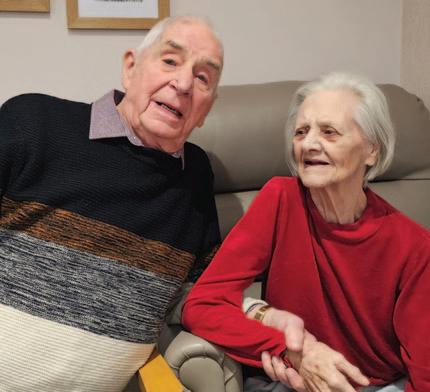
Pytchley Court residents Trevor and Doreen Lane first met at a Village Hall Dance in 1956. After sparking a strong connection, the pair got married in November 1958. Trevor commented: “The stronghold for their lasting relationship is being faithful and no serious arguments.”
Paul and Jody Toomey first met at an 18 and over social group in 1978. The couple subsequently tied the knot in 1985 at St. Peter and Paul’s Church on Abington Park, Northampton.
The couple will celebrate their 40-year strong marriage this year. Paul and Jody have two children and four grandchildren together.
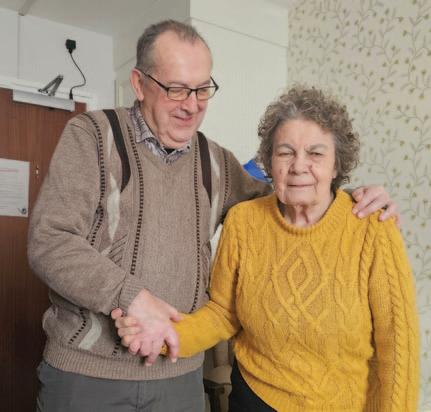
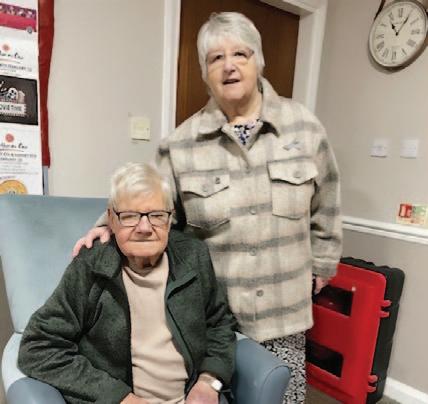
Pytchley Court residents Martyn and Olive White first started their romance at a mid-summer Meadow Fair in Northampton in 1961.
Martyn commented, “The stronghold of our lasting relationship is trust, being kind to each other, and never sleeping on an argument. If you can go to bed thinking about a person you love, and wake up with them still in your thoughts, and you have got no question of doubts, then that's the kick."
Pytchley Court residents Ron and Jayne Knight, who met over Christmas dinner in 1970 and married in 1974, offered candid advice.
Jayne stated: "In relationships you always love your partner, sometimes you don't like them which is allowed. Never expect perfection, and love is worth fighting for."
From swiping right to first date etiquette, residents at a Northamptonshire care home have been getting to grips with how dating has changed over the years – and offering some timeless advice for today’s generation of daters.
With Valentine’s Day driving a surge in searches about love and dating app interest at an all-time high – searches for “exclusive dating app” have surged by 350% in recent weeks, and “neurodivergent dating app” has risen by 250% – the residents at Meadow View care home in Wellingborough got together to take a look at new dating apps, while reminiscing about their own dating history.
Hearing how dating has evolved fascinated Meadow View’s residents, who offered their own takes on love. Jean, soon to be 89, gave some timeless advice for those navigating today’s dating scene: “Always take someone else with you on a first date.” Carl, 68, recalled a simpler time before dating apps: “I’d go to school and think, ‘Oooh, I fancy her,’ and then ask her out – but they mostly said no.”

For 92-year-old Ronald, romance was about the joy of connection. He fondly remembered meeting his late wife: “I asked, ‘Do you fancy a dance?’ and she said yes, so we danced all night. At the end, I said, ‘Thank


Love was in the air and heartfelt messages were exchanged as care homes across the south held festive get-togethers to mark Valentine’s Day.
All 21 homes owned and run by Colten Care in Dorset, Hampshire, West Sussex and Wiltshire joined in the fun of the annual celebration of love.
At Brook View in West Moors, Dorset, husband and wife residents Pam and Trevor Clark shared the romantic limelight with a married couple among their care team, Healthcare Assistants Shadreck and Laetitia Rushambha.
Both couples were presented with surprise gifts of flowers and chocolates during a pink-and-redthemed community Tea & Togetherness afternoon.
Dorset couple Pam and Trevor, who have been married for 58 years, lived in Ringwood and Wimborne before retiring to nearby St Ives.
Pam said they had never especially celebrated Valentine’s until they both moved to Brook View three years ago.
“We’ve made up for it now,” she added. “Everyone pushed the boat out this year and we had a very happy occasion. The dining room was decorated with traditional red roses and pink balloons. It was beautiful.”
After witnessing Trevor putting a rose between his teeth, Pam was even heard to joke with carers: “I think it’s the most romantic thing he’s ever done.”
Adding to the romance of the occasion was visiting singer Bee Chumley who performed a selection of 50s and 60s love songs.
Companion Rebecca Grimsey said: “We all shared the love at Brook View and relished the friendly com-
you very much. Can I have another dance sometime?’ and she said, ‘Whenever you want.’”
Their reminiscing and first time looking at modern dating apps was captured in heartwarming and humourous videos, designed to bridge generations and sees residents share their dating experiences; from handwritten love letters and dance hall romances to today’s world of swiping and ‘meet cutes’.
While today’s top trending love questions include “How to start a love letter?” and “What is the symbol for unconditional love?”, the residents reflected on the lost art of putting pen to paper. Ronald shared that even decades later, his love for his wife remains unwavering: “I still send her cards each year.”
With online searches revealing a growing curiosity about love and relationships – ranging from “How to stop overthinking in a relationship?” to “What does punching mean in a relationship?”, Meadow View’s residents offered a final piece of wisdom. When asked how to know if you’re in love, Ronald advised: “Everyone’s got a viewpoint. Accept their view. Don’t always think you’re right, and they’re always wrong.”
See the videos at https://vimeo.com/1055272171 and https://vimeo.com/manage/videos/1055551808
munity atmosphere
“To top it off, our chef Jack Wood baked and served a beautiful cake which delighted our residents and guests.”
At Amberwood House in Ferndown, the Valentine’s focus was on heartwarming connections between young and not so young as the children of team members presented roses to residents.
Each flower carried a message about love or friendship. One read: ‘Life is best when it’s got plenty of good friends and great adventures’.
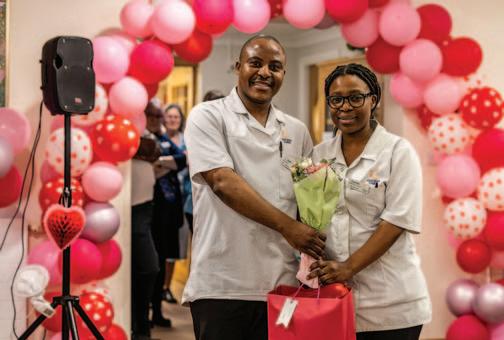
Companion Kirsty Richmond Cole said: “Gifting the flowers was a small gesture but a touching way to remind our residents how loved and valued they are. The children’s presence filled the room with smiles, laughter, kindness and togetherness.”
Among Valentine’s celebrations at other Colten Care homes, two resident couples at Bourne View in Poole, June and Keith Osborne and Margaret and John Taylor, were presented with flowers and chocolates during morning coffee.
At The Aldbury, a dedicated dementia care home in Poole, residents created a heart-shaped artwork adorned with written messages about love and friendship.
A ‘picnic on the love bus’ was on offer for residents at Abbey View in Sherborne courtesy of a minibus trip to the Bulbarrow Hill viewpoint overlooking the Blackmore Vale.
And there were Valentine’s-themed lunches, afternoon teas and other events at homes such as Castle View in Poundbury, Newstone House in Sturminster Newton, Kingfishers in New Milton and Whitecliffe House in Blandford.

Care home residents across the UK have shared their ultimate relationship advice to celebrate Valentine's Day 2025 (14th February).
Online Care Finder Lottie has analysed the most frequently asked questions across online relationship advice forums to uncover the nation's most common relationship dilemmas. To help solve these, care home residents across the UK have partnered with Lottie as Agony Aunts and Uncles, sharing their hilarious and heartwarming wisdom for lasting love. With An Average Age of 82, Care Home Residents Answer The UK’s Most Asked Dating Dilemmas in 2025: How Should I Act On A First Date?
Lottie’s analysis revealed that first date etiquette is the UK’s most frequently asked dating dilemma, with over 200,000 online searches for ‘first date advice’ in the last 12 months.
When it comes to paying for the bill, 96-year-old Eileen, a resident at Beaconsfield Heights Care Home(part of Avery Healthcare), believes that “the gentleman should always pay on a first date”. While 87-year-old Peter (resident at Woodlands Care Home) warns “Stay away from women; they cost you a fortune”. Many older generations share the importance of enjoying yourself on a first date. 85-year-old Pat (resident at Bridge Manor Care Home, part of Avery Healthcare) shares before going on a first date “make sure you fancy them!”.
Residents at Eden Manor Care Home believe that a nice dinner makes the perfect first date, 78-year-old Philip shares “go for a nice meal and enjoy a bottle of red”.
First dates can be daunting. However, 78-year-old Joan (a resident at Anson Court Care Home) shares that dates are all about getting to know the other person. “You should make conversation, ask them questions.”
96-year-old Betty (resident at Shoemaker Place Care Home) jokingly shares “wear your clean knickers, if you’re lucky”.
Norman and Betty (91-years-old) have been married for 66 years and now live together at Blossomfield Rose Care Home in Solihull. Norman shares the secret to keeping your wife happy is down to 3 simple rules: “hold hands, buy the lady some flowers and ALWAYS show respect for their age.”
Residents at Droitwich Mews Care Home (part of Avery Healthcare) have more humorous advice to share with younger generations when it comes to keeping the spark alive, believing absence makes the heart grow fonder. 91-year-old Dougie shares “sometimes distance is best for keeping your wife happy”.
How do I stop nagging my husband to help with the housework?
It’s no surprise that one of the most common relationship dilemmas are linked to housework and sharing responsibility for everyday chores.
When asked how you can get your husband to help with the housework, 76-year-old Sue (resident at Woodlands Care Home) advises younger generations should “just ask him. I’m sure he would help!”.

96-year-old Jean (resident at Austin Rose Care Home) shares “as a couple you should share everything”. She advises younger generations communication is key “talk to one another and be honest” this will make it easier to split the workload.
How Do I Avoid Arguing With My Partner?
Lottie’s research has found almost 3,000 online forum queries for advice when it comes to managing a disagreement with your partner, including setting boundaries and managing relationships with your in-laws. Residents at Studley Rose Care Home, Jeff (96-years-old) and Madge (94-years-old) have been married for 74 years. Madge shares that the ultimate trick to managing any disagreement with your partner is “letting him think he is always right.”
92-year-old Geraldine, a resident at Cheriton Care Home in Dorchester, met her husband Geoff when she was eighteen years old. She shared that Geoff was “my first and last boyfriend.”
Geraldine’s advice for managing conflict is “when you start to bicker, you need to calm the situation down straight away. You’ve got to say, that’s enough, ‘we’ll talk about it later”. By following these simple steps Geraldine shares “the argument goes away.”
Registrations are now open for Championing Social Care’s leading engagement event, Care Home Open Week. Running from 16-22 June 2025 the popular event aims to shine a positive light on the phenomenal work of the care sector by encouraging care homes across the UK to open their doors to the public, and showcase them as being warm, friendly places open for visitors.
Care Home Open Week will be supported again by Championing Social Care’s epic Great British Care Cycle Relay, which promotes community connections and the importance of care and wellbeing. In a change to previous years, the Great British Care Cycle Relay will take place a week ahead of Care Home Open Week, 12-16 June. The new format relay will cover approximately 500km in total via five individual day-long cycle relays around different UK regions: Edinburgh, Wales, York, East Midlands and London.
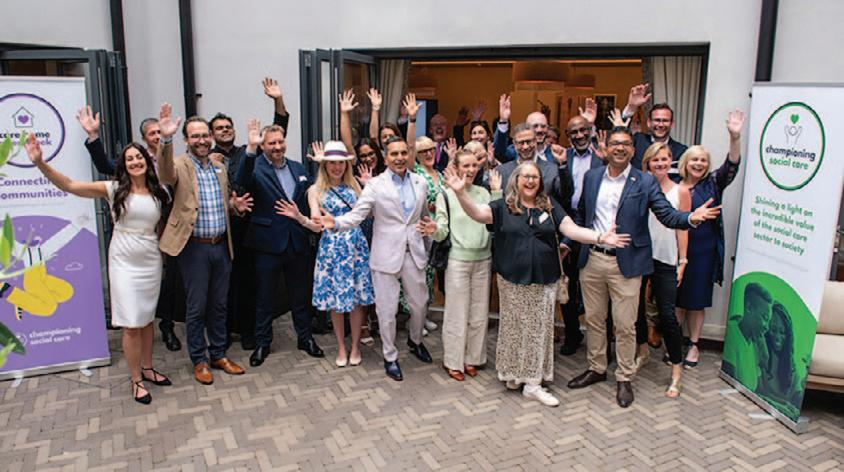
Each day’s cycling route will call in at different care homes along the way, promoting the incredible care services at the heart of every community. The cycle relay will end in London at the high profile launch event for Care Home Open Week. Registrations are open now for cyclists to take part, with each day’s route covering a distance of 100km. There is no fee or fundraising target and cycling enthusiasts are encouraged to sign up via the Championing Social Care website. Championing Social Care has partnered this year with The Utley Foundation’s Music for Dementia campaign for a ‘Power of Music’ theme.
The partnership will span a range of joint initiatives, including a mini newspaper postal mailer packed with ideas for fun and inclusive musical activities designed to help care staff use music as part of their daily care, and a limited number of free tickets for care staff to a nationwide tour of Matt Seager’s award-winning play about dementia, In Other Words.
Under the ‘Power of Music’ theme there will be a Big Music Quiz with downloadable resources including picture rounds, music clips and musical bingo. Care homes can also look forward to free Sing-a-long sessions running three times a day on m4dRadio.com, Music for Dementia’s free online radio station. This year, Care Home Open Week is also teaming up with the Glad to Care campaign. Glad to Care is a
week of fun activities for care services to access. Activity resources from Glad to Care and Care Home Open Week will be available for care homes to download once they have registered to take part in Care Home Open Week via the Championing Social Care website.
Last year saw over 5,500 care services take part in Care Home Open Week, which represents around a third of the total number of homes in the country. It is hoped this year’s event will have even higher participation from care services, communities and government ministers.
Mitesh Dhanak, board member of Championing Social Care and chair of the Care Home Open Week committee says: “Care Home Open Week is a fantastic opportunity to reposition the care sector in the public’s mind. The negative news agenda contrasts with the fantastic work being delivered by the care sector on a daily basis. Care Home Open Week is an opportunity to invite local communities in to experience what warm, friendly and inviting spaces care homes are, and see for themselves the high standard of care our inspiring workforce deliver.”
Sarah Metcalfe, MD at Music for Dementia says: “Music for Dementia has long admired the spirit and ethos of Championing Social Care and its Care Home Open Week event. Its mission feels closely aligned with our own ambition to make music an integral part of dementia care, as a way to support care staff deliver person-centred care and build strong communities within care homes.”
“We know that music can bring a care home alive, and we hope this year’s power of music theme will encourage care staff around the UK to give it a go.”
Mitesh continues: “We’ve made a few changes to how we’ve scheduled Care Home Open Week and the Great British Care Cycle Relay events this year to enable more people to take part.
We’ve shifted the dates earlier in June, so we don’t clash with Scotland’s Summer holidays, and by covering five different parts of the UK we’re able to open up our monumental cycle relay to more participants. What are you waiting for? Sign up today!”
www.championingsocialcare.org.uk/care-home-open-week/register/
On Friday 14th February, Camberley Manor care home, in Deepcut Surrey, hosted its 7th Annual Golden Rose Awards, a special event to celebrate the remarkable accomplishments of its residents over the past year.
Held during Love and Friendship Week, the Golden Rose Awards have become a cherished tradition at the home. This year’s ceremony was co-hosted by the leadership team and invited residents’ loved ones to join in the celebration, making it a truly memorable occasion.
Awards presented during the event included ‘The Big Cheese,’ ‘Scrabble Champion,’ ‘Heart of the Game,’ ‘Wine Connoisseur,’ ‘Most Inspirational,’ and ‘Distinguished Gentleman.’ The winners were kept a surprise until the moment of the reveal, where each recipient was presented with a certificate and the presti-
gious Golden Rose Award.
One relative of an award winner shared their gratitude, saying, “My mum was so happy and excited about receiving her award, and it was heartwarming to see how pleased and joyful all the other recipients were too. We thoroughly enjoyed the afternoon.
A big thank you to you and the wonderful team at Camberley Manor.” Girlie Braga, Home Manager at Camberley Manor, expressed her excitement about the event, stating, “This was my second time hosting the Golden Rose Ceremony, and it’s an event that we all look forward to each year. Celebrating our residents’ achievements, their unique stories, and their fun personalities is something we truly cherish. Congratulations to all our 2025 winners!”
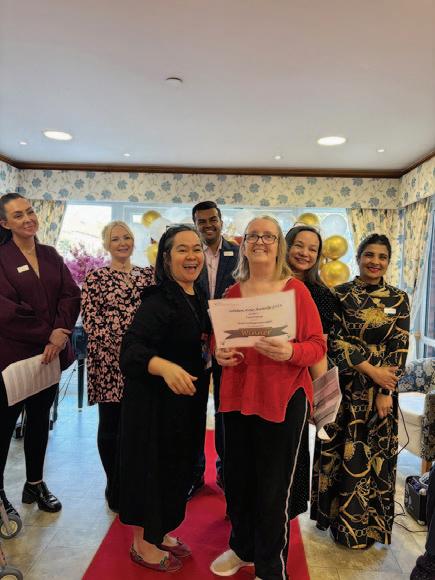
UK Care Week is an event exclusively for care professionals, designed to empower and equip you with the skills to enhance the lives of those in care. This event provides a vital platform to explore industry-leading content, innovative solutions, and hands-on product demonstrations.
With 100+ CPD-accredited sessions, innovative products from 150+ top suppliers, and tailored guidance at the CQC Inspector Hub, you’ll find resources to meet the highest standards. Dive into interactive features like the Virtual Dementia Tour and expert-led training to elevate care.
WHAT’S ON THE AGENDA?
The event features an impressive lineup of sessions, workshops, and opportunities to engage with the latest developments in the care sector. Key highlights include:
THE CARING VIEW THEATRE

Hosted by the passionate team behind the Caring View Podcast, this theatre promises engaging discussions and insights into the latest care practices and strategies. Meet over 150 exhibitors showcasing solutions designed to stimulate business growth and help implement sustainable care models. Discover cutting-edge technologies and practical tools to elevate your care services.
Attend interactive seminars hosted by industry experts. These sessions tackle real-world challenges in care settings and offer actionable solutions to overcome them. Gain up to 12 CPD points across 2 days. CQC INSPECTOR HUB Book a 1-2-1 meeting with
able to answer any queries, as well as dealing with registration advice.
Gain access to additional CPD sessions and resources through co-located events, including The Alzheimer’s & Dementia Show, Neuro Convention, and Naidex. These events create a collaborative environment that unites aspects of health, social care, rehabilitation, inclusion, and diversity.
EXCLUSIVE TRAINING OPPORTUNITIES
In partnership with Training2Care, co-located event The Alzheimer’s & Dementia Show offers unique experiential training sessions tailored to dementia care:
• Virtual Dementia Tour: £60 + VAT per session
• Dementia Interpreters Workshop: £45 + VAT per session
• DIET, Dining Immersive Experiential Training: £60 + VAT per session
• Autism Reality Experience: £60 + VAT per session Spaces for these sessions are limited, so early booking is highly recommended. Uk Care Week visitors can book onto these sessions via the Alzheimer’s & Dementia Show website - www.alzheimersshow.co.uk/train-

HC-One has become the first care organisation to sign the Dying to Work Voluntary Charter aimed at helping employees who become terminally ill at work.
With the support of HC-One’s recognised union, the GMB, HC-One signed the Charter on Wednesday, February 12, at its Aspen Court Care Home, in Poplar, East London, joining a growing list of employers committed to supporting employees diagnosed with terminal illnesses, including high-profile companies such as Rolls Royce, Royal Mail, and the Co-operative.
The Charter is part of the TUC’s Dying to Work campaign, a movement aimed at ensuring greater job security for terminally ill workers and protecting them from being dismissed due to their condition. The Dying to Work campaign was taken forward by Jacci Woodcook, an area sales manager from Derbyshire who was forced out of her job after being diagnosed with terminal breast cancer.
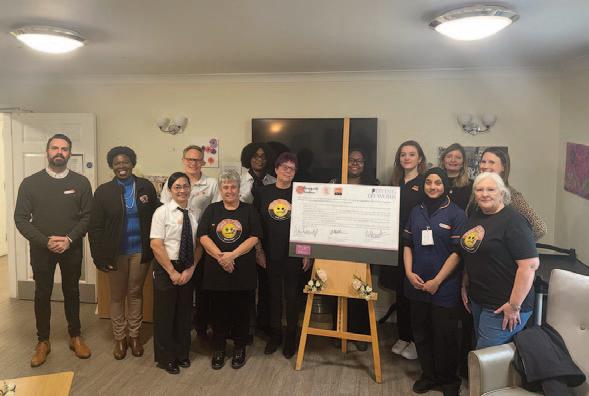
The Dying to Work campaign seeks to ensure that no one faces the added distress of losing their livelihood during one of the most difficult times in their life. The signing of the voluntary Charter aims to prevent cases like Jacci’s happening in the future.
In line with the Charter, HC-One already offers protections to colleagues with a terminal illness but by signing the Dying to Work Charter, HC-One is proud to publicly declare its commitment to supporting colleagues with a terminal diagnosis.
Present at the Charter signing were James Tugendhat, Chief Executive of HC-One who signed the charter, along with James Morrissey, People Director at HC-One. They were joined by representatives of the GMB including Natalie Grayson, National Care Organiser, three HC-One colleagues who also operate as members of the GMB National Committee, and Abigail Hunt, TUC’s Policy Officer and National Social Care Lead.
James Tugendhat, HC-One’s Chief Executive, stated:
“At HC-One, we’re committed to fostering a supportive and compassionate environment for our colleagues, especially in their most difficult times. By signing the Dying to Work Voluntary Charter, we reaffirm our dedication to standing by our colleagues who are terminally ill, and ensuring they have the security and dignity they deserve, no matter their circumstances.”
Natalie Grayson, GMB National Care Organiser, said:
“No worker should face losing their job simply because they’ve received the worst news imaginable. HC-One are the first care company to sign up to this charter, which shows the power of recognising a trade union like GMB in the workplace.”
“Listening to your workers’ trade union voice means that care workers – who do a vital role for the most vulnerable in society – get the protections they deserve.”
The Dying to Work campaign wants to see terminal illness recognised as a ‘protected characteristic’ so that an employee with a terminal illness can enjoy a ‘protected period’ and not be dismissed due to their condition and any death in service benefit protected for the loved ones they leave behind.
Chartwell House Care Home in Broadstairs marked its second anniversary on Saturday 1st February 2025 with a vibrant 'Greatest Showman' themed afternoon that brought residents, families, and members of the local community together for an unforgettable experience. Around 200 guests enjoyed an exciting lineup of entertainment designed to captivate all ages. Heather and Kristina from Phases Pole & Aerial Studio kicked off the festivities with an awe-inspiring aerial performance that blended strength and elegance. Next, Philip and his dance troupe from Quigley Theatre Arts wowed the audience with dynamic, high-energy routines that brought the showmanship theme to life. Cheyenne’s introduction of Sid the snake fascinated onlookers, keen to see the exotic creature up close.

The entertainment continued with Audrey Rose dazzling the crowd through her expert hooping skills, while Hollie added light-hearted fun with her juggling act, keeping everyone engaged with her playful precision. Throughout the event, Rob Scott amazed guests with his mind-bending illusions, sparking wonder and curiosity. Finally, Laura's powerful vocals brought the afternoon to a rousing close, as her performance echoed through the room with showstopping flair.
TWO YEARS OF
Since opening in 2023, Chartwell House has become a cornerstone of care and support in the Broadstairs community. The home has been recognised for its excellence, earning several prestigious accolades. These include being finalists for 'Residential Care Team of the Year' at the Kent Care Awards and 'Most Inspiring Dementia Care Provider' at the Dementia Friendly Kent Awards. The team also received a Highly Commended recognition at the 2024 National Activity Awards for their innovative Life Enrichment Program and has achieved a perfect 10 score on carehome.co.uk. Beyond awards, Chartwell House has built lasting relationships in the community. Initiatives such as the
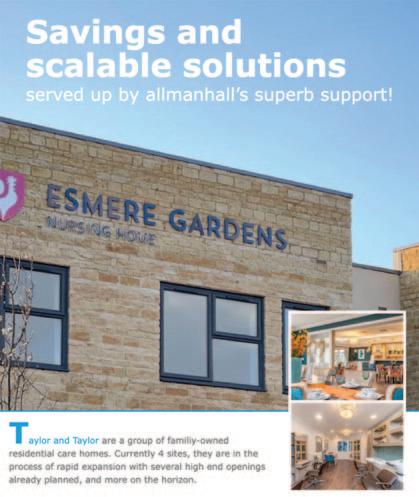
Taylor & Taylor, a group of family-owned residential care homes approached food procurement experts, allmanhall to achieve scalable cost savings and efficiencies to support their growth plans. They needed to ensure no detrimental impact to the excellent quality of their food offering and their residents’ dining pleasure.
Their desire was to achieve a 5% food cost saving and to ensure ongoing effective management of catering budgets and invoicing. Operationally, access to reports and insights were key, as was ease of ordering and management of stock and deliveries.
allmanhall undertook a like-for-like benchmark and identified achievable food cost savings of 11.4% - more than double the initial objective!
allmanhall delivered tech demos of the catering control platform for Taylor and Taylor, ensuring it met their needs and provided training for the team. As well as providing useful operational functionality like stock taking and standing orders, the catering control platform proposed would also give access to management reports and facilitate central billing and conversion of all supplier invoices in to 1 per month. Samples and on-site supplier meetings were also arranged on behalf of the homes, to confirm that the quality was to the required standard. allmanhall have also supported Taylor and Taylor with the launch of a community engagement event for one of their newest homes.
to making a difference. Regular intergenerational sessions with local schools have also fostered strong connections and opportunities for mutual learning.
Reflecting on this milestone, Diane Collins, Home Manager at Chartwell House, said: "We are incredibly proud of how far we’ve come in just two years. Our focus has always been on building a loving, family-oriented environment where residents feel safe, valued, and connected. Today’s celebration is a testament to the strong bonds between our team, residents, and their families. Seeing everyone come together with such joy and warmth was truly inspiring." Jude Coveney, Admissions Manager, emphasised the importance of relationships within the home: "The heart of Chartwell House is the community we’ve created. It’s not just about care; it’s about fostering real connections with residents, their families, and the local area. Over the past two years, we’ve seen how this sense of belonging enriches lives. Events like this one show the impact of those relationships, bringing people together in meaningful ways."
Ameet Kotecha, Founder and Managing Director of Boutique Care Homes, shared his vision for the care home: "Chartwell House represents everything we strive for across our care homes – a warm, welcoming place where people genuinely feel at home. We are committed to empowering residents to live fulfilling, enriched lives while strengthening ties to the wider community. Reaching this milestone with such a vibrant and successful celebration reflects the dedication of our team and the positive culture they’ve nurtured."
The event embodied Chartwell House's commitment to creating joyful moments and fostering a deep sense of connection, staying true to Boutique Care Homes' philosophy of providing high-quality, personalised care in a lively, nurturing environment.
A few months into the contract, the actual results were found to be an 18% food cost saving! You can watch this short video on You Tube to find out more…
“From day 1, the care and attention provided by allmanhall has been exceptional. The team truly listen to us, to what our challenges are and are always willing to help in any way they can. Their approach is thorough and responsive, meaning we feel fully supported. Everyone we’ve met from allmanhall has been hands-on, down to earth, genuine and considerate.
I’ve been impressed by the savings we’ve already seen, the flexibility regarding suppliers and by the excellent quality. The consolidation of invoices into 1 per month is a huge win.
We have relationships and contact with people across the allmanhall team – all there to help and to advise or resolve depending on what we need. With challenges around labour shortages and food inflation, this is hugely valued. It frees up the team and gives us peace of mind.
I would wholeheartedly recommend allmanhall’s services to others in the care sector and I look forward to continuing to grow our offering and provide outstanding food for our residents, with allmanhall as our trusted partners.”
– Chris Rees, Group Executive Chef
allmanhall is an owner-managed, award-winning and trusted food procurement partner for care organisations across the UK. We help clients with a range of needs, including cost savings, administrative efficiencies, supplier management, dietetics and nutrition support, and sustainability goals. Get in touch to find out more:
Email: hello@allmanhall.co.uk
Telephone: 01225 745520
Website: allmanhall.co.uk
LinkedIn: @allmanhall
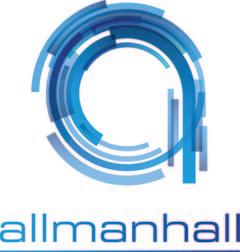

The NHS is urging around 1.3 million older people who have not yet had the respiratory syncytial virus vaccine to get jabbed, as health service chiefs warn it is “not just a winter illness”.
Invites are being sent this week to people not yet vaccinated against RSV who are aged 75-79 or turned 80 after 1 September 2024, encouraging them to book an appointment with their GP. RSV spreads all year round and affects the airways and lungs, and for older adults can lead to severe lung infections like pneumonia or other life-threatening conditions.
On 1 September, the NHS started vaccinating people against RSV for the first time in its history and staff across the country have been working hard since then to reach as many eligible people as possible – with nearly 1.5 million getting the vaccine, including more than 1.3 million aged 75-80. The vaccine will reduce the risk of severe symptoms and only one dose is needed.
A study in the Lancet found the first season of vaccination could prevent up to 2,500 hospital admissions, 15,000 GP visits and 60,000 RSV illnesses in older adults.
Pregnant women are also eligible for the vaccine from 28 weeks onwards, as RSV is a leading cause of infant mortality, with nearly 150,000 women being vaccinated since September. Women can speak to their maternity service or GP practice.
The NHS has also delivered 18.4 million flu vaccinations this winter, and 9.8 million COVID-19 jabs. Steve Russell, NHS National Director for Vaccinations and Screening, said: “RSV is not just a winter illness. We see cases increase in winter but it can occur all year round and can make older people seriously ill, so it is vital everyone eligible gets vaccinated – which is why are now working hard to reach anyone who hasn’t yet been jabbed and urging them to book an appointment.
“Vaccines for RSV, COVID-19 and flu protect you against different respiratory infections so it’s important you have each vaccine when you are offered them.
“I would encourage everyone we contact in the coming days, or anyone who has previously been invited but hasn’t yet taken up the offer, to get the RSV vaccine as soon as possible by contacting your GP. It could prevent you developing a severe illness like pneumonia and even save your life”.
Dr Conall Watson, Consultant Epidemiologist, UK Health Security Agency, said: “RSV can be severe in older people, causing serious lung infections like pneumonia and flare-ups of existing conditions. If you’re eligible, there is good evidence it will help give you protection – speak with your GP practice about getting the jab”.
A leading stroke specialist at the Royal Devon University Healthcare NHS Foundation Trust has been honoured for his outstanding contribution to stroke research.
Professor Martin James received the Outstanding Achievement Award at the UK Stroke Forum in December 2024 for his work in improving stroke treatments over the past 25 years.
A Consultant Stroke Physician and Honorary Clinical Professor at the University of Exeter Medical School, Professor James has been at the forefront of advancing stroke care throughout his career. His recent work includes working with stroke colleagues across 100 UK hospitals to run a £2M research study that is set to enhance stroke care globally.
The OPTIMAS trial will improve stroke treatment by finding the best time to start anti-clotting drugs for patients who have strokes due to a heart condition known as atrial fibrillation. This research, published in the leading medical journal The Lancet, was funded by the British Heart Foundation and led by University College London.
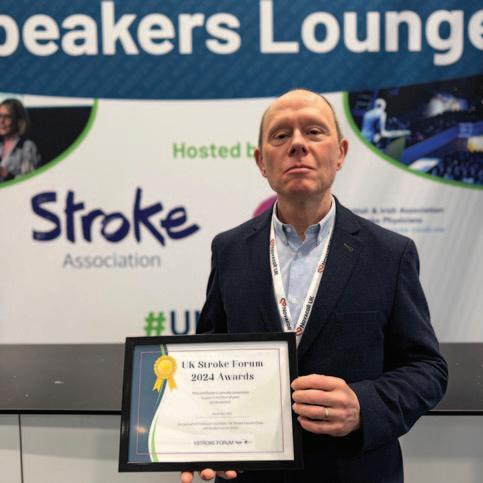
Professor James’ work also focuses on using cutting-edge technology to improve stroke care. He is currently involved in ground-breaking research using AI and machine learning to help doctors identify which stroke patients are most likely to benefit from thrombolysis, a treatment that can greatly reduce disability when given early.
Funded by the National Institute of Health and Care Research (NIHR), this £1.7M research programme is a collaboration between the Royal Devon and the NIHR Applied Research Collaboration South West
Peninsula (PenARC). It is the first example in the world of AI becoming a regular part of a national stroke audit. This innovation will help hospitals adjust thrombolysis treatment to better meet the needs of their local communities.
Professor Adrian Harris, Chief Medical Officer for the Royal Devon, said: “We are delighted that Professor James’s continuous dedication to improving the lives of people with stroke has been recognised nationally, and we are very proud of his achievements. Since starting as a Consultant Physician in Stroke, General, and Geriatric Medicine at Royal Devon in 1997, he has made a significant contribution to research locally, regionally, nationally and internationally."
"His pioneering work has led to better outcomes for stroke patients, and we are excited about the AI project’s potential to drive even greater improvements in care. As a research-led Trust, we are committed to embedding research into the care we provide, and Professor James’s work is a shining example of what we strive to achieve.”
Professor Martin James said: “I am honoured to receive this recognition from the UK stroke community. Stroke has a profound impact on patients and families, and on society, so it is immensely rewarding to see how research can drive advancements in stroke treatment and improve outcomes for patients.
“I would like to thank my colleagues at the Royal Devon, the University of Exeter, and at the national stroke audit, as well as people with stroke who have worked so closely with us in our research. I am particularly excited about the potential of AI to make stroke care more personalised and effective, ensuring that every stroke patient gets the best available treatment as quickly as possible.”
If you’re involved in caring for others – whether you’re a care provider, a health and social care professional seeking the latest products and services, a family carer in need of support, or simply someone passionate about care – the Alzheimer’s & Dementia Show is the event for you.
As the UK’s leading dementia event, it offers a unique opportunity to explore a wide range of care exhibitors, hear from expert speakers, and experience innovative training sessions. This event is more than just an exhibition; it’s a platform for learning, discovering solutions, and connecting with people who share a commitment to improving dementia care.
Taking place at the NEC in Birmingham on 19-20 March 2025, the Alzheimer’s and Dementia Show provides a vital space for families, carers and healthcare professionals to access resources and knowledge that can transform the lives of those affected by dementia.
WHAT’S ON THE AGENDA?

The show is packed with insightful sessions designed to address key aspects of dementia care. Discover the latest diagnostic tools and treatment options that are revolutionising early intervention and improving patient outcomes!
CAREGIVER SUPPORT AND EDUCATION
Access practical strategies and resources that empower caregivers to provide compassionate and effective care, ensuring the well-being of those they look after.
DEMENTIA-FRIENDLY ENVIRONMENTS
Learn about innovative designs and technologies that create safer, more comfortable living spaces for individuals living with dementia.
WHY ATTEND?
For those seeking specialised training, the show offers sessions delivered by Training2Care. These experiential programs provide actionable insights tailored to dementia care. Sessions include:
Virtual Dementia Tour: £60 + VAT per session
Dementia Interpreters Workshop: £45 + VAT per session
Dining Immersive Experiential Training (DIET): £60 + VAT per session
• Autism Reality Experience: £60 + VAT per session
Spaces are limited, so early booking is highly recommended. Book your space here - www.alzheimersshow.co.uk/training.
EXPERT-LED SESSIONS
Gain insights from top researchers, clinicians, and advocates. Key speakers include:
• Prof Fiona Ducotterd "Putting tools in the toolbox to treat dementia." Chief Scientific Officer, Alzheimer’s Research UK, UCL Drug Discovery Institute
• Hannah Gardner "Supporting children and young people living within families affected by dementia." Consultant Admiral Nurse for Children and Young People, Dementia UK
• Prof Nathan Davies "Supporting people living with dementia through to end of life" Professor of Ageing, Applied Health and Care Research, Co-lead Centre for Psychiatry and Mental Health, Queen Mary University of London
DEMENTIA CLINICS WITH ADMIRAL NURSES
1-TO-1
For personalized advice and support, visit Dementia UK’s Admiral Nurses. These 1-to-1 clinics provide tailored guidance to address your specific questions and concerns.
NETWORKING OPPORTUNITIES
Connect with a diverse community of caregivers, healthcare professionals, and innovators. Share experiences, exchange ideas, and build valuable relationships within the dementia care sector.
EXHIBITOR HIGHLIGHTS
Explore an extensive range of exhibitors showcasing products and services designed to enhance the quality of life for individuals living with dementia. From cutting-edge technologies to practical caregiving tools, find innovative solutions to meet your needs.
DON’T MISS OUT!
Running alongside UK Care Week, Naidex, and the Neuro Convention, the Alzheimer’s and Dementia Show unites interconnected aspects of health, social care, rehabilitation, inclusion, and diversity. This collaborative environment provides a comprehensive look at the broader care community. Find out more - www.alzheimersshow.co.uk


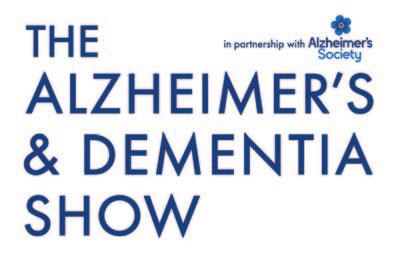





New survey insights reveal the far-reaching impact caregiving can have on physical and mental well-being, with over half (54%) of caregivers reporting weekly back, joint or muscle pain, and 1 in 5 (19%) experiencing daily stress or anxiety.[i] Dr Dawn Harper shares her tips to help cope.
There are approximately 4.7 million unpaid carers in the UK,[ii] defined as those who provide unpaid care for someone who is ill, disabled, older, has mental health issues or struggles with addiction. However, this figure excludes the many who regularly care for children, neighbours or friends and family needing support beyond the traditional definitions. Carers UK estimates that the number of unpaid carers could be as high as 10.6 million, highlighting a significant lack of personal and societal recognition of what it truly means to provide care.[iii]
A new survey, commissioned by GOPO® Joint Health – a leading supplement proven to reduce pain and stiffness and improve mobility – polled 1,001 self-defined caregivers. The findings reveal the true impact of caregiving on mental, emotional and physical health. Over one-third (37%) have experienced significant strain, discomfort or injury to their joints as a result of assisting or lifting the person they care for, and almost half (47%) frequently endure persistent aches, stiffness or pain that lingers long after caregiving tasks.i As a result, one-third (32%) rely heavily on pain medication, putting their own long-term health at risk.
The mental toll of caregiving is profound, with almost half (46%) of caregivers feeling emotionally drained by the relentless stress it brings. One in seven (13%) rely on support services for their well-being, while nearly half (44%) experience loneliness or isolation at least once a week, often facing the demands of caregiving alone.

Despite these challenges, almost half (49%) of respondents cannot remember the last time they practiced self-care, admitting that their own needs always come last.i While caregivers devote themselves to others, acknowledging the importance of self-care, and setting aside time for their own well-being is vital.
Dr Dawn Harper, formerly a caregiver to her mother, NHS doctor for over 30 years and author of ‘Live Well to 101’, comments: “Caregiving is a labour of love, but the selfless nature of the role puts many caregivers at serious risk of poor health. As a GP I see first-hand the impact that caring can have on both physical and mental ill health. To continue supporting others, it’s vital to care for yourself first. Just like the safety advice on an aeroplane – put on your own oxygen mask before helping others. Prioritising your own wellbeing ensures you have the strength, resilience and capacity to provide the care your loved ones need in the long-term.”
Dr Dawn Harper provides her top tips to support caregivers’ health and well-being: Seek support from peers: “It can be easy to lose your identity when providing care, so it’s important to connect with peers who are in a similar situation. If you are unable to leave the house often, online forums or virtual coffee sessions can provide an outlet to enable you to open up to someone who understands exactly what you’re going through. Their acceptance and understanding can be a great way to support your emotional health and leave you feeling less alone.”
Schedule self-care: “Caregiving often leaves little time for personal well-being, but self-care isn’t a luxury, it’s a necessity. Schedule self-care just like any essential appointment and if you’re struggling to find the time, start with small manageable breaks of just 5-10 minutes and commit to doing one thing that makes you feel recharged. This could be as simple as having a cup of tea in silence or reading a few chapters of your favourite book.”
Build your mental resilience: “Mental resilience helps caregivers manage stress, maintain emotional balance and continue providing care without burning out. Incorporate techniques such as mindfulness, deep breathing, yoga or meditation, all of which can be practiced in as little as 15 minutes. If you are struggling with your mental health, make sure to reach out to mental health helplines or listening services, or discuss your feelings with your GP or pharmacist.”
Prioritise your physical health: “Caregiving is a physically demanding role, and these survey findings reveal the true toll caregiving can take on your physical health. Protect your joints and posture by using proper lifting techniques when assisting with mobility, and address any aches and pains early to help prevent chronic conditions from appearing later down the line. A joint health supplement such as the galactolipid, GOPO, a compound derived from rose-hip, may be of great benefit, with research indicating that it can effectively relieve joint pain.[iv] The natural anti-inflammatory properties of GOPO make it a viable replacement to pain killers,iv without the risk of harmful side effects, and a sustainable way to manage pain long-term.”
Extensive studies involving over 400 patients with chronic pain conditions, such as osteoarthritis, have shown that GOPO® produces significant and consistent pain relief and improved joint function. In one study, 8 out of 10 patients reported a significant reduction in pain after just 3 weeks of GOPO®.[v]
GOPO® Joint Health is available from Boots, Amazon, and independent chemists and retailers nationwide. Visit www.gopo.co.uk for further information.
[i] GOPO® Joint Health survey on 1,001 caregivers in the UK. January 2025.
[ii] The Kings Fund. 2024. What are unpaid carers, who are they and how often do they provide care? Available at: https://www.kingsfund.org.uk/insight-and-analysis/data-and-charts/unpaid-carersnutshell#:~:text=According%20to%20the%202021%20Census,females%20from%20the%202011%20Census. (Accessed: January 2024).
[iii] Carers UK. 2023. Annual Report 2022-2023. Available at: https://www.carersuk.org/media/ynfpnjwk/carers-uk-annual-report-22_23 (Accessed: January 2025).
[iv] Winther, K et al. “A powder made from seeds and shells of a rose-hip subspecies (Rosa canina) reduces symptoms of knee and hip osteoarthritis: a randomized, double-blind, placebo-controlled clinical trial.” Scandinavian journal of rheumatology vol. 34,4 (2005)
[v] Winther, K et al. “A powder made from seeds and shells of a rose-hip subspecies (Rosa canina) reduces symptoms of knee and hip osteoarthritis: a randomized, double-blind, placebo-controlled clinical trial.” Scandinavian journal of rheumatology vol. 34,4 (2005)
[vi] Rein E, Kharazmi A, Winther K. A herbal remedy, Hyben Vital (stand. Powder of a subspecies of Rosa canina fruits), reduces pain and improves general wellbeing in patients with OA – a double-blind, placebo-controlled, randomised trial. Phytomedicine 2004.
[vii] Christensen R et al. Does the hip powder of Rose canina (rosehip) reduce pain in osteoarthritis patients? – a meta-analysis of randomised controlled trials, Osteoarthritis Cartilage (2008)
[viii] Schwager J, Richard N, Wolfram S. Anti-inflammatory and chondro-protective effects of rosehip powder and its constituent galactolipids GOPO Poster presentation at the World Congress of Osteoarthritis (OARSI) 2008
HC-One’s Fosse Way View Care Home in Nottingham is celebrating and highlighting the exceptional contributions of two student volunteers, Abi Robson and Sophia Smith, who have been making a huge impact on lives of residents through their weekly visits.
Both students are at Nottingham College studying Health and Social Care. Abi is in her second year of doing her Level 3 Health and Social Care Course and Sophia is in her first year of doing her Level 3 BTEC Health and Social Care Course. They have both chosen to complete part of their placement at the home. Abi and Sophia have become a much-loved part of the Fosse Way View community, regularly spending time with residents and helping with a variety of activities within the home.
Abi, who has previously completed a placement in a younger person’s setting, chose Fosse Way View to gain experience working with the elderly.
Abi Robson said:
“My favourite thing is getting to know the residents, building relationships with them, seeing their personalities each week, and getting more and more comfortable with them as I learn more about them.

“I am dedicated to building personal connections with the residents and this has been a highlight of my time at the care home.”
Sophia, who is currently completing her first placement, found Fosse Way View to be the perfect setting for her learning journey.
Sophia Smith, commented:
“It’s nice getting to know people and listening to them sharing their own stories with you. It’s very interesting, and I’ve learnt a lot about how times used to be.
“My favourite thing to do is to talk to everyone and help out with the creative activities. After college, I’m hoping to progress by going to university and completing my degree in nursing or midwifery.”
Senior Home Manager at HC-One’s Fosse Way View Care Home, Elizabeth Wood, talked about the positive impact the volunteers have had, stating:
“The residents love seeing the girls each week. Over the last four months, they have all got to know each other very well. Our residents say they are kind, caring, keen to do their best, and always ready with a smile.
“Abi and Sophia have brought warmth and joy to the lives of our residents, and we are grateful for their continued support.”
Care tech leader Sensio are proud to announce a strategic long-term partnership agreement with Lovett Care for their sensor technology RoomMate and digital Nurse Call system to be rolled out across their estate.
Sensio is a leading provider of care technology through pioneering software and products, solving today's and tomorrow's care challenges for the benefit of residents, relatives, care teams and society.
The long-term partnership agreement encompasses a roll out of Sensio’s digital Nurse Call system and the multi-sensor RoomMate and digital supervision to Lovett Care’s portfolio of care homes in 2025. Since Lovett Care acquired New Care in October 2024, the technology will also feature in all New Care facilities too.
RoomMate is a privacy first multi-sensor that alerts care teams when a resident is at risk of a fall and helps ensure staff are available to prevent a fall before it happens. RoomMate also captures valuable activity datat that is fed directly through to care planning software to enrich care plans and drive better quality evidencebased decision making.
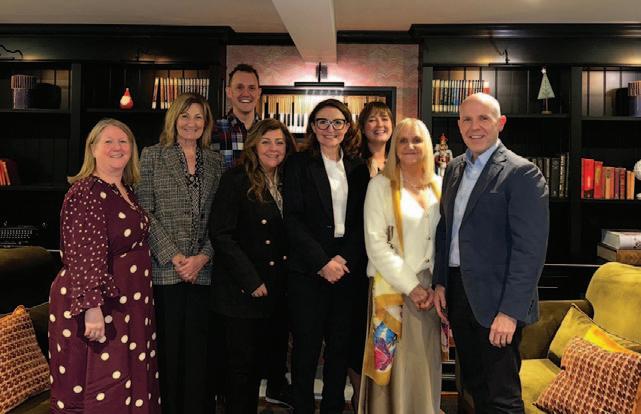
The digital Nurse Call system is a wireless, silent nurse call system that transforms care home environments by removing noisy call bells. Sensio Nurse Call sends alerts directly through to care teams handheld devices, enabling teams to triage support to those most in need. Both of these solutions are designed
specifically for those living with dementia where traditional forms of alerting are not always appropriate or workable.
Lisa Delaney, Country Manager Sensio UK, says: “We are very excited to be partnering with Lovett Care and this is an important step for Sensio in the UK. We have really enjoyed working with the team so far and have been impressed by their eagerness to embrace new technology. I look forward to growing our partnership further over the next few months and help Lovett Care to deliver the best care possible for their residents.”
Following a successful pilot which demonstrated a significant reduction in falls, highlighted positive outcomes for residents, and fostered a better working environment for care teams, Lovett Care has made the decision to roll out the technology across its homes.
Keith Crockett, CEO of Lovett Care, commented: “Both Lovett Care and New Care are already leading care home operators in technology advancements, so adopting Sensio’s RoomMate and digital Nurse Call system will further enhance and improve our residents’ experiences. The trial was a success, and RoomMate proved to be highly effective in reducing falls. We’re excited to partner with Sensio to integrate this technology into our homes, further enhancing the safety and support we provide to our residents.”
For further information on Sensio please visit www.sensio.io
To find out more about Lovett Care please visit www.lovettcare.co.uk
Commercial Kitchen and Laundry Solutions (CKLS) are one of the UK's leading suppliers of commercial kitchen and laundry equipment.

Whether you are a small sized residential home or large scale nursing home group, CKLS has the expertise and equipment you need to keep your operations running smoothly.
At CKLS, we understand that the success of your business depends on the quality of the equipment you use. That's why we've made it our mission to provide businesses across the UK with the highest quality commercial laundry and kitchen equipment available. We work with only the best manufacturers in the industry to ensure that our customers get the most reliable and efficient equipment possible.
Our commitment to our customers doesn't end with the sale of our equipment. At CKLS, we know that maintenance and repairs are crucial to keeping your equipment functioning at its best. That's why we offer
a full range of maintenance and repair services to our customers, including emergency repair services available 24 hours a day, 7 days a week.
We believe that our success as a company is measured by the success of our customers. That's why we're constantly striving to provide better products and services to help our customers achieve their goals. We're proud to say that our commitment to excellence has earned us a reputation as the go-to provider of commercial laundry and kitchen equipment in the UK.
So, if you're looking for reliable, high-quality commercial laundry and kitchen equipment, look no further than CKLS. With our extensive range of products and services, we're confident that we can help you find the right equipment to meet your needs and keep your business running smoothly for years to come.
Visit our website www.ckls.co.uk contact by phone on 01200 411914 or email at sales@ckls.co.uk.
Mobile Kitchens Ltd specialises in the hire or sale of temporary catering facilities and foodservice equipment.
Ideal for events or to provide temporary catering facilities during your kitchen refurbishment, our versatile units and equipment offer an efficient and economic solution to the caterers’ needs.
Production Kitchens, Preparation Kitchens, Warewashing Units, Dry Store Units, Cold Rooms and Restaurant Units are available as individual units in their own right or they can be linked together on site to form a complete complex.

Alternatively, we can offer modular, open-plan facilities, usually for larger, longer-term hires.
We offer a free design service, and project management from concept through to delivery and installation on site, plus full technical support throughout the hire period.
The standard specification of our smallest Production Kitchen unit includes a six burner oven range, salamander grill, twin basket fryer, upright fridge, hot cupboard, single bowl sink unit with integral hand wash basin, plus ample power points to plug in Microwaves, Food Processors, Toasters etc. Internal equipment can be interchanged and clients can effectively specify their preferred layout.
We have many tried and tested design layouts and would be pleased to put forward our recommendations for your project. So if you’re planning a refurbishment or need to cater for an event then why not give us a call and we’ll be happy to provide advice and put forward a competitive proposal. For further information or to arrange a site visit, email: sales@mk-hire.co.uk or call us on 0345 812 0800, or visit our website: www.mk-hire.co.uk


Infection control is critical in care homes, where laundry processes play a vital role in hygiene management. Care homes face increased pressure and scrutiny with changes to the Care Quality Commission inspection framework, and it is absolutely fundamental that care homes know how to safely ensure efficient infection control across all areas. CQC inspections place heavy emphasis on evidence-based infection control practices, including rigorous checks on laundry processes. Compliance with these standards is essential to safeguard residents, maintain trust, and achieve strong CQC ratings.
There are various way to ensure the right levels of hygiene control; you should employ thermal and/ or chemical disinfection. Ozone is one of the disinfection options that can be successful, but it is essential to adhere to HSE recommendations, take appropriate safety precautions, and use control measures as outlined by COSHH as use of this powerful oxidant does carry potential health risks. Forbes Professional offers care homes alternatives to Ozone systems, that still meet the most exacting hygiene requirements. Their

Miele commercial laundry machines enable sluice, thermal and chemical disinfection, to meet all the industry requirements of WRAS and CQC. When paired with Forbes’ advanced chemical detergents, which kill pathogens even at low temperatures, these commercial machines deliver a complete laundry solution for optimal infection control.
Forbes understands that care homes require tailored solutions. Their industry specialists work closely with operators to recommend the right commercial machines to meet their specific needs. Beyond installation, they offer award-winning service support to ensure ongoing compliance and operational efficiency.
For any care home, laundry is a key part of infection control. It is imperative that appropriate commercial laundry equipment is used within a care setting, and that there is a reliable partnership in place for service and maintenance. By choosing Miele’s technology and Forbes Professional’s expert support, care homes can safely and effectively meet stringent hygiene standards.
See the advert on the facing page for further information on Forbes.
MAG Laundry Equipment is a multi-award-winning supplier of commercial washing machines & tumble dryers that supports over 10,000 care homes across the UK. Clean laundry and bedding is critical for care homes, hospices, nursing homes, hospitals and other healthcare organisations. With a nationwide fleet of accredited engineers MAG Laundry Equipment has successfully assisted over ten thousand care homes with their products, services, information and support.
MAG’s product range includes commercial washing machines, tumble dryers, ironers, presses and detergents. For 100 years, since 1922, MAG’s products have been developed and improved to become some of the most reliable, energy-efficient and

the machines, and giving them a check-over, to see which parts, if any, can be carried over the refurbishment. Lavamac will only carry over the highest-quality parts from the machine from pre to post refurbishment. The machine then undergoes an extensive refurbishment, with almost all the parts being replaced, with the refurbished machines being given specialist parts based on the model type.
not only contributing to a greener way of
but also saving our customers money!
We have recently set up a specialist facility in St. Neots, near Cambridge, in which we are going ahead with this specialist refurbishment programme. This programme involves purchasing existing machines, and replacing the parts on them, so that they are as good as new, whilst retaining the look and feel that existed before, but with a massively increased lifespan, and a warranty on the machines that’s as good as a warranty on a new machine to go with the refurbishment too. Our refurbishment programme in our specialist facility includes stripping down
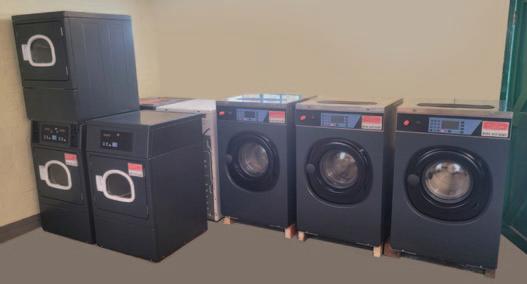
We recently have been awarded a bronze award in sustainability by the groundworks trust, affirming our commitment to the sustainability industry – however, as much of a compliment as it is, it does not mean that the hard work stops there! The next step on our journey is to hopefully be awarded the prestigious silver sustainability award! For this, we need to ensure that our carbon emissions are being cut down from our vans, continue our sustainability and refurbishment programme and to keep making green decisions within the company! 0151 317 3127 info@laundrytec.com www.lavamac.eu

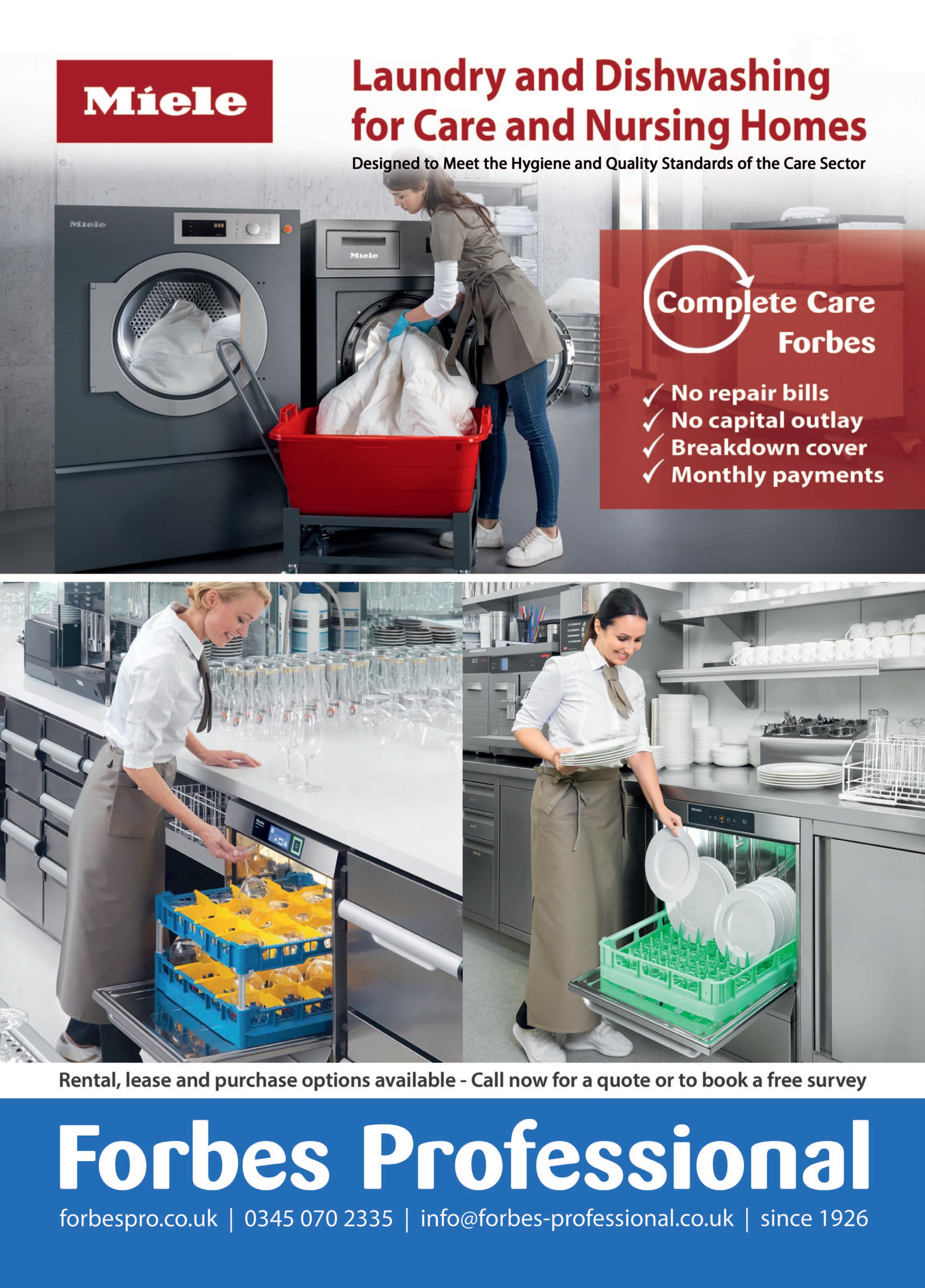
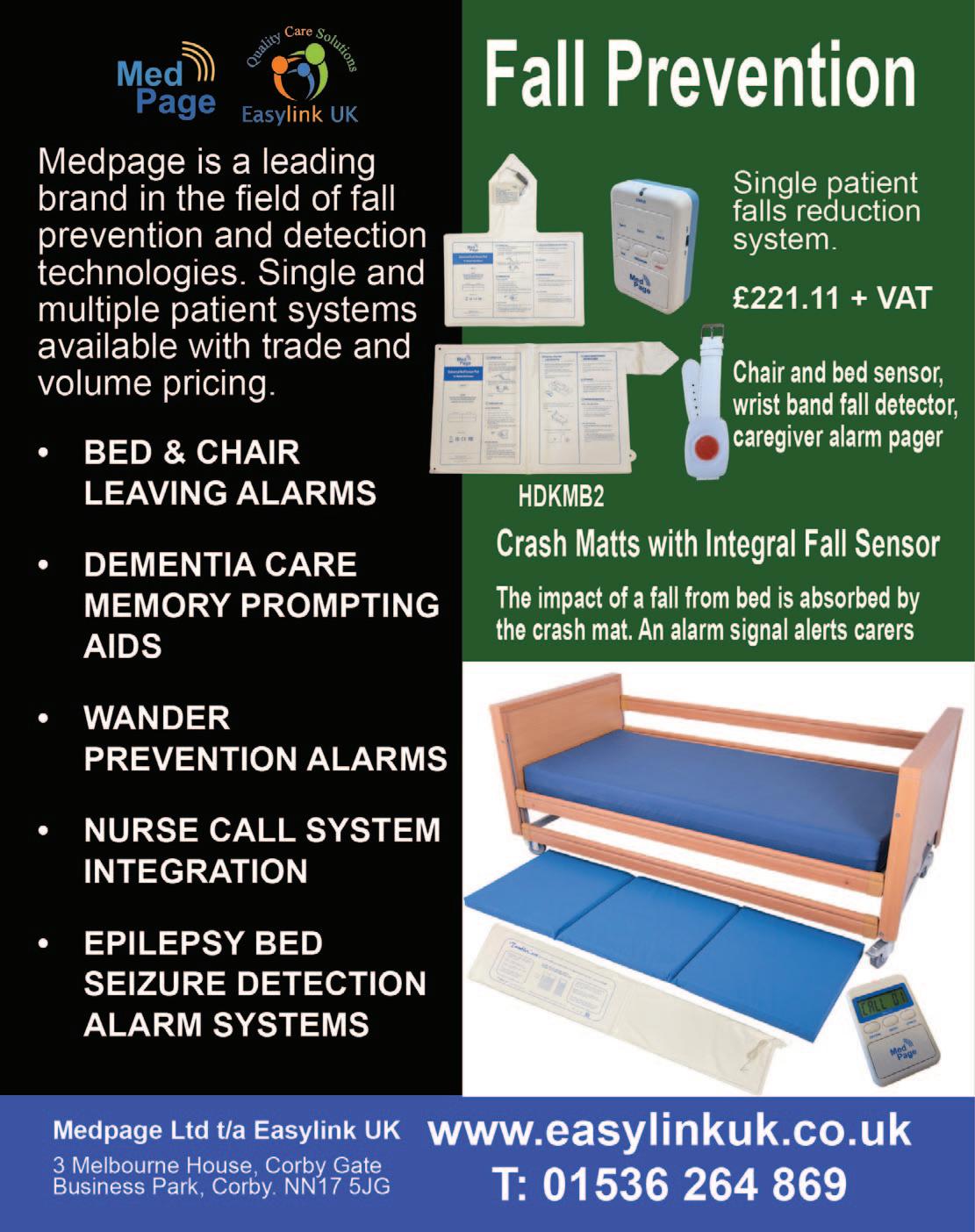
FALL SAVERS ® WIRELESS MONITOR

Eliminate all cables with our new generation falls management solutions!
Upgrade your falls programme with the latest technology from Fall Savers®.
eliminates the
between the monitor and sensor pad. This results in less work for nursing staff, improved safety for patients and reduced wear and tear on sensor pads. Wireless advantages include the ability to use one monitor with two sensor pads simultaneously and support for many new wireless devices.
BENEFITS INCLUDE:
Safer for patients; less work for staff Bed and chair pads available One monitor works with two sensor pads Integrates with most nurse call systems A variety of options, including: Call button Pager


In the post pandemic world, we have all seen the effects of supply chain problems with the invasion of Ukraine and other alarming global factors, ever increasing costs of living and other more local issues which have driven up the rate of inflation over the last few years. The impact of this meant that most manufacturers of electronic products had to increase their prices as costs spiralled. This, of course, has impacted the end user. The most dramatic impact has been on the Care Industry. An industry that has lacked the support it desperately needs in these trying times.
Courtney Thorne, at the same time, took a strategic decision to take a close look at our core products, right down to component level, the objective being to make us less vulnerable to future global supply chain issues, and to reduce the cost of each product with the amin of ensuring that we deliver the same high quality product at a cost protected price. We had to ensure that this would happen without jeopardising the superb lev-

els of support we provide to our valued customer base.
This ground up review involved all departments from Research and Development right through to the Field Service team (and everything in-between). This in-depth collaboration took time as we had to ensure that each and every element was refined, perfected and tested to our (and our customers) rigorous requirements.
Whilst many organisations have limited-time or end of product line offers, we are very pleased to announce a price reduction on our core Connect and Connect Health Nurse Call system ranges. With flexible terms, full integration with Care Apps, celebrated service delivery and the most reliable and robust solution now at a new lower price, there has never been a better time to talk to us about a new nurse call system.
For more information email us at: info@c-t.co.uk or see the advert on this page.
Blaucomm’s Nurse Call Messaging Service (NMS) is the market leading solution to remove the dependency on noisy nurse call panels and pagers, through its intelligent software, which delivers the alerts straight to the care staff who need them. Care homes are rapidly introducing smartphones for digital care planning and eMarnow, the same devices can be used to receive the nurse call alerts they need for the residents under their care.
Furthermore, Blaucomm NMS is deeply linked into Person Centred Software MCM, so call bell data is linked straight to care plans. This unlocks a huge benefit to care homes to enhance the staff performance with how they accept and respond to residents, which ultimately promotes better response times and visibility for management to audit their performance.

The best part is that Blaucomm NMS links into your existing nurse call system - we work with all major
brands such as Aidcall, ARM, Courtney Thorne, C-TEC, ENS, Intercall, Medicare, SAS and TeleAlarm.
Care operators are constantly recognising Blaucomm NMS for its reliability and dependability to their care operations, which is why we’ve been chosen time and time again over other solutions.
Head of IT Trudi Harrow at WCS Care had this to say about Blaucomm NMS:
“We find Blaucomm is a genuinely fantastic company with a reliable product.
"We would highly recommend this to anybody who wants to replace expensive pagers and silence those annoyingly loud nurse call screens!”
To find out more about Blaucomm NMS, visit
www.blaucomm.co.uk/healthcare
See the advert page 5 for more details.
Medpage Limited has collaborated with a leading UK manufacturer of crash mats to deliver a cost-effective tool for falls management strategies. The inclusion of the new TumbleCare full-length pressure mat sensor ensures that should a patient tumble out of bed, an alarm signal is generated to alert care staff to the incident, resulting in a recordable improvement to patient safety and service.
Crash mats act as a protective barrier, absorbing the impact of a fall and reducing the risk of serious injuries when a person tumbles out of bed. Beneficial for individuals who are at high risk of falling, such as older adults, patients recovering from surgery, or those with neurological conditions such as epilepsy.

Falls can pose significant risks, especially in healthcare settings and senior care facilities. Every year, thousands of people suffer injuries due to falls from beds and other furniture. To prevent these accidents and ensure the safety of patients and residents, it is essential to implement effective falls and safety management strategies.
Further details can be obtained by telephoning 01536 264 869 or emailing sales@easylinkuk.co.uk
See the advert on page 2 for details.

The care sector faces unprecedented challenges. A growing elderly population with increasingly complex needs, coupled with a shortage of qualified staff, puts immense pressure on care homes. But amidst these difficulties, technology offers a beacon of hope. We at 9Solutions, want to be at the forefront of tackling these issues, providing innovative solutions designed to empower caregivers and enhance the quality of life for residents.
Our location-based solution, with customizable safety zones and realtime alerts, allows for proactive intervention, ensuring resident safety while preserving their independence. Picture a fall occurring in a quiet corner. Instant notifications, pinpointing the exact location, enable staff to respond swiftly, minimizing potential harm.
Efficiency is key in today's demanding care environment. Care home staff are bombarded with alarms, leading to "alarm fatigue" and delayed responses. Our system personalizes alerts, directing them to the right caregiver, reducing workload and improving efficiency. One app manages calls, tracking, and tasks, allowing staff to focus on providing care.

Remote communication tools allow staff to check on residents virtually, reducing unnecessary physical rounds and minimizing disruptions. This frees up valuable time for personalized care and meaningful interactions – the heart of quality caregiving.
We understand that technology should be a support, not a burden. That's why our user-friendly system, developed with care professionals, combines diverse functionalities into a single intuitive platform. This min-
imizes the learning curve, allowing staff to focus on providing exceptional care. Crucially, it also integrates with Care Management softwares, ensuring smooth workflows and easy adoption.
BENEFITS OF 9SOLUTIONS TECHNOLOGY
Reduced workload: Automation and intelligent systems streamline tasks, easing the physical and emotional burden on caregivers.
Enhanced safety: Proactive alerts and location tracking ensure resident wellbeing and peace of mind for families.
Improved efficiency: Optimized workflows and personalized task management empower staff to deliver timely and effective care.
Increased resident satisfaction: Technology fosters independence while ensuring prompt assistance when needed.
The future of care is not about replacing human touch with technology, but about using technology to create space for more of it. It's about empowering caregivers, promoting resident well-being, and reimagining care in a way that prioritizes human connection.
Read more or contact us at www.9solutions.com or sales@9solutions.com

Technology has made people more connected with the world around them and the revolution in assistive care devices has made it possible for the elderly to spend their last years in a comfortable and familiar environment. These devices have also made it easier for home carers to provide quality care for their loved ones while managing their own lives. They allow you to care for your elderly whether they are travelling in the city for errands, staying alone at home, or staying in the same home as you. They are also helping nursing homes provide better care for them with discrete monitoring and quick responses to emergencies.

If you’re looking for these kinds of assistive care devices for your loved ones or nursing home, Frequency Precision produce some of the best systems available to help you with elderly care and mobility monitoring, ranging from bed, chair and floor sensor mats through fall monitoring and GPS tracking to fully integrated nurse call plug or wireless systems.
Phone: 01837 810590
Email: contact@frequencyprecision.com
Website: www.frequencyprecision.com


Since our founding in 2010, Activities to Share has been dedicated to enhancing the lives of those in care by providing thoughtfully designed activity products. Our mission is to support activity coordinators in delivering uplifting, engaging experiences that foster connection, joy, and well-being.
We achieve this by listening closely to your feedback and evolving with your needs. Whether over the phone, via email, WhatsApp, or Live Chat on our website, our team is always ready to offer advice and help you find just the right products to bring your ideas to life.
While we embrace the convenience of technology to expand our resources and share knowledge, we remain firm believers in the irreplaceable power of sensory

Angloplas are a UK manufacturer who specialise in producing dispensers for the health and hygiene industry. Although these are designed to keep the workplace tidy and uncluttered they are, more importantly, built knowing the control of healthcare-associated infections (HCAIs) are a priority for healthcare providers, and who are employing a combination of infection prevention and control strategies, including hand hygiene, cleaning, training and the adoption of new technologies, to tackle the problem. As a result, a wide range of infection control products and technologies are emerging on the market, including antimicrobial technology. Angloplas’ range of dispensers are produced in the world’s first proven Antimicrobial PVC with silver

ion technology and which is exclusive to Angloplas. This helps reduce the risk of cross infection by stopping the growth of bacteria and mould and works continuously for the lifetime of the product, reducing levels of bacteria such as MRSA, E Coli, Legionella, Salmonella and mould by up to 99.99%.
For non-clinical environments Angloplas has recently launched its new Budget Range of products which are made to the same exacting standards as the antimicrobial protected ones but with lower price tags.
You can order Angloplas products directly from its website at www.angloplas.co.uk See page 6 for details.
MOWOOT II – proven solution to chronic constipation without medication
Developed by a team of doctors and other healthcare professionals, MOWOOT II performs gentle abdominal massage to speed up intestinal passage in people experiencing chronic constipation.
Clinically proven, safe and effective, relaxing and sideeffects free, MOWOOT II Abdominal Massage Therapy System combats constipation and provides soothing relief to affected people.

Easy to use and comfortable, the MOWOOT II treats and manages constipation in people with spinal cord injuries, multiple sclerosis sufferers, Parkinson’s Disease patients and people with constipation related to prescription medication. MOWOOT II also helps to relieve idiopathic constipation experienced by menopausal and post-menopausal women
Consort Claudgen’s innovation in the electric heating industry takes another leap forward by introducing Wi-Fi-enabled heaters to their low surface temperature (LST) range. These cutting-edge heaters offer unparalleled convenience and efficiency. The heaters connect directly to Wi-Fi, enabling users to control heating through the digital control panel on the heater or via the Consort Connect app. With a comprehensive 7-day timer, which allows 24 individual heating periods per day, and features such as a lock function, open window detection, and custom automation, users can tailor their heating needs to their preferences. Adding to the ease of use, users can view the
and older and elderly people.
In clinical studies
MOWOOT II increased evacuation frequency, softened stools, improved regularity, reduced gasses, relieved bloating and eased off abdominal discomfort.
10 to 20 minutes daily of relaxing abdominal massage with MOWOOT II rapidly reduces symptoms of constipation. Evident results are experienced only a few days after the first treatment. Regular abdominal massage with MOOWOOT II ensures lasting health benefits and better quality of life.
MOWOOT II – effective solution to chronic constipation for better quality of life!
Supplied by Win Health Medical Ltd - 01835 864866 - www.win-health.com
See page 3 of this issue for other Win Health products.

energy consumption statistics of all connected heaters, providing insights into usage patterns and potential savings. The LST heaters with Wi-Fi and occupancy sensors have a self-learning control ability. They utilise inbuilt occupancy sensors to detect and learn a user’s weekly presence in a room, creating an intuitive heating schedule. When the space is unoccupied, the heater conserves energy by switching to a setback temperature or frost protection mode.
BIM (Building Information Modelling) objects for the heaters are available for download from Consort’s website. 01646 692172 | sales@consortepl.com | www.consortepl.com See the advert on page 6.
engagement. That’s why we continue to make our Reminiscence Kits and Sensory Bags with real, tactile items that stimulate the senses. Some experiences—like popping bubbles for the splash, breathing in a familiar scent, or piecing together a puzzle with others—simply can’t be replicated on a screen. These sensory moments are invaluable in encouraging storytelling, sparking memories, and fostering conversation.
Our values remain rooted in this commitment to meaningful connection. We’re here to partner with you—the professionals on the front lines of care—to create a sense of structure, well-being, and fun for those who need it most.
Are you longing for your activity diary to be full? Look no further www.activitiestoshare.co.uk are here for you! See the advert on page 7 or: customers@activitiestoshare.co.uk
0117 966 6761
07900 6751 50
C&S Seating Ltd have provided postural control equipment to residential homes, hospices, medical equipment services and NHS trust hospitals nationwide since 1991.
With 9 different sizes of TRolls and Log Rolls, in a removable and machine washable Waterproof Titex or Soft Knit material. These rolls are used to control posture and position of the body in either supine or side lying. Our Knee & Leg support wedges are

“Jolly
The new “Jolly Journey” from Little Islands is designed to simulate an old-fashioned travel carriage, featuring real wood panelled wall, brass luggage racks, ornate wall lights and table lamp, opposite-facing seating for four, including cushions, ‘First Class’ antimacassars and period memorabilia.
The Jolly Journey creates a familiar and stimulating environment for ‘passengers’ to return to their fondest memories, sparking conversations of time gone by. Reminisce about travel and holidays with loved ones

and furnish your opulent ‘First Class Carriage pod’ with all accessories and footage. All we require is 2.5M of clear wall space, a power socket and good access, to create your very own Jolly Journey. For more information please contact Little Islands: 01828 869802 or see the advert on page 5.


PASS supports over 1,000 care providers every day, giving them access to market leading care management tools hand in hand with unlimited 24/7/365 support from our dedicated and friendly PASS team.
Assured by NHS Transformation Directorate, PASS provides a secure platform that allows you to plan, record and evidence the care you deliver. The only assured solution built specifically for the home care sector, it provides comprehensive real-time functionality and allows you to share progress against outcomes with customisable, exportable reports.
CARE PLANNING AND ROSTERING FROM A SINGLE PLATFORM
To meet the wider needs of the PASS community All-in-one PASS has recently been launched , bringing advanced rostering functionality to our established digital care planning platform. As a result advanced staff scheduling, payroll and invoicing functionality is now seamlessly linked with care planning and reporting, reducing the technical complexity, risk and overhead associated with integrating two separate systems.
As a result, PASS now provides an all-in-one suite of digital care management tools, available from a single platform, designed to:
Save you time
Increase the efficiency of your teams
Improve the quality of care
Deliver better outcomes
INTEGRATED HEALTH AND SOCIAL CARE
Our commitment to the continual evolution of PASS is further illustrated by the addition of GP Connect. The first product of its type to offer this feature, PASS is still one of only a handful of digital care management solutions to have completed this NHS Digital integration, and is the only one offering it to the home care market. PASS GP Connect provides authorised social care staff with realtime access to their client’s GP records. It makes medical information available when and where it is needed, leading to improvements in both care safety and outcomes:
Visibility of allergies, vaccinations and medications, especially useful for clients unable to reliably share their personal information
Using medical information to inform care planning
Ensuring that the right medication is delivered to the right person in the timeliest manner. In one case, this allowed the administration of antibiotics on a Friday evening, aiding the service user’s swift recovery from infection
Available to all PASS users at no additional cost, PASS GP Connect is significantly more efficient than waiting for a GP response. It’s also a positive step forward on the path to the DHSC’s goal for widespread digitally enabled care and is in full alignment with their ambition for joined up care for everyone.
Get in touch: www.everylifetechnologies.com hello@everylifetechnologies.com
Envivo Group is at the forefront of care and support sector, driving innovation that enables people to live lives full of choices and opportunities. They have 202 locations that are now using Mainteno Facilities Management software.
“Our experience with Mainteno at TLC/Envivo Group has been really positive already. Since its rollout it has shown real and measurable benefits and has had a marked impact on the workload and assurance of our operations team.
"We can now raise issues whether large or minor, almost the instant they are spotted. We can denote the priority with which they need to be tackled and track the progress of works to rectify them. It has reduced almost completely the need to be directly contacting people to resolve issues. It has been obvious that the streamlined approach that it provides helps in prioritising works for maintenance teams and contractors, gives them plenty of detailed information
as to the exact issue and has given us an evidence base to show that issues are resolved in a consistent and effective timeframe.
"The details that are available once a job is logged are invaluable. We can evidence to regulators etc that there are plans to rectify any outstanding works that they may pick up. I've been very impressed with the details that are passed back to me through the platform as works are ongoing and also when they are completed. It's proved to be a valuable reference to ensure that we are not doubling up requests, working through tasks in a logical way and also to confirm the completion of works remotely.
"For a site of our size and complexity especially, a toolkit with this level of effectivity and scope has been an incredible help.”
Group Facilities Manager sales@redro.uk www.mainteno.com





The social care sector is evolving at an unprecedented pace, driven by increasing demand, tightened budgets, and the need to deliver exceptional care outcomes. At the heart of this shift lies digital transformation—a holistic approach to overhauling care operations, processes, and culture through the integration of modern technologies.
Far from simply replacing manual tasks, digital transformation reimagines how organisations operate. Tools like Digital Social Care Records (DSCRs) represent just the beginning. By adopting interoperable systems and cloud-based solutions, care providers can achieve seamless coordination across departments, optimise resource allocation, and ensure high-quality care. Processes such as care planning, rostering, compliance reporting, and data management become more efficient, freeing up teams to focus on providing person-centred care.
Digital solutions also offer significant benefits. Faster service delivery reduced administrative burdens, and more informed decision-making results in better care experiences for service users and care providers alike. For instance, interoperability enables real-time data sharing across platforms, reducing errors while providing a unified view of the organisation’s operations. This empowers leadership to make critical decisions backed by accurate, holistic insights. Additionally, tools like single sign-on (SSO) and multi-factor authentication bolster security, ensuring confidential data remains protected while reducing day-to-day inefficiencies for users.

For social care providers, the move toward digitalisation represents an investment in long-term sustainability. Enhanced efficiency helps reduce operational costs, allowing resources to be reinvested in vital areas such as workforce development or service user engagement. Standardised digital frameworks also simplify the complexities of acquiring new services or locations, ensuring continuity of care during periods of growth. Choosing a digital partner who understands the complexities of care is essential to navigating this transformation successfully and tailoring solutions to the unique needs of the sector.
However, the path to digital transformation requires a clear roadmap. Providers must assess their needs, define a vision, and secure stakeholder buy-in. Selecting the right software and delivering effective training is equally critical to ensuring a smooth transition. Continuous monitoring and adjustment allow providers to refine their approach, fostering a culture of improvement and resilience.
By adopting integrated intuitive software solutions, social care providers can not only stay ahead of industry challenges but also lead the way in delivering exceptional, sustainable services. Digital transformation may not solve every challenge, but its potential to enhance care quality, operational efficiency, and financial health is undeniable.
Visit OneAdvanced at stand H24 at UK Care Week to learn how we can support your journey or download our guide to digital transformation with the QR code.
SFIncS r/3 - A Fee Income System especially for Residential and Nursing Care Homes
Designed to deliver simplicity and ease of use coupled with speed, flexibility and accuracy, SFIncS r/3 (Simple Fee Income System release 3) has a proven track record of over 12 years in use.
Originally developed and prototyped as an MS Access database, since 2017 SFIncS r/3 has lived entirely on the cloud, so is available 24/7 from anywhere in the world.
As a completely bespoke package, born of necessity and collaboration between seasoned software consultants with ties to the care industry, SFIncS r/3 offers innovations and capabilities not found in any other system.
Separation of sponsor and service user responsibilities permits unlimited sponsor/service user relationships, and as any number of charge codes may be defined, this allows complete flexibility of service user/sponsor /charge code definition.
Its unique continuous billing function is the most efficient means possible of defining recurring charges (an entry is only required when a change occurs) and both an ad hoc charge function and a
cashbox module are available for incidental expenses (either or both can be used).
Use of the balance forward accounting principle (which makes unnecessary invoice matching a thing of the past - though invoicing is included) plus super quick receipts entry using just ‘six clicks’ makes SFIncS r/3 almost effortless to use.
Paula, who owns and operates Monkstone House Residential Home in Porthcawl testifies to it’s incredible prowess: “With 41 partly private and partly sponsored service users, some of whom are multiply funded, it takes me only 30 to 40 minutes per week to keep both my accounts and fee income up to date! More importantly, I never need to worry about underpaid or overpaid fees - everything is always spot on. And the invoices and statements produced let me present the polished and professional image I need.”

SFIncS r/3 integrates easily with any accounting package, can be used by any type of care home and by single or multiple home operators alike.
For more information email benjones@intracare.co

Better by Design: A Fee Income System especially for Residential and Nursing Care Homes
We've analysed every aspect of fee income processing to the nth degree and developed a bespoke solution that delivers simplicity and ease of use coupled with speed, flexibility and accuracy – all in one outstanding application package.
SFIncS r/3 is the ultimate fee income management and control system.
• Unlimited sponsor and charge code assignments allow complete flexibility of service user billing profiles.
• Perfect for all types of care homes - Nursing, Residential, Mixed, Specialist.
• Unique continuous billing functionality provides the most efficient charge definition possible. Only charge start points need to be maintained and all sponsor charges for each service user (including historic) are shown on just one screen.
• Completely flexible invoicing. Invoice any sponsor at any time for any charges for any service user for any period of time.
• Super fast receipt entry including ‘Six clicks’ copy functionality.
• Balance forward accounting means you can forget laborious invoice matching.
• Ad hoc charges functionality.
• Cashbox module included.
• Works for multiple or single home operators.
• Integrates with any accounting system.
• Plus all the reports, views and graphs you’ll ever need.
• In use for over 12 years.
• Free training and help with system set up.
• Historic data loading option available (charges may apply).
• 30 day free trial.
For a demo, free trial or for further information please email benjones@intracare.co or visit https://intracare.co/

By Dr Angela Brown, Founder and Chief Executive Officer of Training

several quick and easy changes which the government
could swiftly implement to significantly improve the sector in the shortterm.
A start would be to focus recruitment on the individual progression plan of the care worker. Afterall, surely a sector which traditionally has poor pay and responds to ever changing societal needs, deserves some control over what are perceived are important skills.
The sector still relies on recruitment via word of mouth and offers low pay and low recognition of the skills required in adult care as an incentive. While the workforce needs to respond to the needs of employers, we have a duty to understand the needs of the carer by providing progression of their own career pathway.
The early years sector faced a similar challenge with public perception. Since no one needs a qualification to have a child, it was perceived by many – and even some in government – that the skills required to work in the sector simply came natural.
Although the early years sector has not yet chased all of its demons, public perception of the skills required undertook a change andlargely helped by the excellent Sure Start system - parents began to understand the value of having a skilled workforce to look after our children. It seems an alien concept to us now, but it is very much where we’re at with care, and it doesn’t need to be that way.
In care today, we’re constantly seeing headlines of endemic staff shortages and staff burnout, but this could be significantly improved if the expectations of the sector are proactive rather than responsive.
This is what the Commission may conclude, but in the short-term, we need to invest in the current army of the workforce whose goodwill and compassion is relied upon to respond out of decency rather than an identified societal need.
Demands on the NHS can also only be supported by an adult care sector which is respected for the skills they possess.
For 2025 to herald in some immediate change, let’s utilise Government skills funding and Department of Social Care workforce development programmes to really drive the sector forward.
Let’s find out what the people receiving care really want from their care plan and let them have a say in what the devolved authorities are spending on.
Let’s be ambitious and listen to the sector, use its expertise and plan for a service which not only works well in conjunction with the NHS, but one which is respected and rewarded.
Let’s make 2025 the year we start seeing real change in the care sector.

In the ever-evolving landscape of adult social care, it is essential to ensure that training initiatives not only equip care professionals with the necessary knowledge and skills but also nurture an environment where they feel confident and supported to deliver their best.
As a Registered General Nurse with over two decades of experience in the care industry, I have seen first-hand how thoughtfully designed training programmes can bring about meaningful changes that resonate with both staff and residents. These programmes, when aligned with the real-world needs of care professionals, have the power to transform not only the quality of care but also the overall morale and satisfaction within the care setting.
One of the key features of impactful training is its accessibility, relevance, and applicability to the challenges faced by care staff on a daily basis. From comprehensive first aid instruction to specialised courses on dementia care, well-designed training modules can provide care professionals with the tools and techniques required to respond effectively to a variety of situations. By prioritising the development of our staff's clinical proficiency, we enable them to deliver high-quality, person-centred care that focuses on the well-being and dignity of residents.
However, building confidence and capability goes beyond technical skills alone. It is equally vital to focus on the interpersonal skills that underpin meaningful relationships with residents and contribute to their overall happiness and fulfilment. Training programmes that emphasise relational care, for instance, can help care staff appreciate the importance of creating an atmosphere of trust and understanding. By
encouraging staff to focus on these human aspects of care, we cultivate a setting that radiates warmth and kindness, ensuring that residents feel valued and respected.
Moreover, to ensure that staff can consistently provide the best possible care, our training must remain adaptable and responsive to emerging trends and best practices in the sector. By implementing regular refresher courses, we reinforce foundational knowledge, address any skill gaps, and ensure that care professionals are up to date with the latest advancements. Similarly, ongoing supervision and performance evaluations play a vital role in identifying opportunities for professional growth, creating a framework of accountability and continuous development. This commitment to lifelong learning not only enhances the quality of care but also reinforces a sense of purpose and pride among staff.
The ripple effect of robust training programmes extends far beyond individual care professionals. When staff feel confident, valued, and well-equipped, they are better positioned to deliver exceptional care that is tailored to the unique needs and preferences of each resident. This, in turn, results in improved well-being for residents, greater peace of mind for their families, and stronger outcomes for the care community as a whole.
At the core of our training philosophy lies the understanding that empowered staff lead to empowered residents. When care professionals are equipped with the knowledge, skills, and assurance to excel in their roles, they are better able to encourage residents to maintain their independence, involve them in decision-making, and take the time to truly listen to their stories and concerns.
In conclusion, aligning training with the practical needs of both staff and residents goes far beyond fulfilling regulatory requirements—it is the foundation for fostering confidence, compassion, and excellence in adult social care. As we look ahead to the challenges and opportunities of the future, let us remain steadfast in our commitment to investing in our staff, enabling them to make a lasting difference in the lives of those they care for.
By Elena Martin, Director
of
Operations
and Commissioning, Langdale Care Homes Group (www.langdalecarehomes.co.uk)
By Daniel O’Shaughnessy,

You wouldn’t run a care home without a health and safety lead, and the same should apply to data security and protection leads. Losing access to critical data, even briefly, can be devastating for residents’ welfare and your business’s viability. If care plans and medication records are unavailable due to a cyber incident or software issue, residents’ wellbeing is at risk.
Finance system failures can disrupt payroll, invoicing, and payments.
While data protection is everyone’s responsibility, having a named individual to lead on data security and protection is essential. This role provides senior leadership and ensures good practices are followed across the organisation. At Digital Care Hub, we use the term data security and protection lead to describe this role.
The lead should champion data security policies and set an example. While daily tasks can be delegated, the lead ensures standards are met. This role doesn’t have to fall to the Registered Manager but should be assigned to someone senior enough to oversee responsibilities effectively. In larger organisations, aspects of the role can be shared – for instance, one person might manage risks while another handles information governance.
It’s vital that leads have the right knowledge and skills. To address training gaps, Digital Care Hub’s Better Security, Better Care programme has launched a free, open-access elearning course tailored for data security and protection leads. This complements an existing course for all staff, which we recommend completing first.
The course, launched in January 2025, supports continuing professional development (CPD) and meets the training requirements of the Data Security and Protection Toolkit (DSPT). It is the only free resource designed specifically for this role in adult social care.
The training reflects real-world scenarios across care homes, supported living, home care, and community services, covering all client groups. The course includes four modules:
1. Data protection rights and responsibilities
Covers the lead’s responsibilities, other specialist roles, and key skills and
support needed for the role.
2. Keeping data secure
Explores managing data, understanding personal data rights, access to data, Information Asset Registers, and Data Protection Impact Assessments.
3. Threats to data security
Focuses on recognising, preparing for, and recovering from cyber incidents; reducing threats to digital systems, devices, and supply chains.
4. Data breaches
Explains how to differentiate between breaches, incidents, or near misses; record and learn from incidents; and respond to and report breaches appropriately.
By completing this course, data security and protection leads will enhance their knowledge of data protection and cyber security, ensuring they can safeguard their organisations, staff, and the people they support.
For more information about the course and other resources, visit www.digitalcarehub.co.uk/elearning.


Leanne Silverwood is the Founder and Managing Director of Local
Care Force
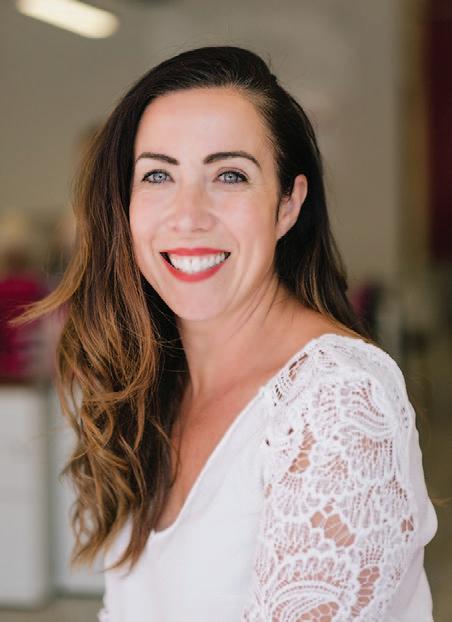
As Local Care Force celebrates 20 years of business, we look back on two decades of momentous changes in the health and social care sector. From technological advances to ongoing recruitment and retention issues, supply chain management companies driving down prices and quality, and changes to the agency landscape, the health, and social care sector, post-pandemic, has not only had to adapt but has also needed to rise to meet these challenges.
In 2020 the health & social care sector faced a devastating crisis in Covid19.
Care home staff were under unimaginable pressure, working long hours, managing PPE shortages, and the emotional toll of caring for residents who were isolated from their families. We had to adapt quickly, deploying staff where they were most needed, while maintaining their safety, and that of the residents they cared for. It demonstrated the resilience and dedication of our workforce - and we are so incredibly proud of the commitment they showed throughout this difficult time.
Post pandemic the issue of recruitment worsened. In 2023 the health & social care vacancy rates stood at 152,000 roles (9.9%) substantially higher than the overall UK rate of 3.4%. It was a challenging time, to say the least. Alongside issues around recruitment, were problems with retention which significantly impacted the health and social care landscape, with 390,000 (28.3%) leaving the sector in 2022/23. (The Kings Fund 2024).
As a health & social care agency, Local Care Force has been at the forefront of this ongoing crisis. The ever-growing demand for qualified healthcare professionals has proven to be a difficult obstacle to over-
come. Our role in providing experienced, skilled, and compassionate staff has never been more critical, or difficult, and it is the reason we offer specialist in-house training led by our clinical lead nurse, who also acts as a mentor to our team.
The agency sector has not been immune to challenges post-pandemic. In the past, agencies were regulated by the CQC, but for several years now, they have been unregulated. This lack of oversight has led to a surge in "back bedroom" agencies, which supply staff without conducting the necessary checks to ensure resident safety. Additionally, these agencies often disregard tax regulations when paying staff, leaving care homes liable for tax shortfalls. Consequently, we advise all clients to question any £14 hourly carer charges, as it has become easier for anyone to recruit and place nurses in care homes. This trend is particularly concerning, as we pride ourselves on our robust recruitment and safeguarding processes to ensure the wellbeing of the residents our staff support.
The Work Rights Centre report has highlighted another troubling issue within the industry: the flawed sponsorship visa system and the exploitation of foreign workers in the health and social care sector.
Migrants constitute 32% of care worker roles in England, many of whom face excessive hours or underemployment, struggling to change visa sponsorship, and fearing reprisals if they voice their concerns. As an agency, we cannot recruit staff requiring visas. However, we are disheartened to see hundreds of people on sponsorship visas applying for work with us due to unscrupulous agencies exploiting legal loopholes. We frequently hear from individuals who aren't receiving enough work from their sponsors to sustain themselves, yet they cannot legally work elsewhere without invalidating their visas. The well-being of our workforce has always been paramount at Local Care Force. We firmly believe that protecting our staff, which in turn, protects the residents they support, a principle on which Local Care Force prides itself.
As we reflect on our two-decade journey, acknowledging the significant challenges we have faced, it's equally important to celebrate the positive advances we have made during this time.
We know that with dedication, collaboration, and a focus on innovation, we can continue to weather the storm. As we celebrate this milestone, we are committed to providing the highest standard of care and supporting the health & social care sector in whatever challenges the next 20 years may bring.
The delivery of safe care is the paramount responsibility of social care providers. Central to achieving this is the governance framework adopted by service providers. And at the core of this framework are policies and procedures. These enable the provider to comply – and evidence compliance – with relevant legislation and regulations, as well as facilitating best practices, supporting business needs, and assisting in recognising and managing risks.
Providers have a legal duty of care to the people they employ. Policies and procedures should provide clear guidelines to staff on how the organisation operates, as well as informing them of best practices and processes to be followed.
Policies should be reviewed annually as a minimum to ensure they are still fit for purpose and align with legal and regulatory requirements. They should be reviewed not only by employees of the business, but also by experts in various subject matters (e.g.,

infection control or medicines management).
For many small- to medium-sized providers, there may not be the in-house skills, knowledge, and experience to complete such a robust annual review. Many choose instead to purchase their policies and procedures from a reputable provider like W&P Compliance & Training, who will also complete reviews and ensure their policies and procedures remain up to date. This way a provider not only ensures they remain compliant; they also benefit from best practice policies and procedures that provide a solid foundation for safe working practices and – ultimately – protect and support service users and staff.
Ben Erskine – Director at W&P Compliance & Training www.wandptraining.co.uk | Tel: 01305 767104 See the advert on page 2 for further information.
Training care home staff is vital for delivering high-quality care, especially when managing complex resident needs such as dementia, frailty, and mental health challenges. However, traditional methods often fall short in engaging staff, leaving critical gaps in understanding and preparedness. Innovative approaches, such as game-based learning and peer-to-peer collaboration, are revolutionising training, particularly in addressing the ethical and legal challenges of restrictive practices.
Restrictive practices—measures that limit an individual’s freedom—are sometimes necessary to ensure safety. However, they must be applied with great care, adhering to legal frameworks and ethical guidelines to protect residents’ dignity. A groundbreaking digital training resource, codesigned by Queen’s University Belfast and Focus Games, exemplifies this innovation. The resource uses interactive, expert-driven content to help staff navigate restrictive practices responsibly and effectively.
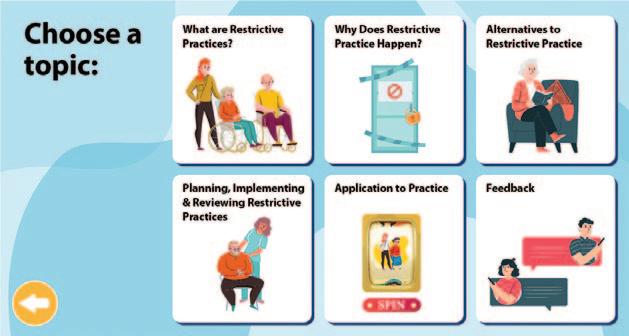
Game-based learning plays a central role, transforming topics like restrictive practices into engaging,
real-world scenarios. Simulations allow staff to explore ethical dilemmas, practice decision-making, and test alternative solutions in a safe, low-pressure environment. This approach enhances critical thinking, teamwork, and retention of essential knowledge.
Peer-to-peer learning further strengthens the training by encouraging staff to share experiences and insights, fostering collaboration and practical problem-solving. This creates a dynamic learning environment where staff feel supported and empowered to deliver compassionate care. By integrating these modern approaches, care homes can elevate training into a meaningful experience, equipping staff to balance safety with residents’ autonomy and dignity. At Focus Games, we are proud to offer tools designed to empower care home teams through innovative training. Visit www.FocusGames.com or email info@focusgames.com to learn more about our Restrictive Practice resource and how it can enhance care home outcomes for
At Meaningful Care Matters, we have the privilege of working with health and care teams across the UK, Ireland, Canada, Australia and more recently Singapore.
It is no surprise that those who can embrace the culture change of our ‘Butterfly’ and ‘Dragonfly’ Approaches - in terms of reducing the institutional and task-focused aspects of care in favour of creating a sense of fun, friendship and true belonging - have leaders who are very self-aware and emotionally intelligent. What does that look like in practice? It involves being genuine as a person, being able to acknowledge mistakes, and taking time to really get to know your team members as individuals and what makes them tick. Our team are Authorised Partners in delivering the methodology of the DiSC personality profiling assessments and the Five Behaviours of a Cohesive Team™ programme (Lencioni, P) to help support teams to work together more positively and ultimately productively. Having been through the process myself, it was striking how accurate the analysis was of what motivates and what stresses me. It also helped me to know those stressors and motivators for my peers and how to adapt my approach to better look out for each other.

our own relationship with trust, based on experiences in our lives? Do we find it easy, or does it take us time? Being in touch with your own vulnerability is not about spilling out all your deepest, darkest secrets to the people you support! But it is about being able to reflect on times in your life when you have felt lonely, scared or lost, and for these reflections to enhance our empathy for those who are struggling. Once we have established trust and a sense of belonging in our teams, we can more easily be open about the things we disagree about, and for those differences or conflicts to be regarded as healthy rather than threatening to the stability of a team - provided they are talked about openly and kindly. Many teams flounder because there is an artificial harmony i.e. conflicts are under the surface and gossip and cliques can create an unsafe and unhappy work culture.
A recent social media post caught my eye which said “Your company culture is not words on your website or posters on the wall. It’s how your people feel on a Sunday night.”
What is your response to that question, and do you think you and your team might need some time and attention in 2025 to get back on track and unlock your full potential?
People working in care homes often experience the deaths of residents but this doesn’t mean each death is easier to cope with.
Hospice UK’s Compassionate Employers Programme deliver workshops to help care professionals manage recurring and often overlooked experiences of grief through their work.

Our next virtual session will be on: Wednesday 5 March 2025, 10.00 - 12.30
The cost is just £120 +VAT per person.
At the foundation of a good team is what Patick Lencioni describes as vulnerability-based trust, and this is something we talk about a lot in training for leaders and their teams. People who we care for, and their families put a lot of trust in us. So, what is
Sally Knocker is a Consultant Trainer with Meaningful Care Matters www.meaningfulcarematters.com

Book your space or find out more at: www.hospiceuk.org/coping-professionalgrief-workshop-march

In a landmark ruling, the High Court delivered a significant judgment on 14 January 2025, in favour of Hartford Care Group Limited (HCG), challenging the Secretary of State for the Home Department's (SSHD) decision to reject HCG's application for 70 Defined Certificates of Sponsorship (DCoS). This case, The King (on the Application of Hartford Care Group Limited) v. The Secretary of State for the Home Department, sets a crucial precedent for how the Home Office assesses applications for Defined Certificate of Sponsorship (DCoS), particularly in the care sector.
THE CASE BACKGROUND
HCG, a prominent provider of care services in the UK, has held a sponsor license since April 2019. On 8 January 2024, Aston Brooke Solicitors applied for 70 DCoS on behalf of HCG. These certificates are vital for nonUK workers to obtain a visa to work in the UK. However, on 29 January 2024, the SSHD rejected HCG's application, citing insufficient evidence to demonstrate a genuine need for additional staff.
Aston Brooke Solicitors swiftly initiated a Judicial Review, challenging the legality of the decision, which could have significant consequences for the care sector, heavily reliant on overseas workers to meet staffing demands and stating HCG contracts with their service users and the Local Authority did not state the number of hours.
THE LEGAL CHALLENGE
Aston Brooke Solicitors argued that the SSHD’s decision was unlawful, irrational, and inconsistent with the Immigration Rules. Aston Brooke Solicitors contended that the Home Office had imposed requirements not set out in the rules, relied on unpublished policies, and failed to assess the evidence properly. In particular, the SSHD insisted on receiving contracts that guaranteed specific hours of work, which Aston Brooke Solicitors argued were not standard in the care sector.
The SSHD defended its position by stating that additional information could be requested to validate the applications THE ADMINISTRATIVE COURT'S RULING
"23 years, operating 4 Devon Nursing homes, has been pretty tough, as anyone in social care, knows, only too well. And if it was hard already, after 2024 budget, it's just got harder.
Anyway, at heart, I am just customer of Eden Alternative, and it was a stroke of luck to come across this whilst on holiday in New Zealand in 2009. It started in USA in 1994 and now runs in 22 countries.
The fact that I am now involved with this not-forprofit organisation (in the UK area) came about when one of the 2 main UK directors died suddenly just before Covid. But it's something I have run with for 11 years to help make 'vision' a reality, not a struggle. So,
On 14 January 2025, the High Court ruled in favour of HCG, stating that it was irrational for the SSHD to require contracts with guaranteed hours to prove the genuineness of care worker vacancies. The Judge highlighted that flexible contracts are standard in the care sector, where the demand for staff can vary depending on factors such as local authority funding and service user needs.
The Judge also criticised the SSHD’s assumption that local authorities impose staffing quotas, pointing out that care providers have discretion over how many workers they need to meet demand. Furthermore, the Judge found that HCG’s evidence adequately demonstrated the genuine need for additional staff, rendering the SSHD’s rejection of the application irrational.
The Judicial Review application was supported by Care England and Professor Martin Green OBE chief executive of Care England stated after the verdict was delivered: “In winning the Judicial Review, Aston Brooke Solicitors has done a great service to the care sector because this victory will cause The Secretary of State for the Home Department to rethink how they behave towards the independent care providers. No one should be in any doubt that when we see unacceptable behaviour, we will be prepared to challenge it and use the law to enforce our rights.”
Gemma Melhuish, People and Culture Director at HCG said: “We are thrilled the court ruled in our favour and agreed their decision was unlawful as it is important for other Care Providers to challenge decisions that are morally not correct. We are now looking forward to welcoming new starters to our Homes from our overseas recruitment campaign undertaken last year and continuing to provide high-quality care to our residents. “
THE OUTCOME AND ITS SIGNIFICANCE
The High Court granted a quashing order of the SSHD’s decision, declaring it unlawful. Aston Brooke Solicitors will now reapply for the DCoS for HCG without the commercial risks associated with the initial rejection.
being both a customer and helping the admin seems quite natural.
It is a modern philosophy of care, but moreover, it's a programme that is straight forward, tried and tested for 30 years and really works.
Its member care organisations generally become trainers for their own teams, and run it themselves.
The programme is run in person over 2-3 days or online 1 hr a wk for 7 weeks. You choose.
It addresses loneliness, helplessness and boredom and operates through 10 principles to underpin 7 critical domains of wellbeing.

Moreover, it's effective, transformational and really works. As residents, and team members wellbeing, matter so much , it's a must, in my opinion.
Geoffrey Cox Southernhealthcare.co.uk eden-alternative.co.uk"
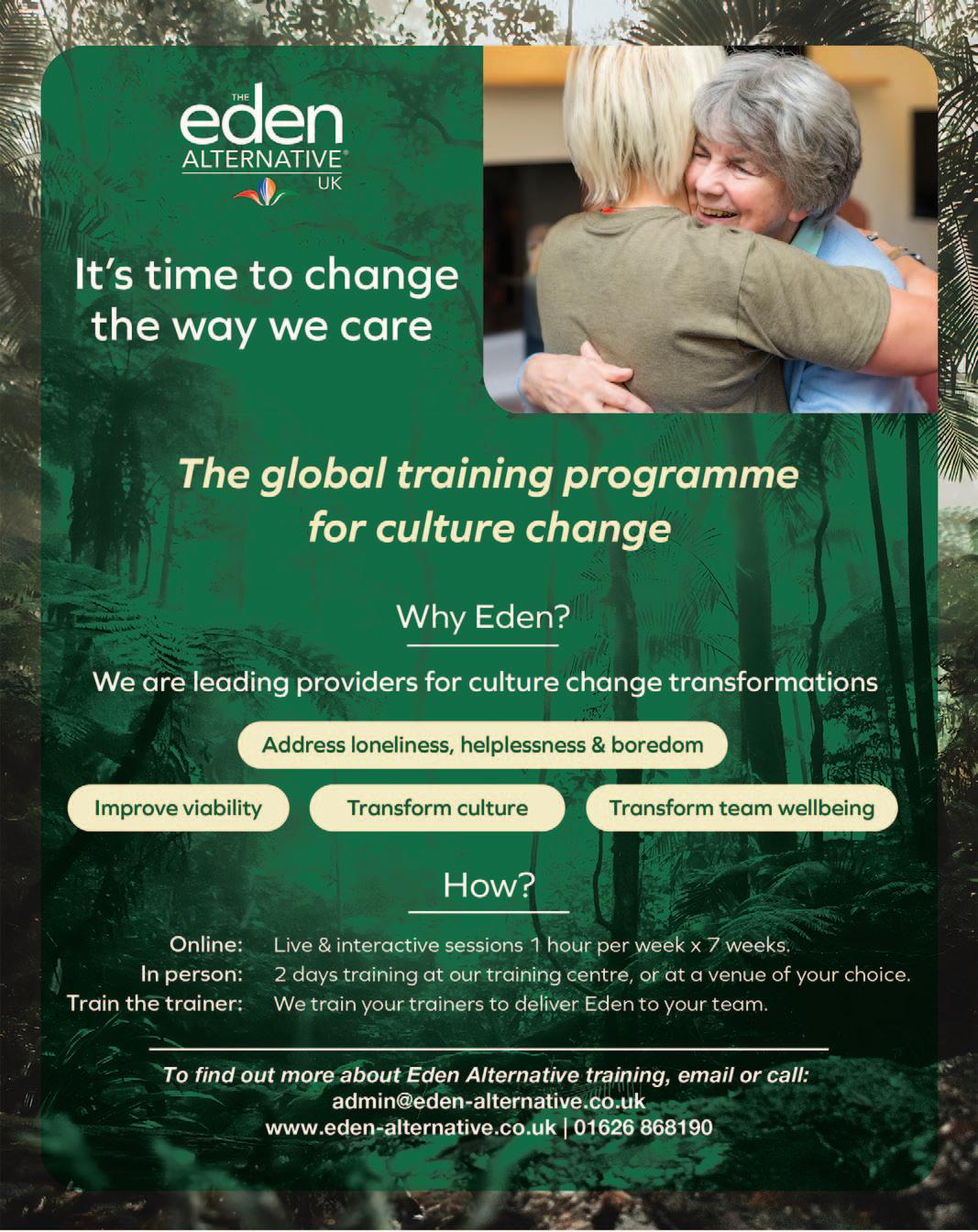
Kashif Majeed, Head of Corporate Immigration at Aston Brooke Solicitors said, “For the care sector, the decision has significant implications. It emphasises that the Home Office must assess applications based on realistic criteria that reflect the sector's operational practices. While the SSHD can request additional information to verify the authenticity of job vacancies, it cannot impose unreasonable or unattainable requirements, particularly when those conditions do not align with the realities of the care sector.”
THE BIGGER PICTURE: IMPLICATIONS FOR THE CARE SECTOR
This case highlights the essential role that international workers play in the UK’s care sector, especially in light of the growing demand for care services due to an aging population. The judgment provides clarity for care providers seeking to hire overseas workers, reassuring them that their flexibility in staffing and contractual arrangements will be recognized.
The ruling also sets a precedent for future DCoS applications, ensuring that care providers are not burdened with unrealistic requirements. This decision affirms that decisions made by the SSHD must be grounded in the reality of the care industry, where staffing needs are often dynamic and flexible.
The King (on the Application of Hartford Care Group Limited) v. The Secretary of State for the Home Department is a major victory for the care sector, ensuring that the Home Office’s decision-making process is fair and aligned with the sector’s operational realities. The case reinforces the importance of reasonable and consistent policies in assessing DCoS applications and provides a vital precedent for care providers looking to hire international workers to meet the UK's growing care needs.
For further information on Ashton Brooke see the advert on the facing page.
Global assists clients throughout the U.K. who specialise in the healthcare sector to achieve their objectives of purchase, development and refinance.
We have organised over £1.8bn for clients in the past 30 years, providing clients with competitively priced funding to refinance existing debt, ease cashflow and develop businesses further.
From helping clients make their first purchase through to allowing groups to
grow significantly in size we assist at every stage of your business expansion. Every proposal is individual and deserves to be treated that way, so we hope you will allow us to be of assistance to you and call us to chat through your plans and requirements, I am sure we will be able to tailor a facility to your requirements.
Call us on 01242 227172 or e-mail us at enquiries@globalbusinessfinance.net



• Sponsor Licenses
• Skilled worker Visas ( Carers, Senior Carers, Nurses)
• Commercial Property, Leases, Developments, Sales & Acquisitions
• Commercial contracting & negotiating with Local Authorities regarding fees
• Refinancing
• Partnership agreements
• Dispute Resolution & Litigation
• Advice on Care Quality Commission (CQC) processes
• Assisting Care Providers to make License Applications, Registrations and Representation with CQC
• Wills, Probate & LPAs

